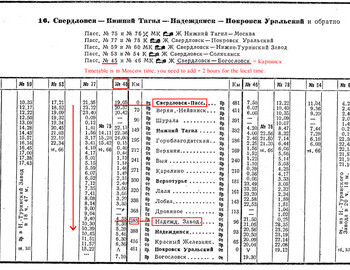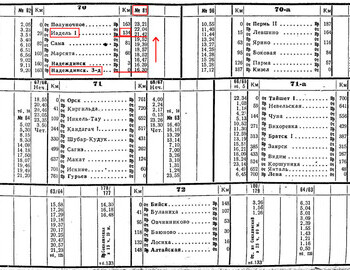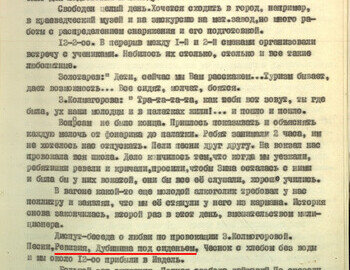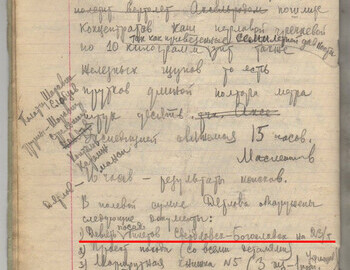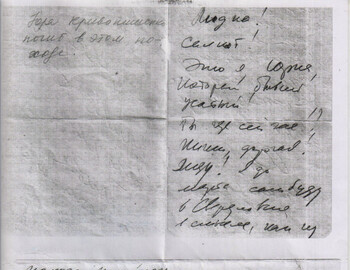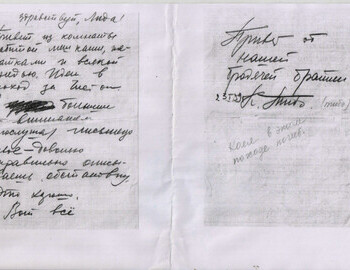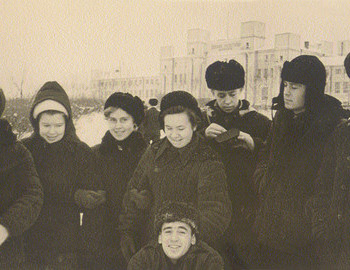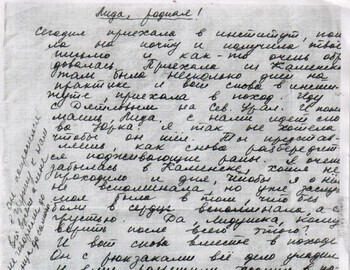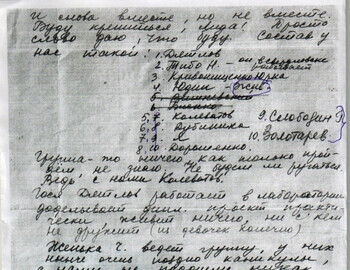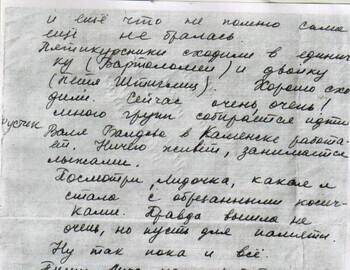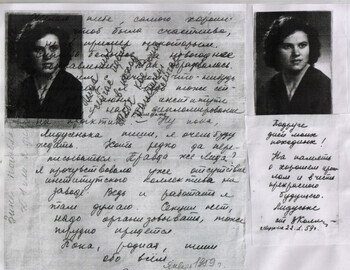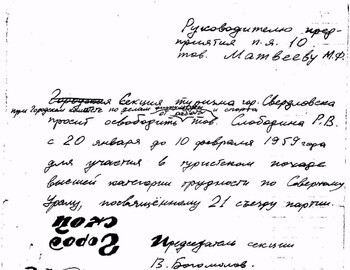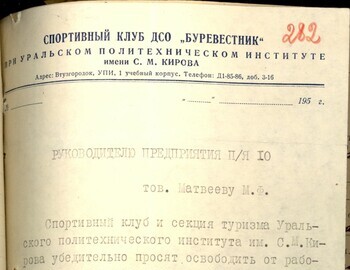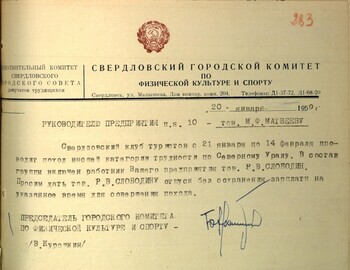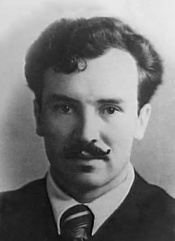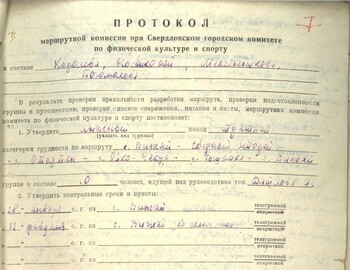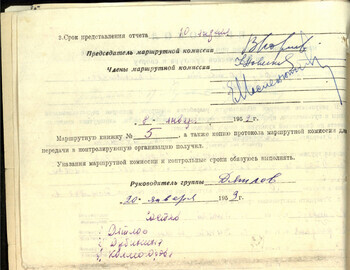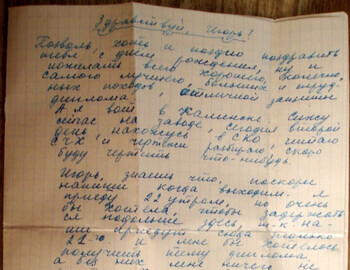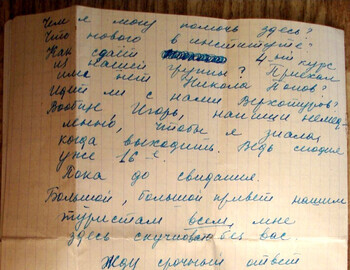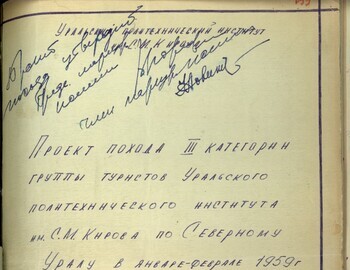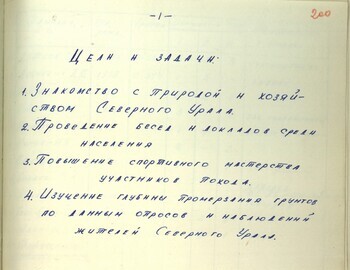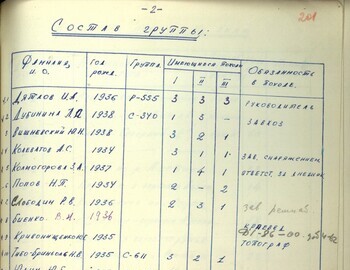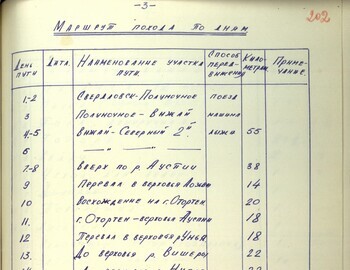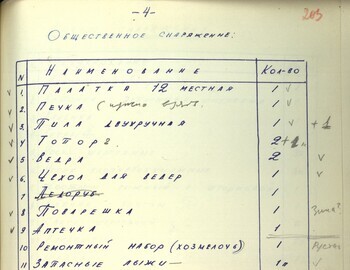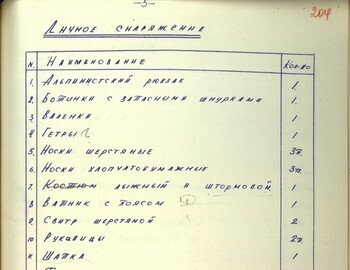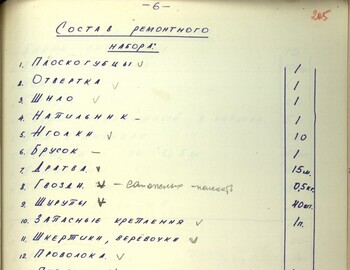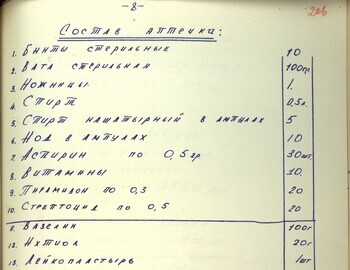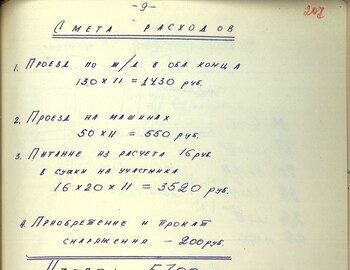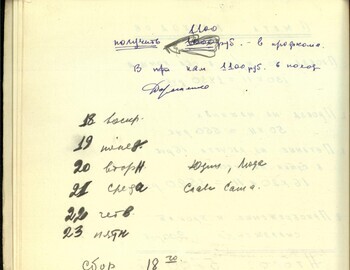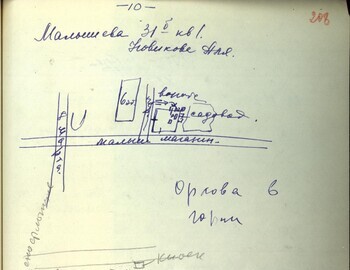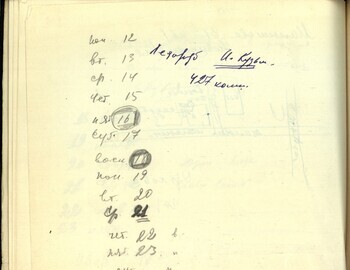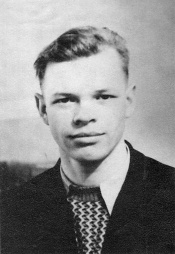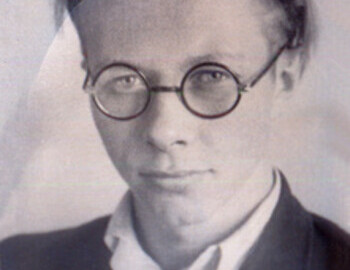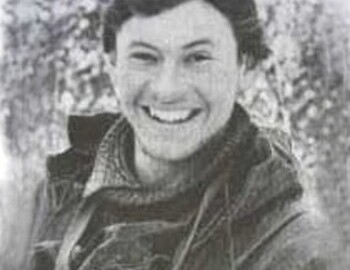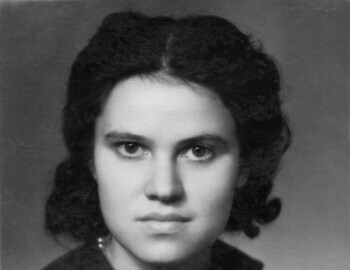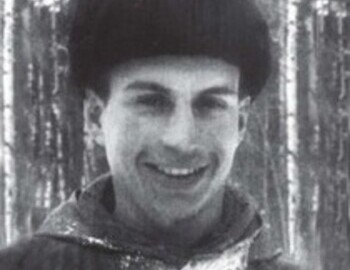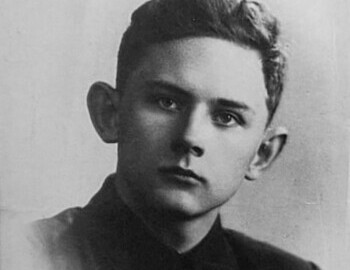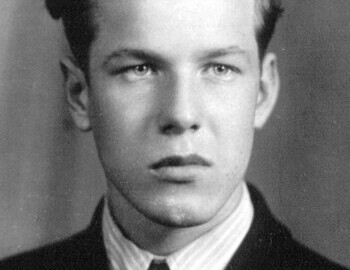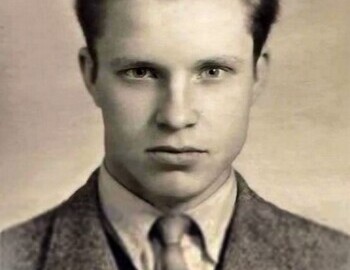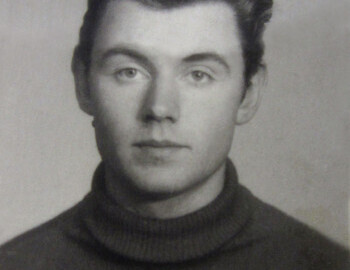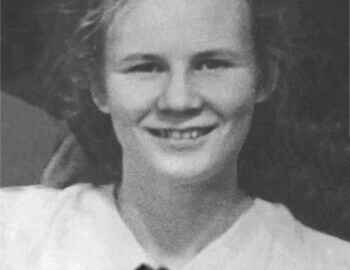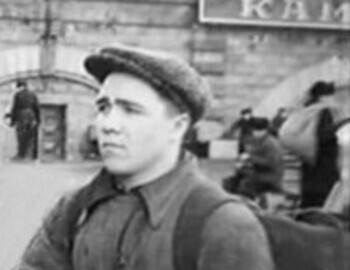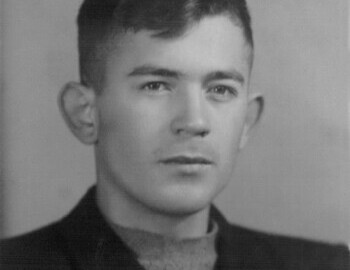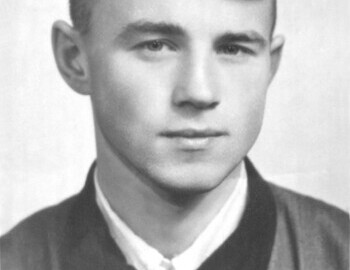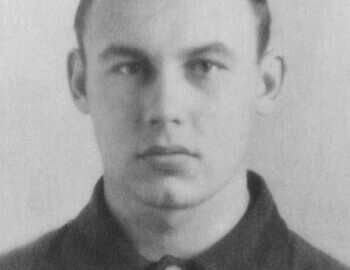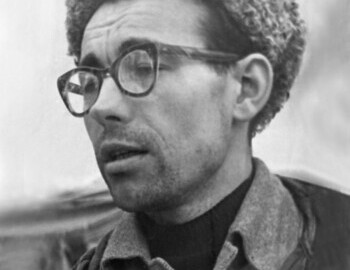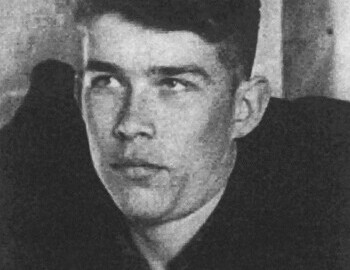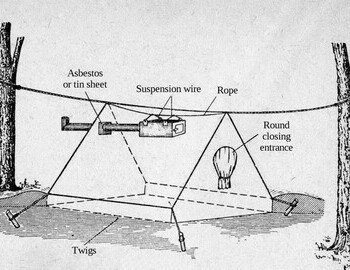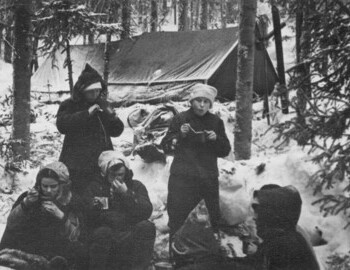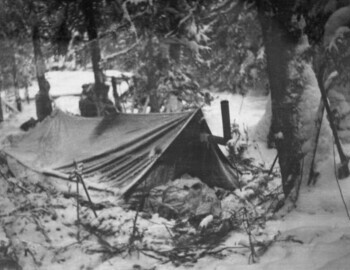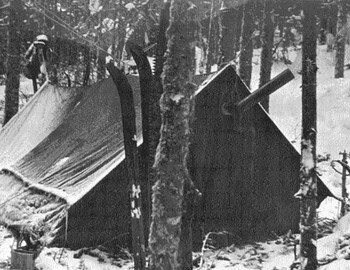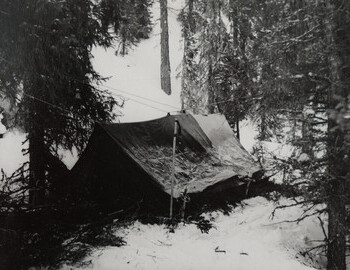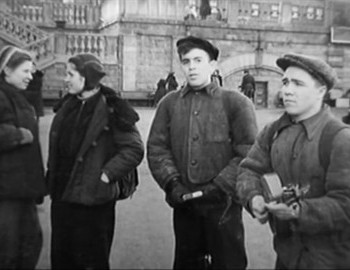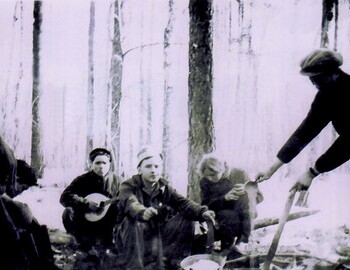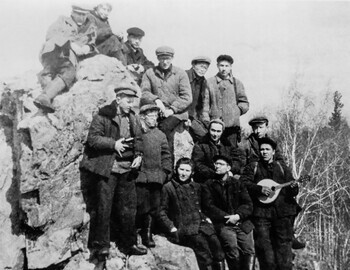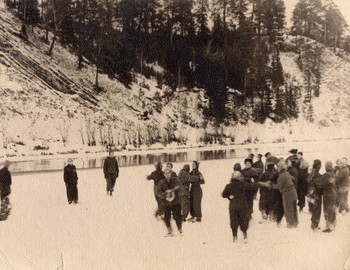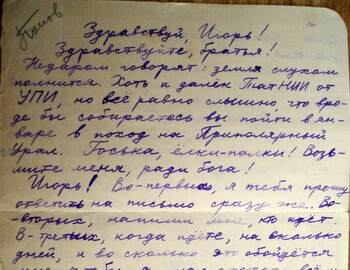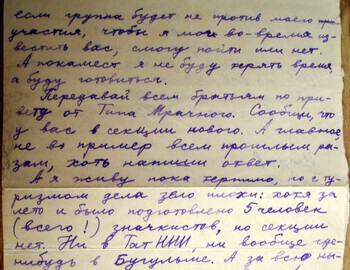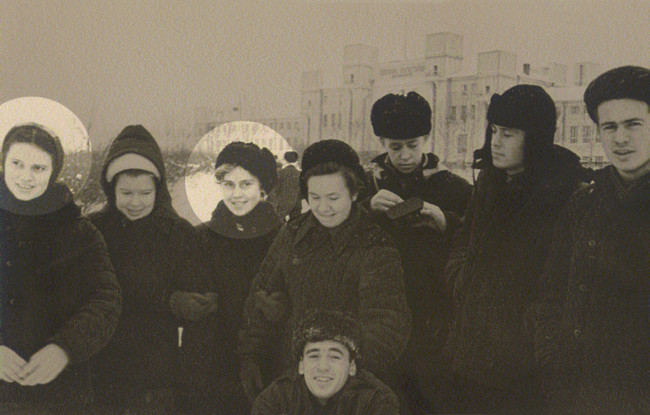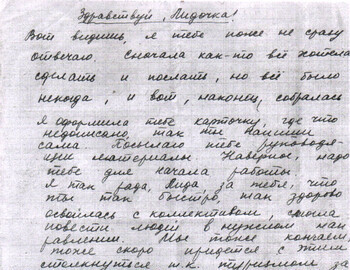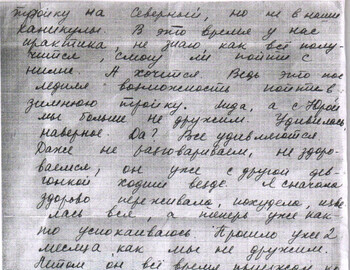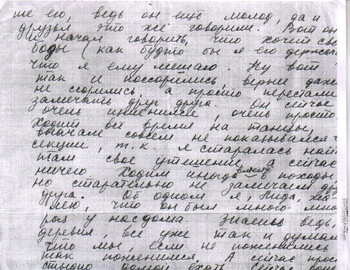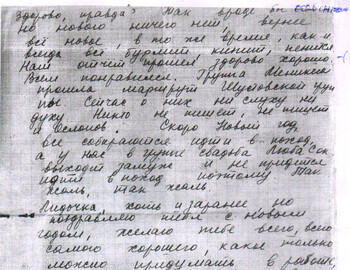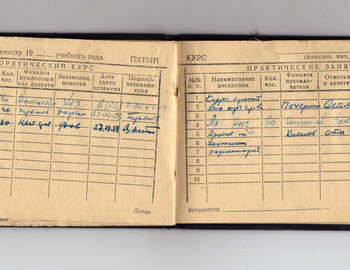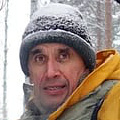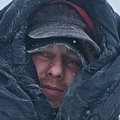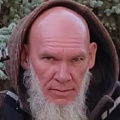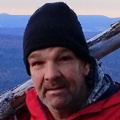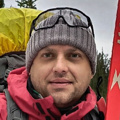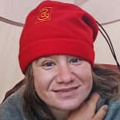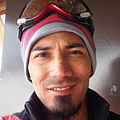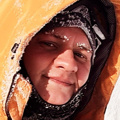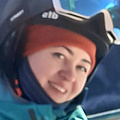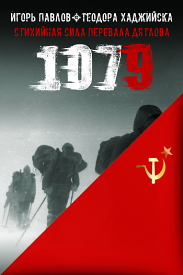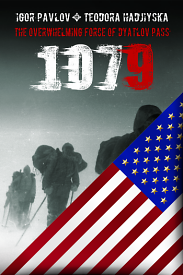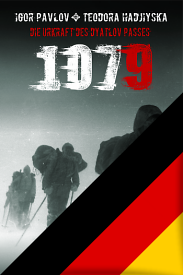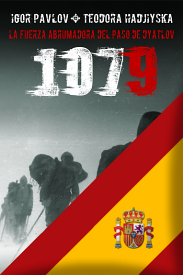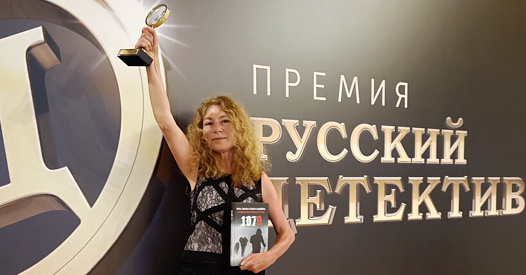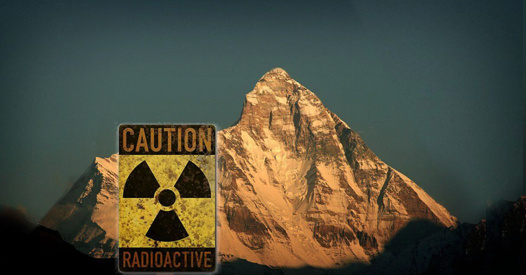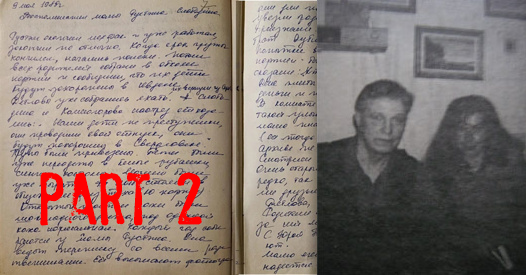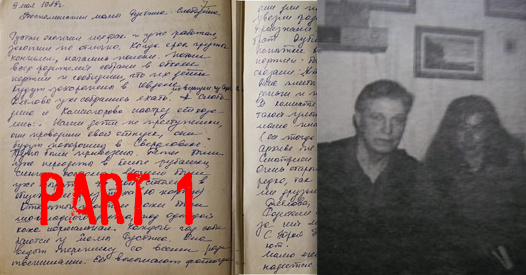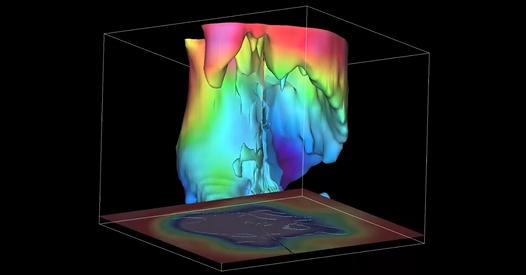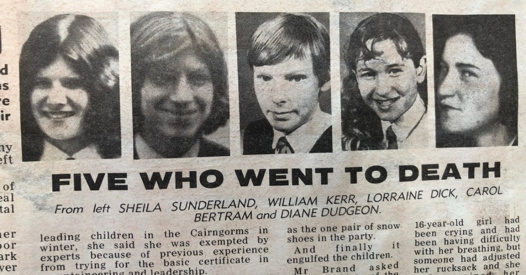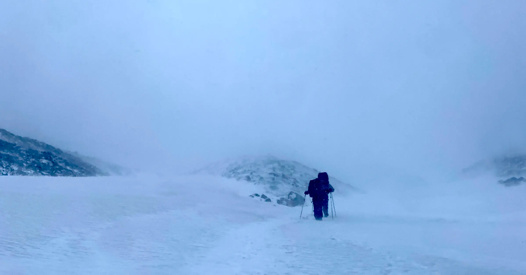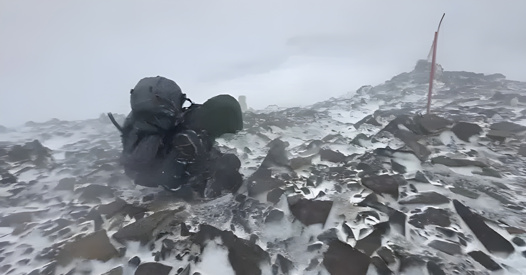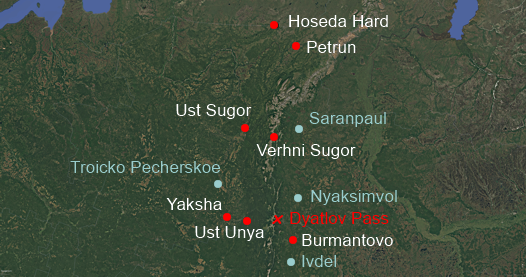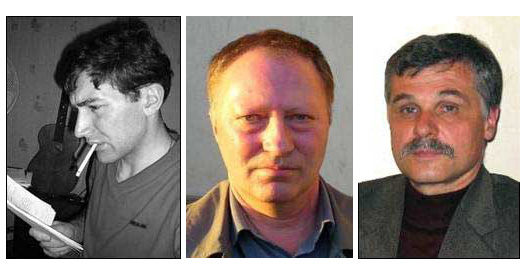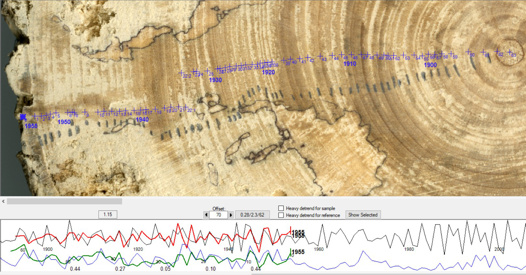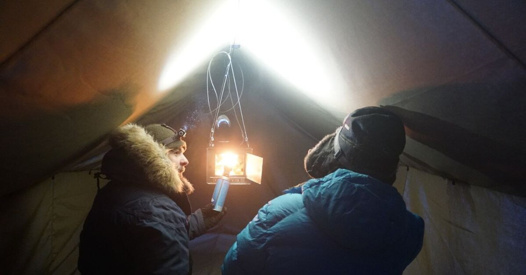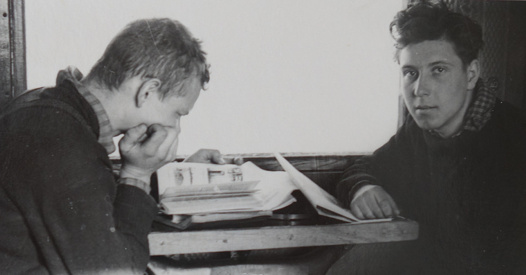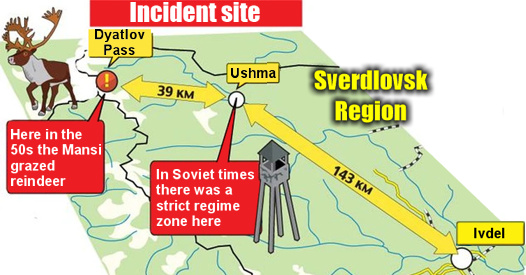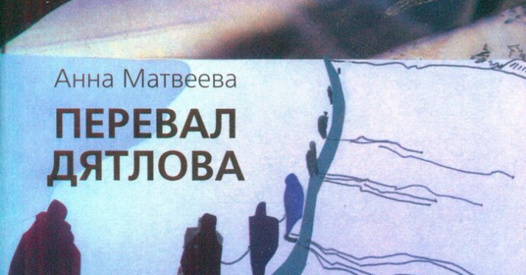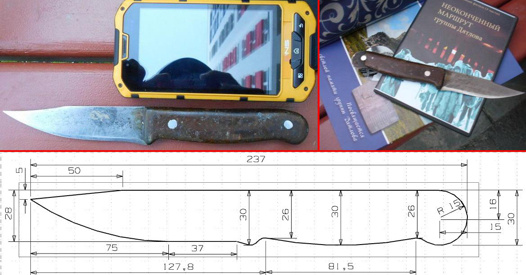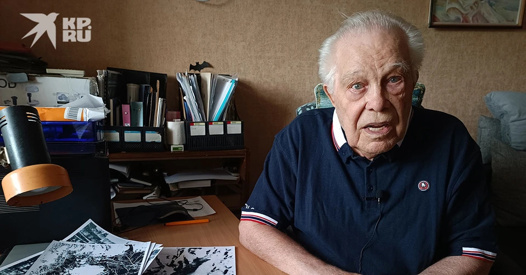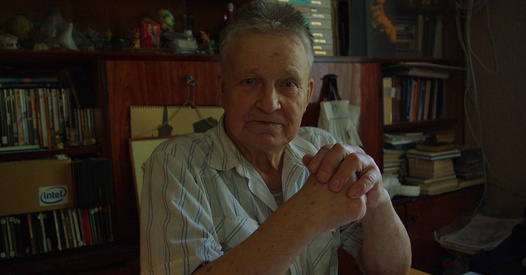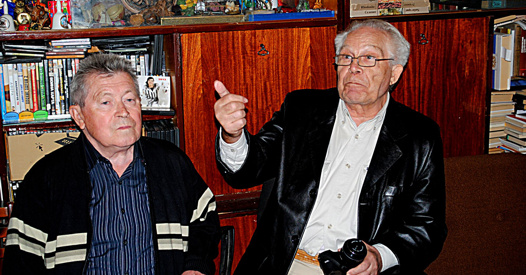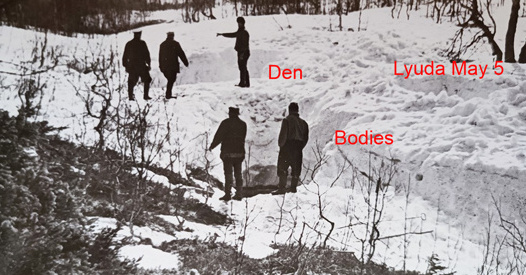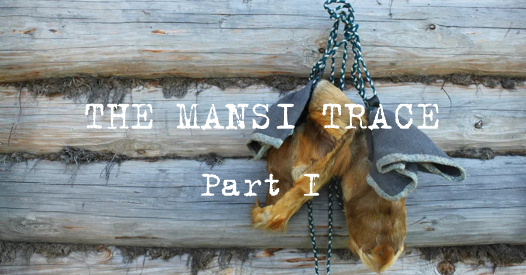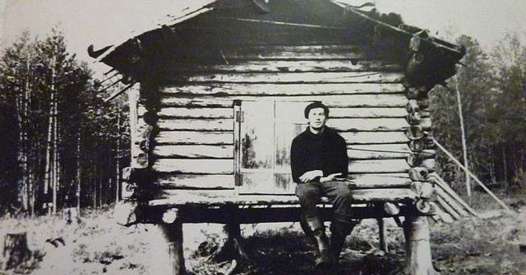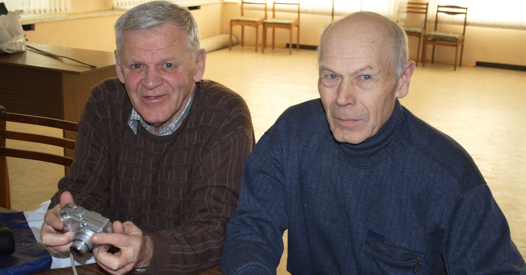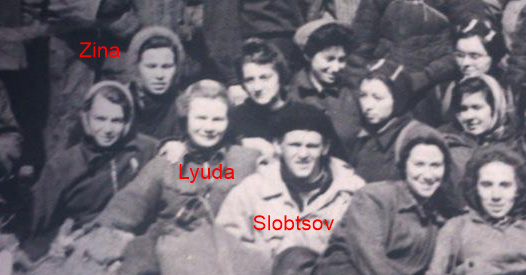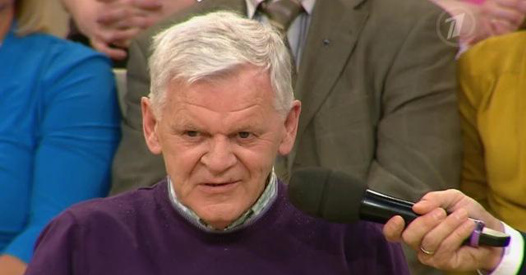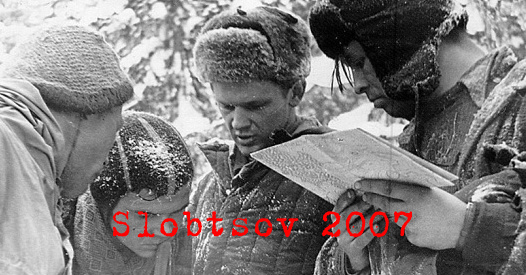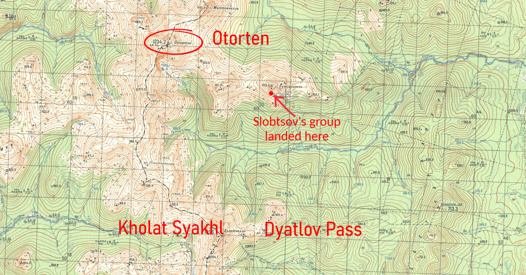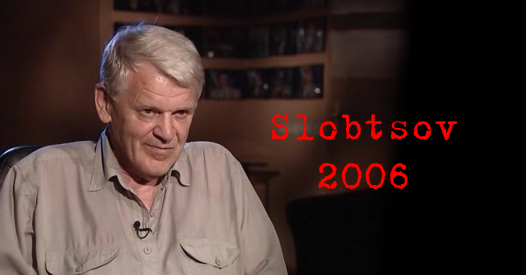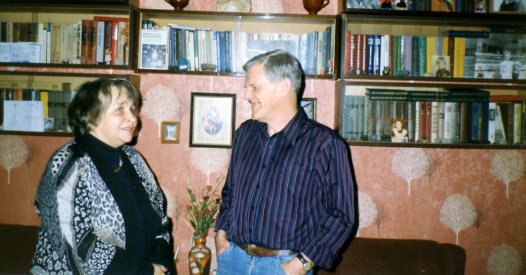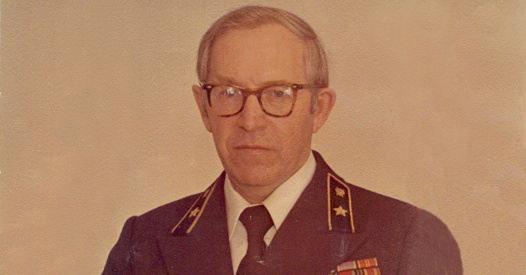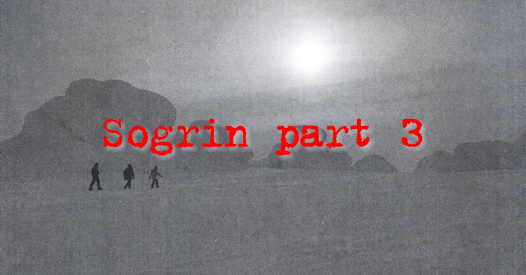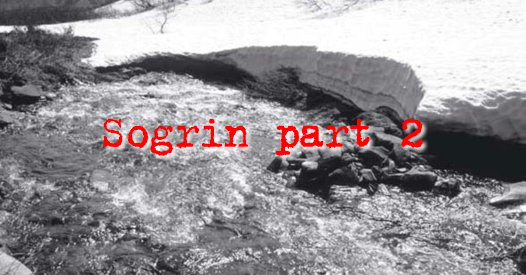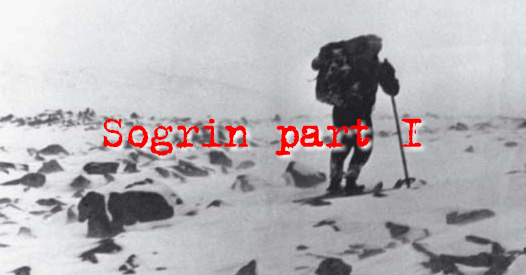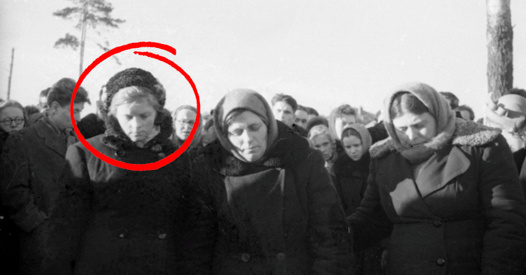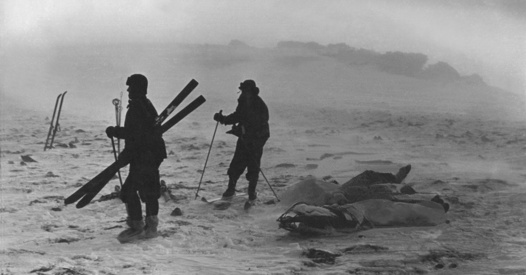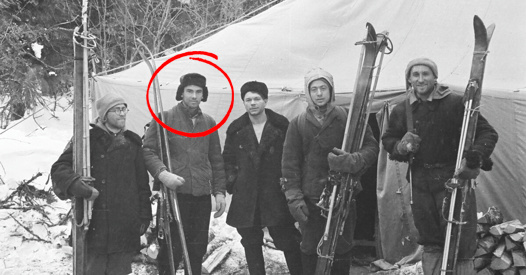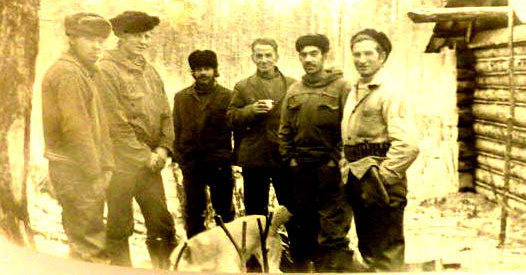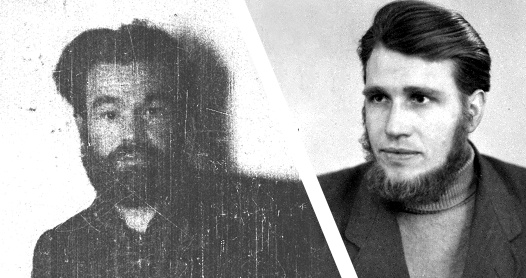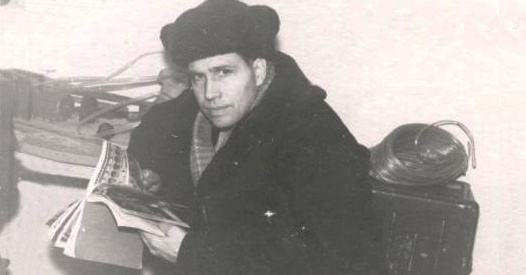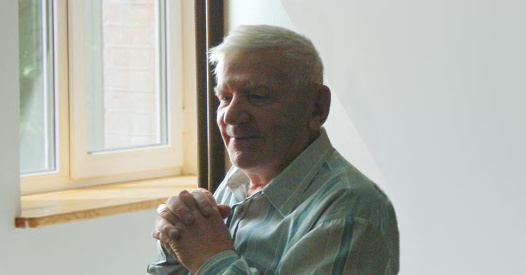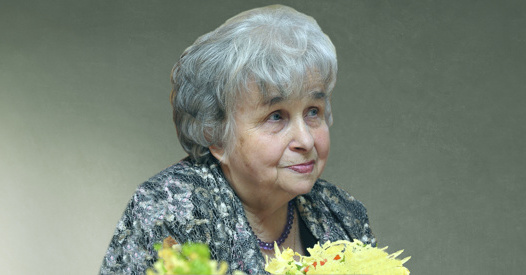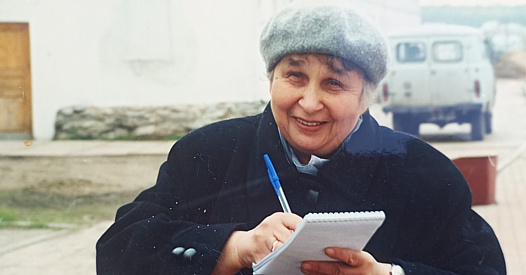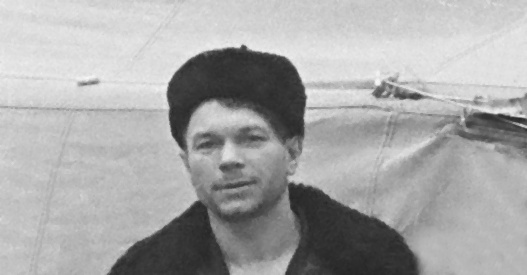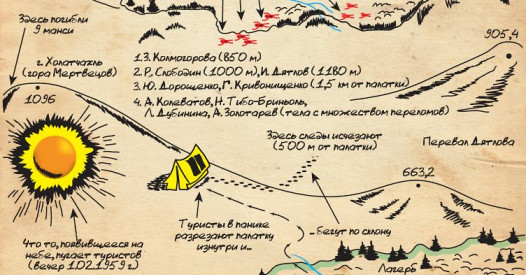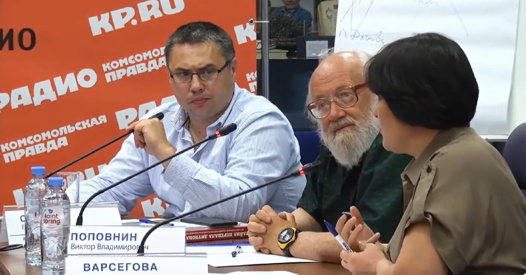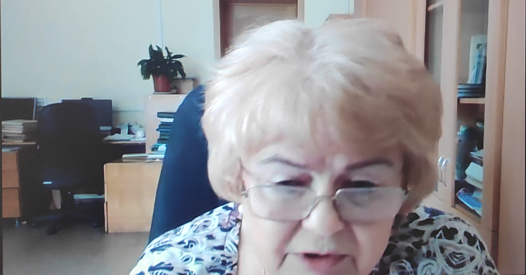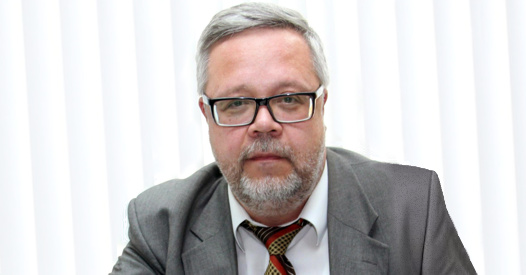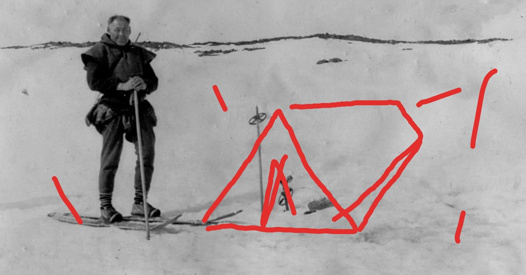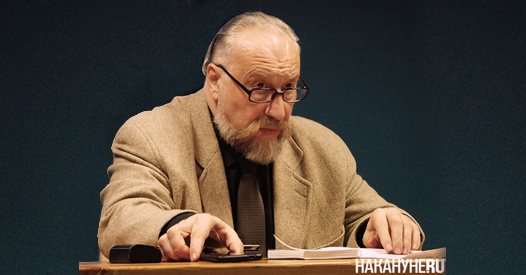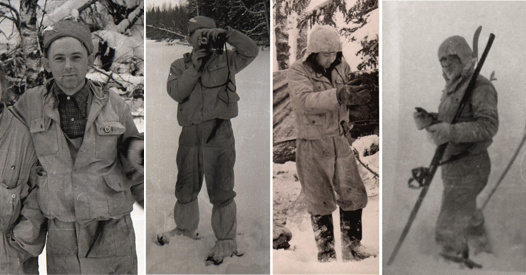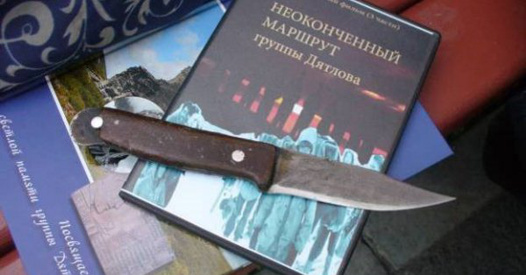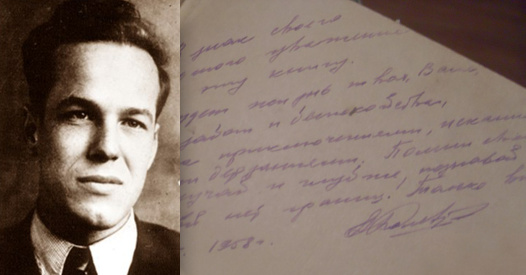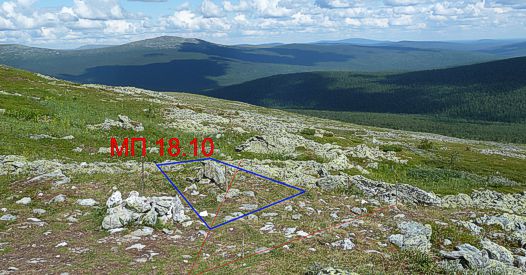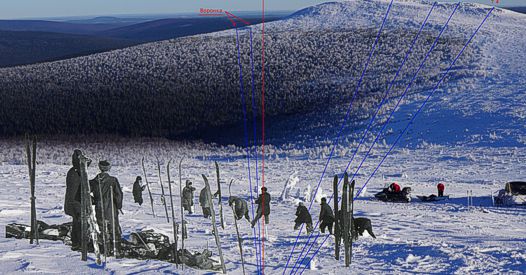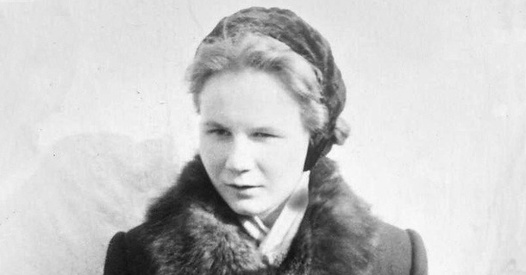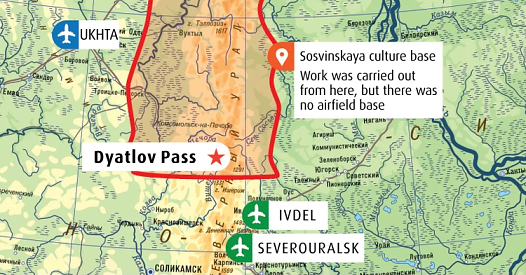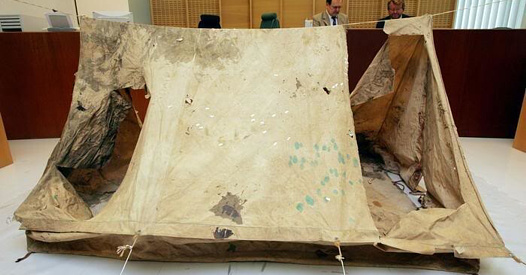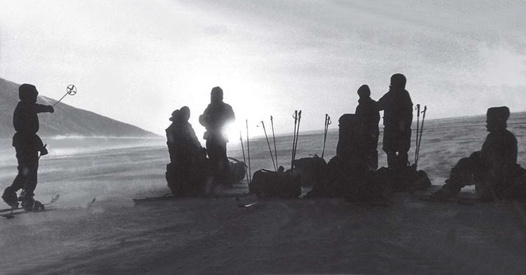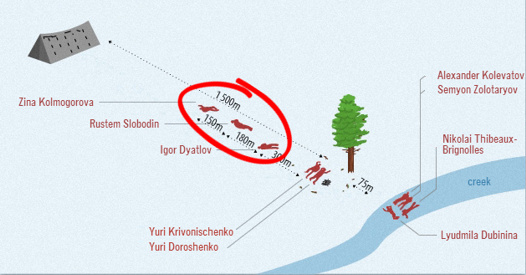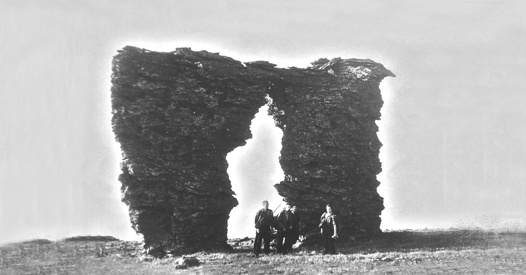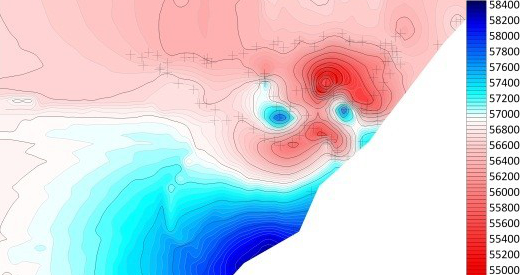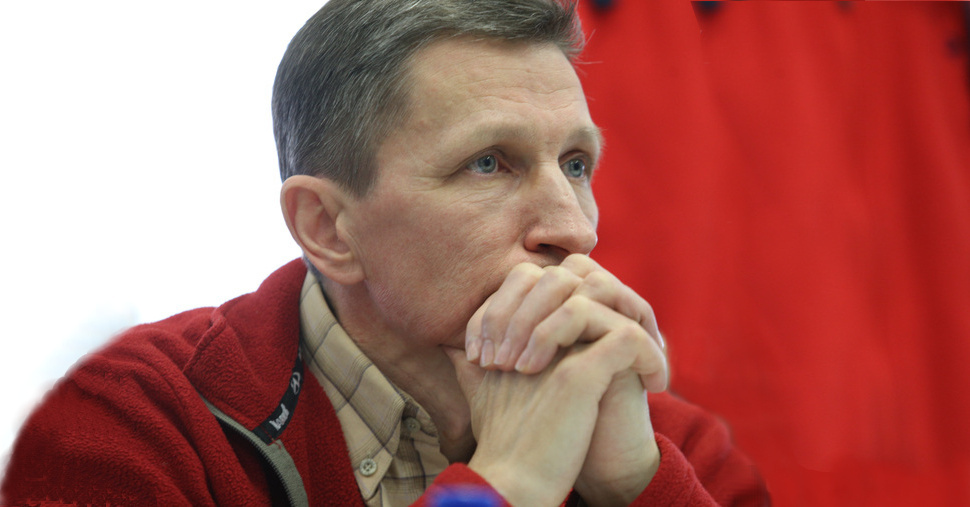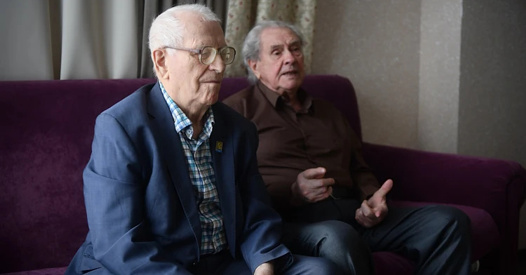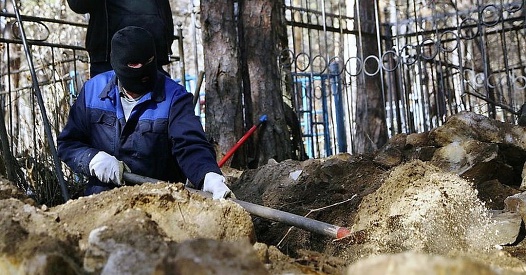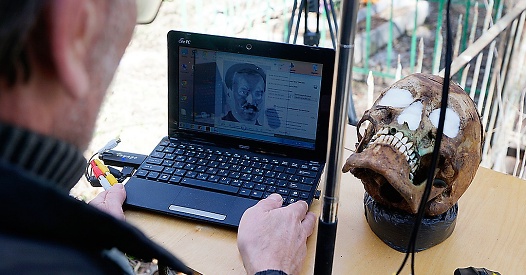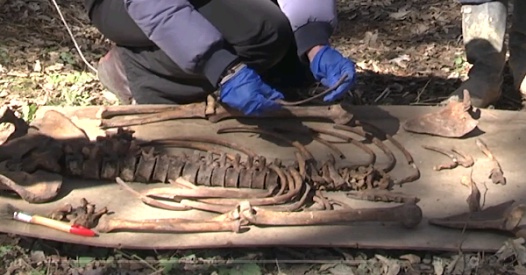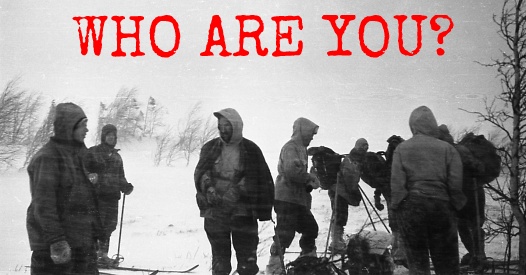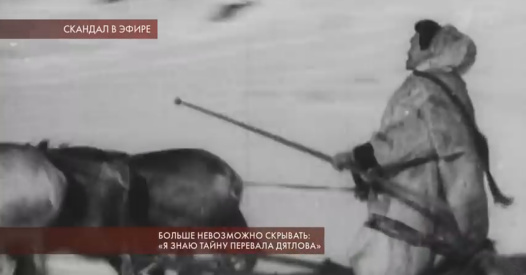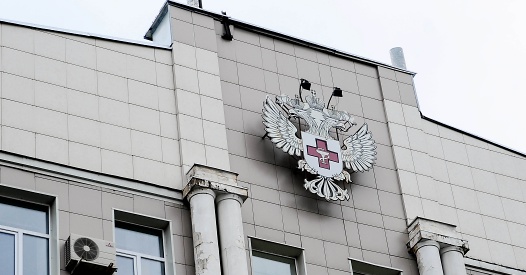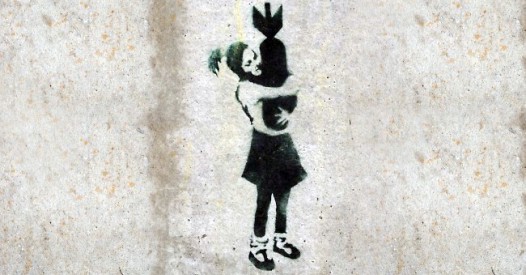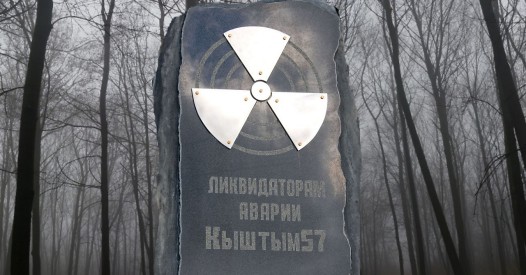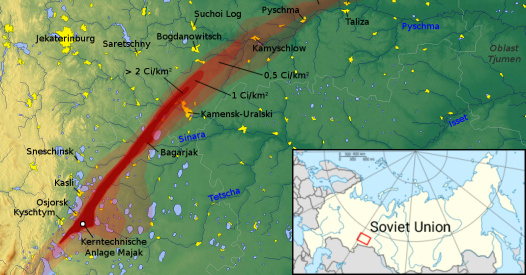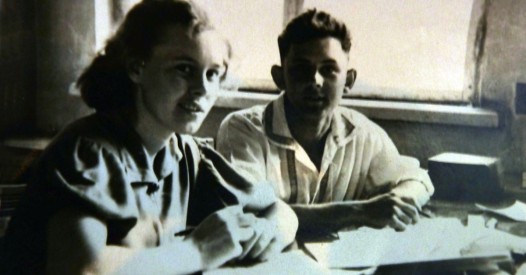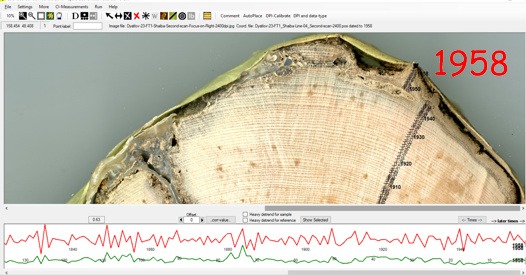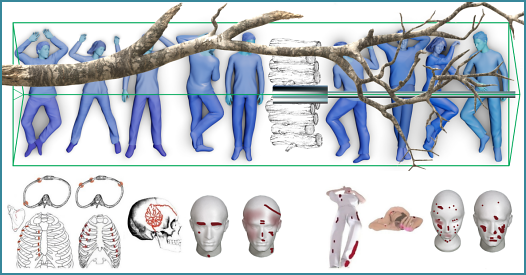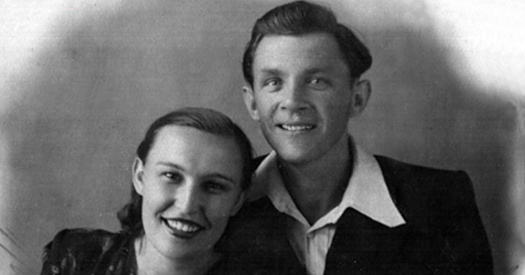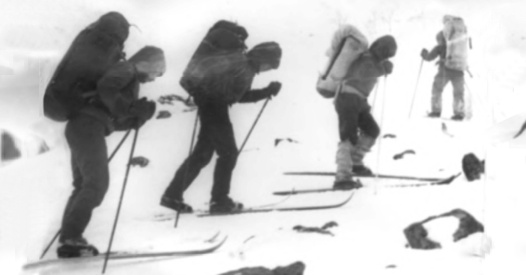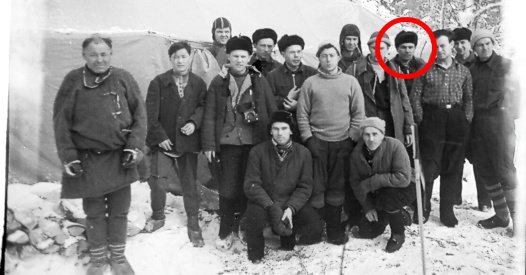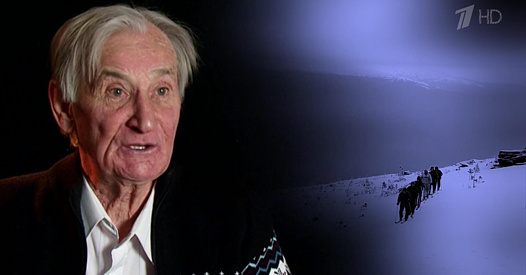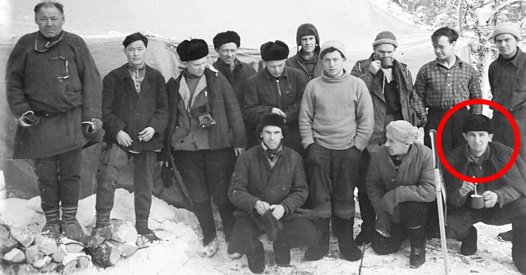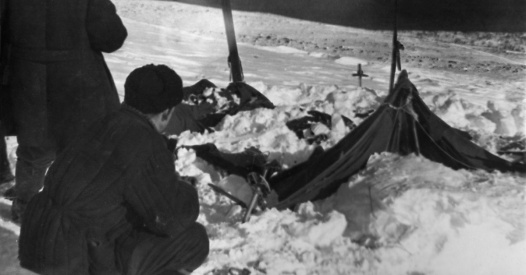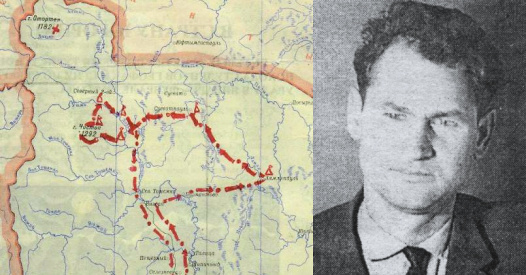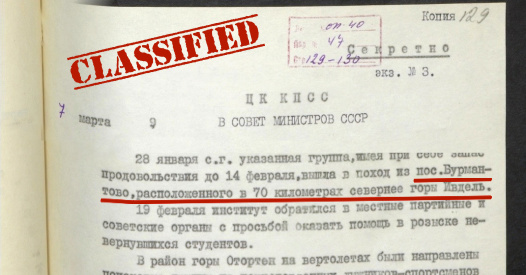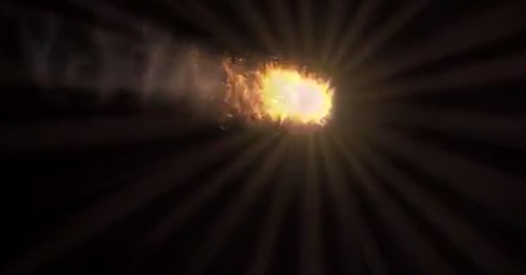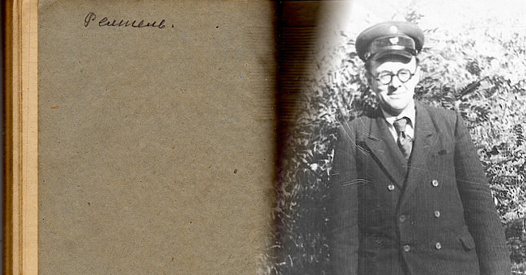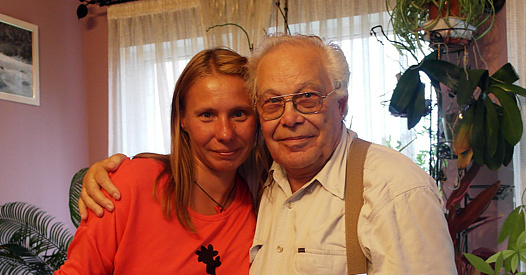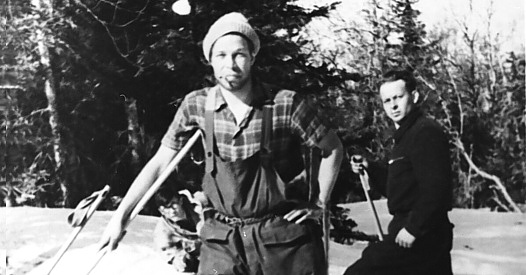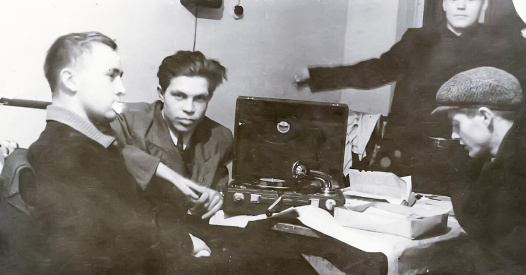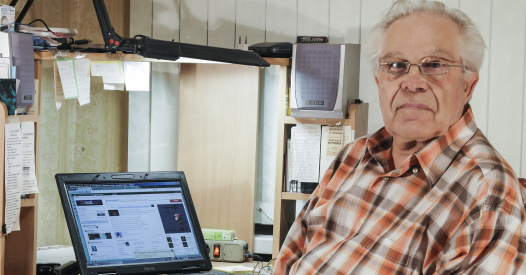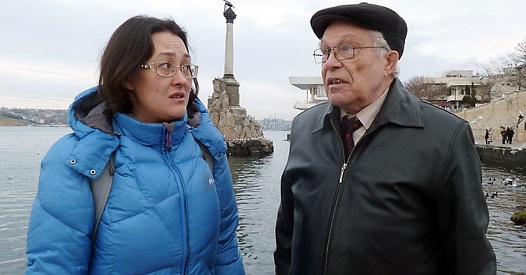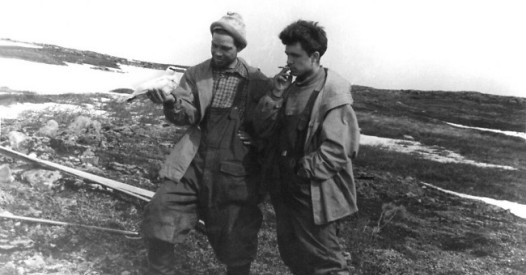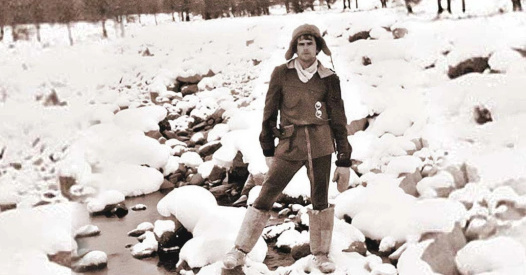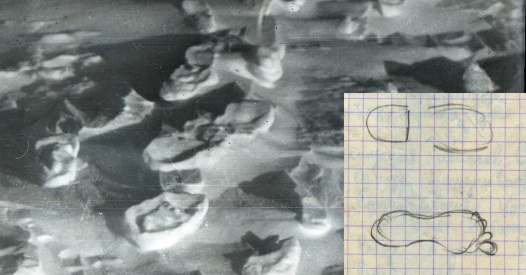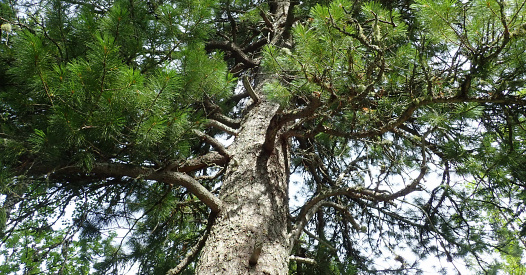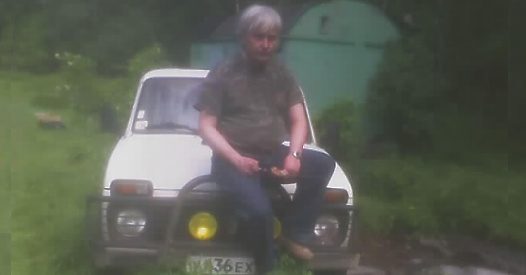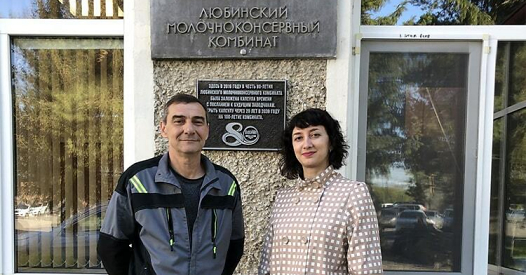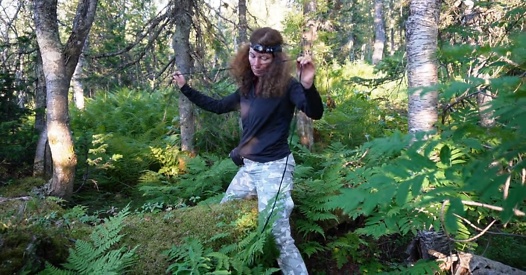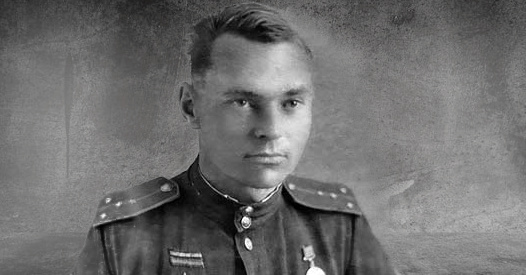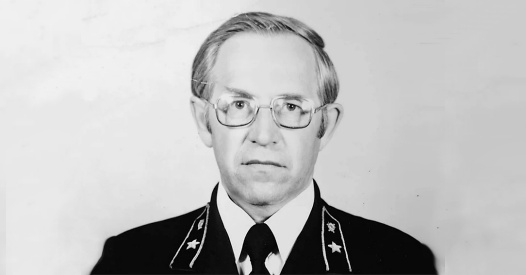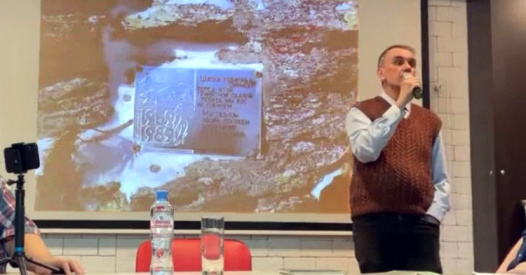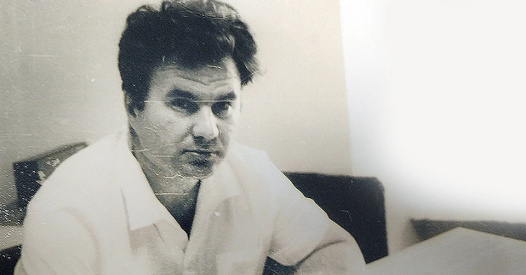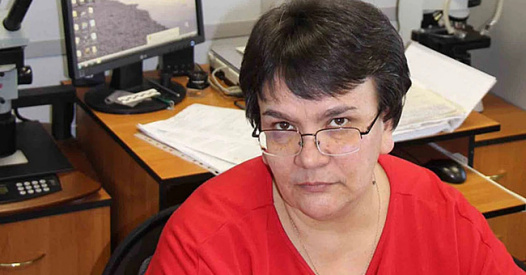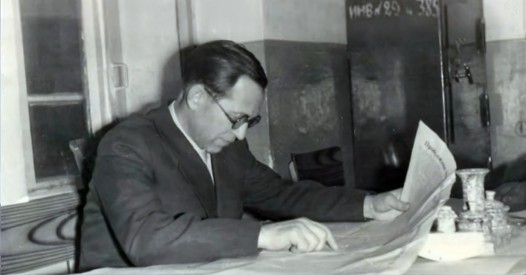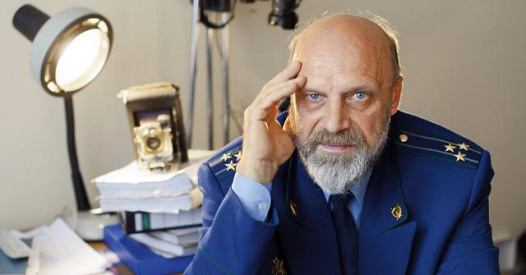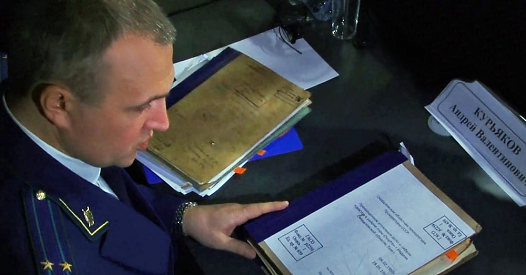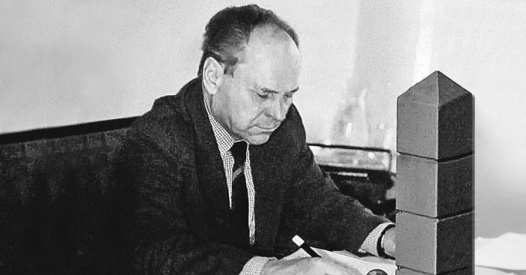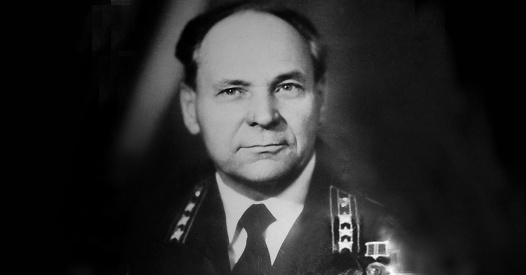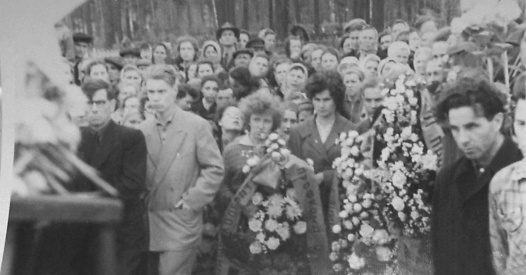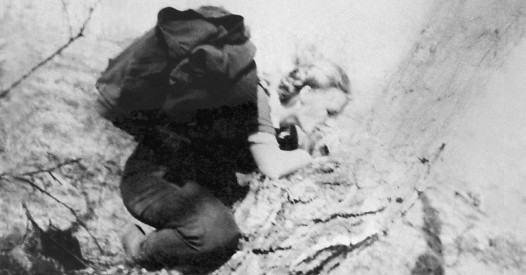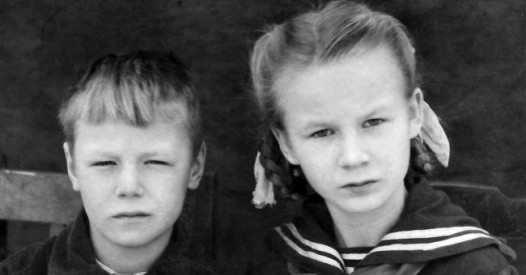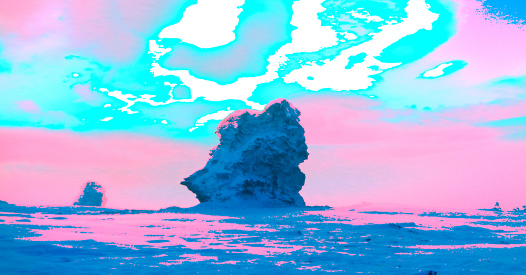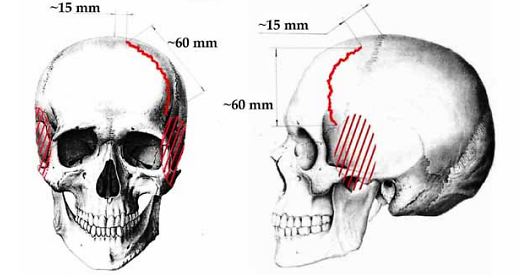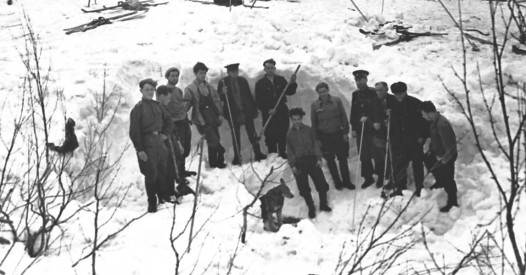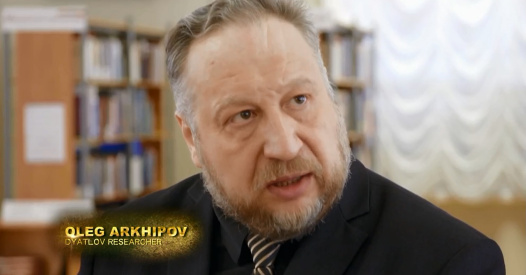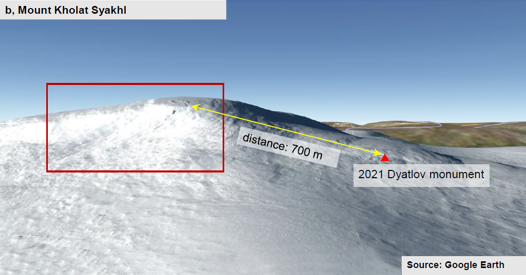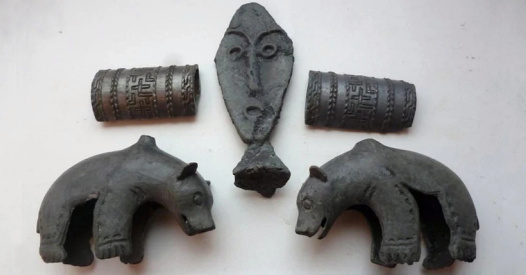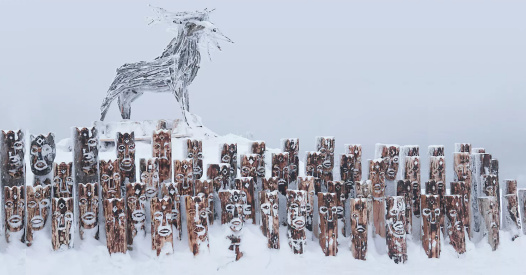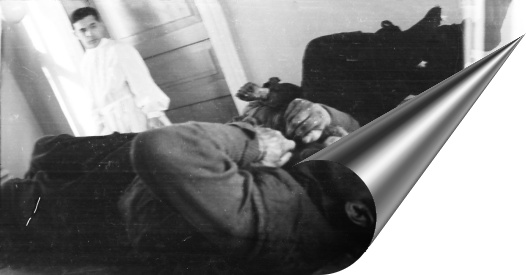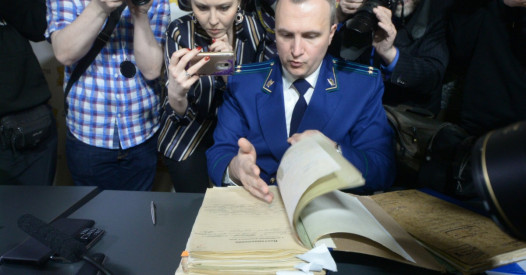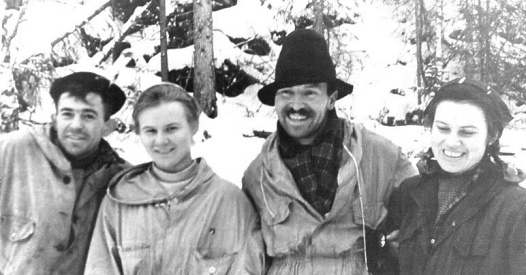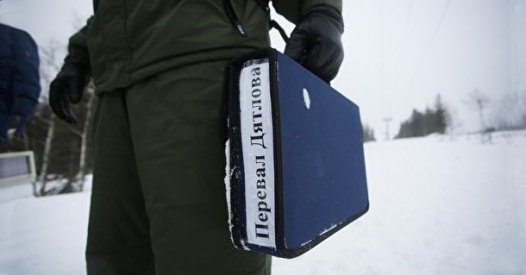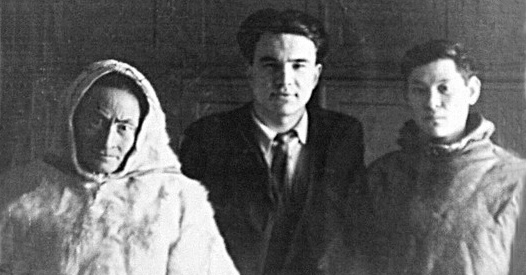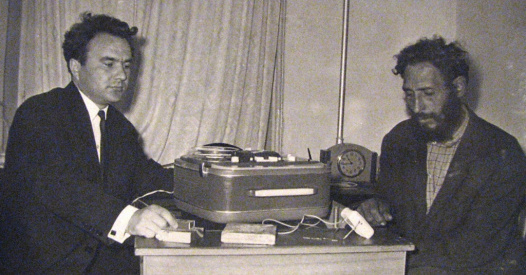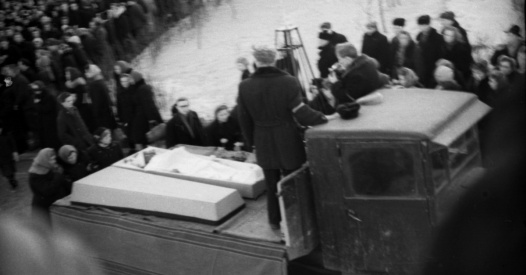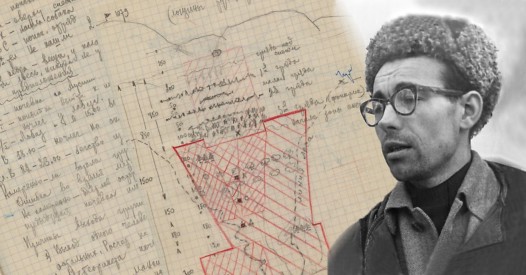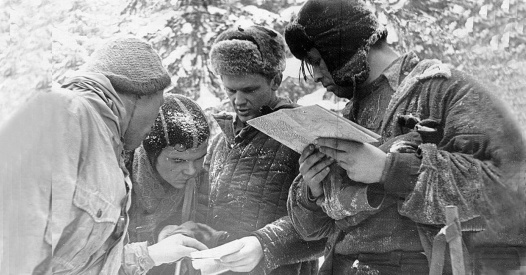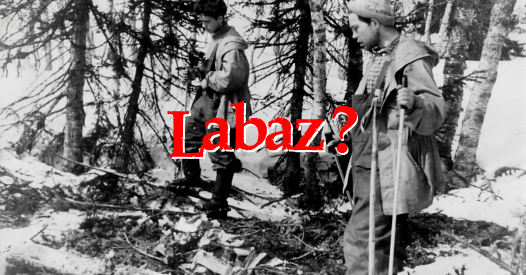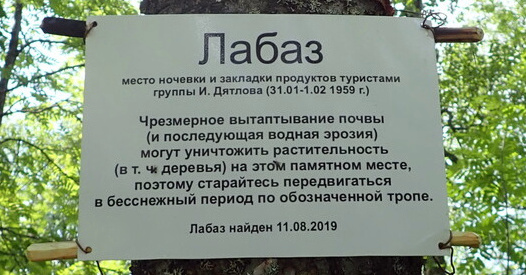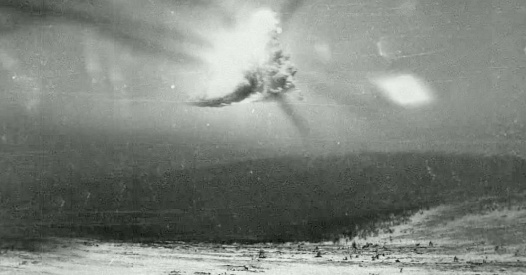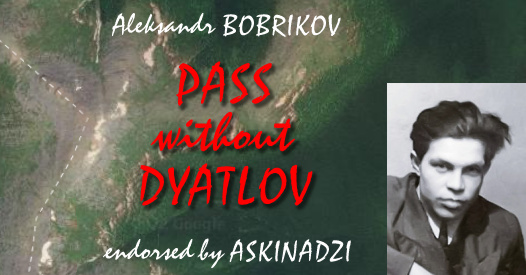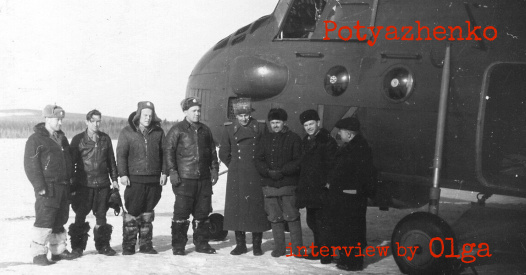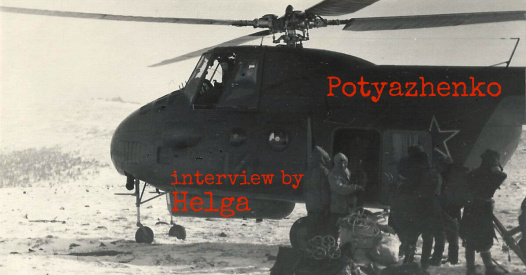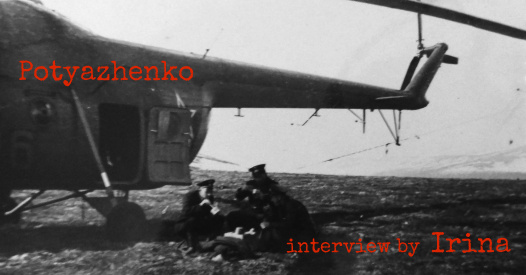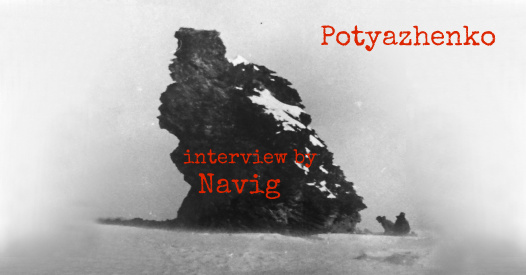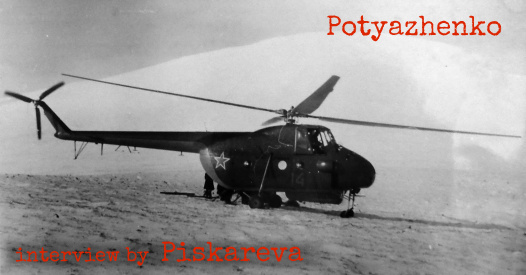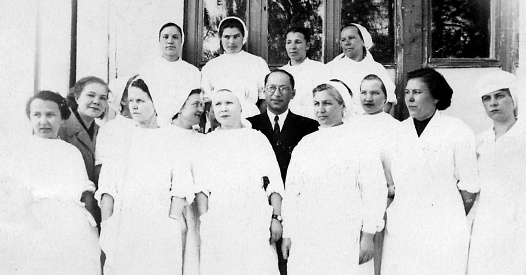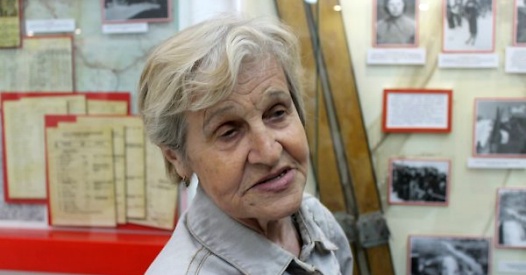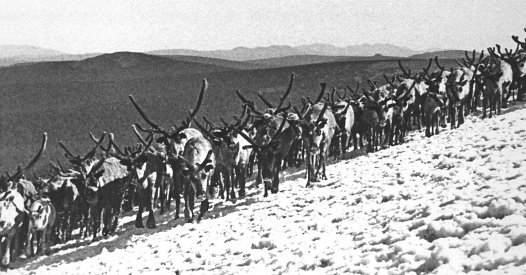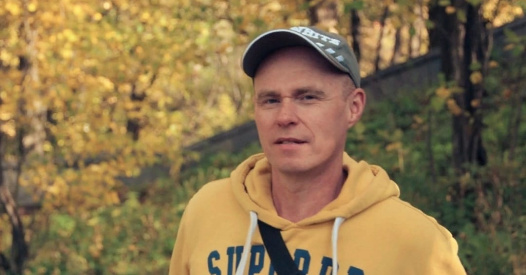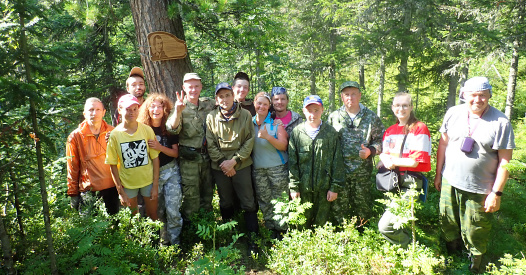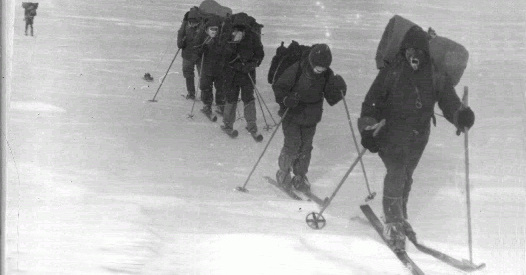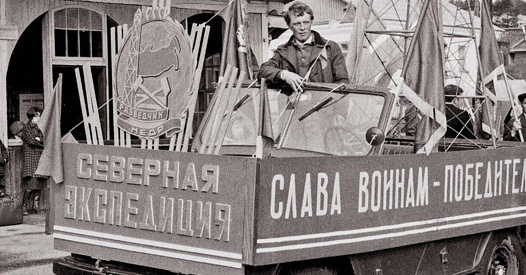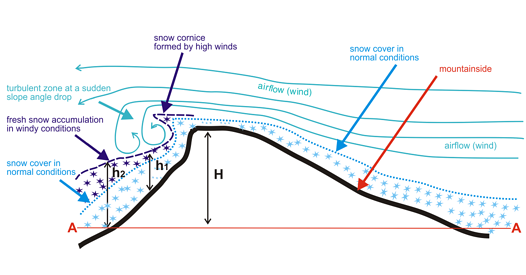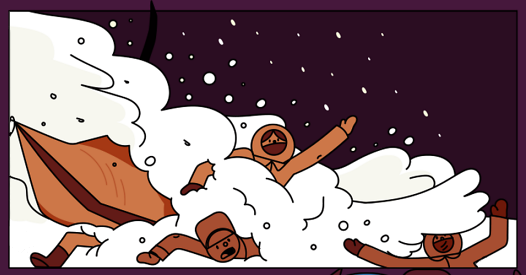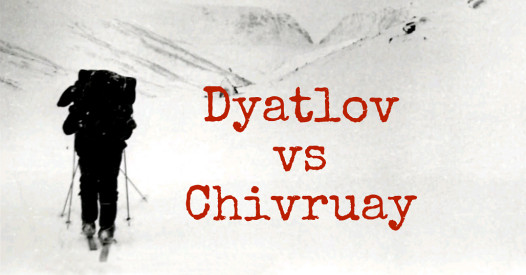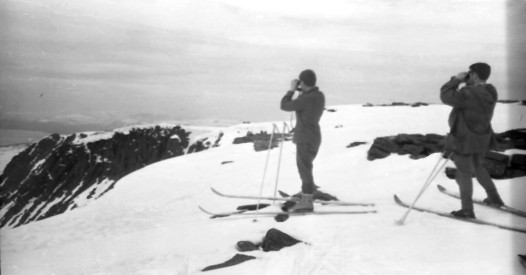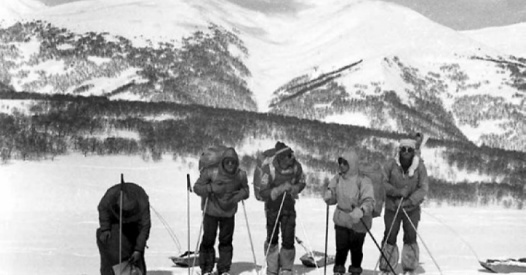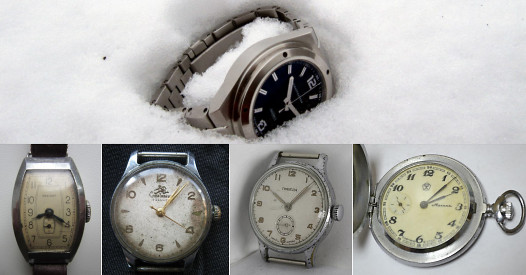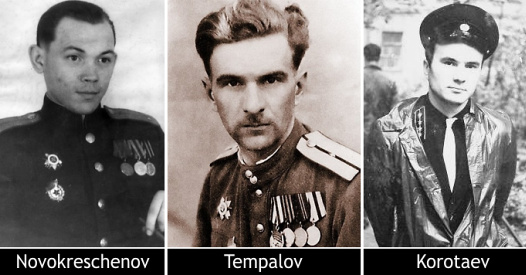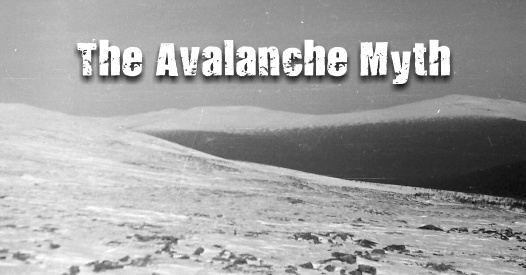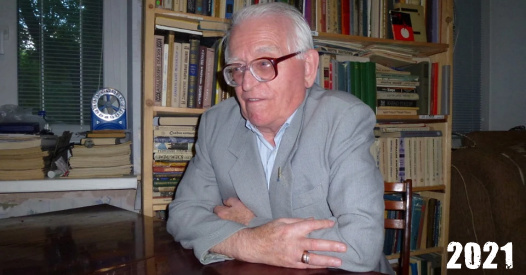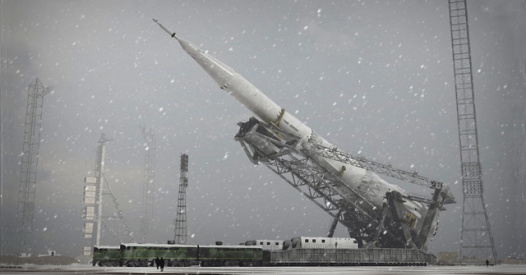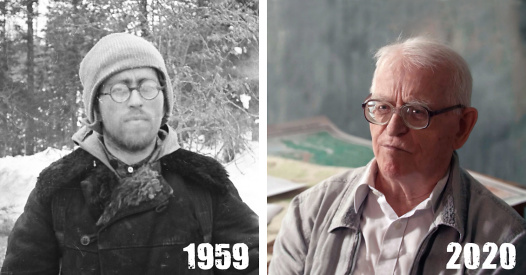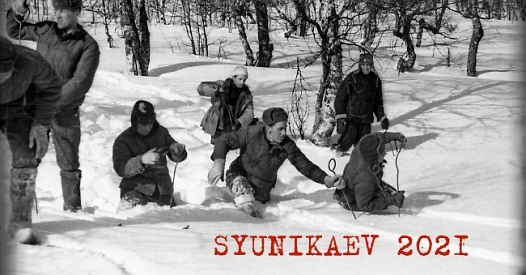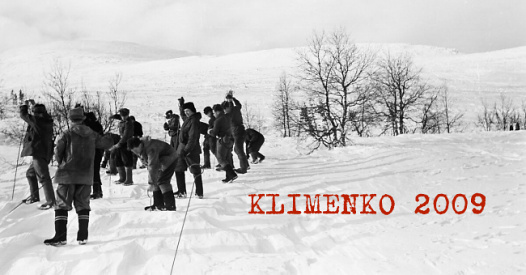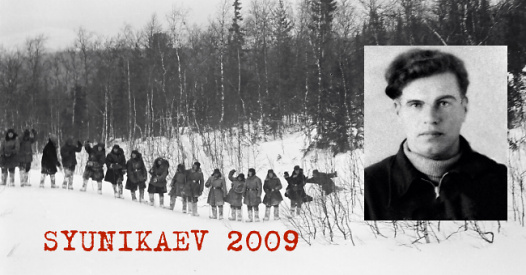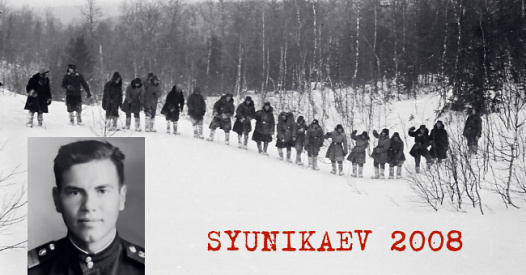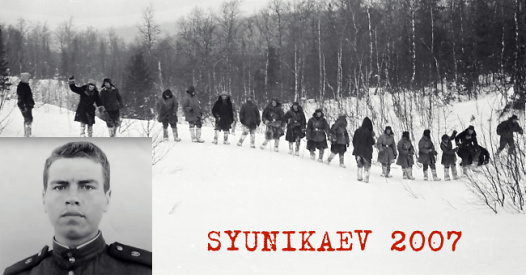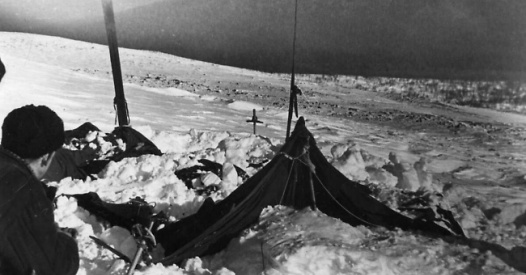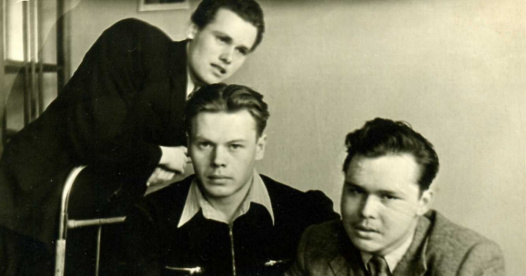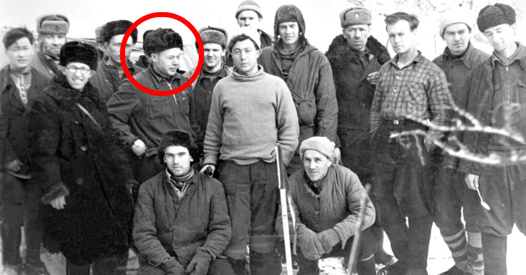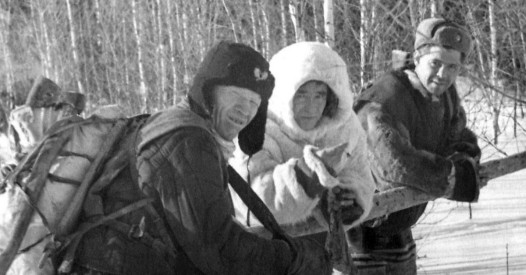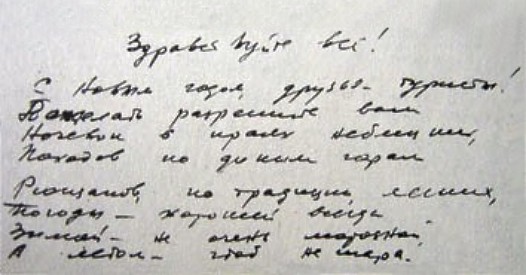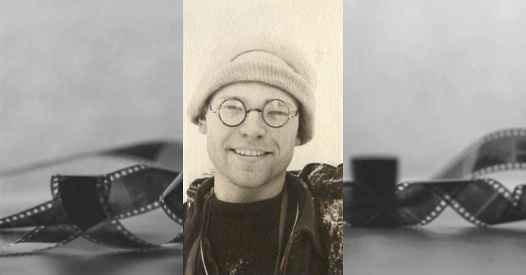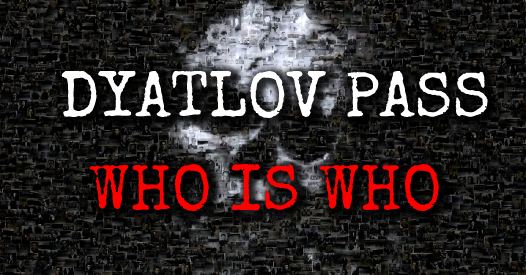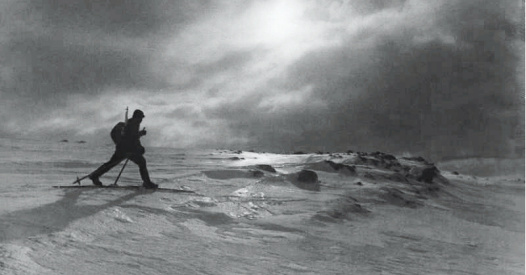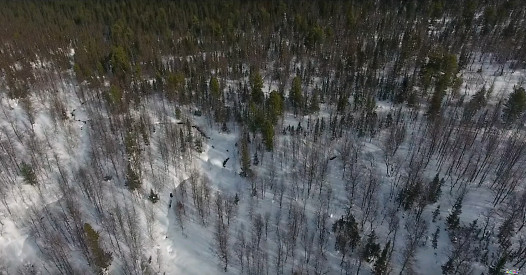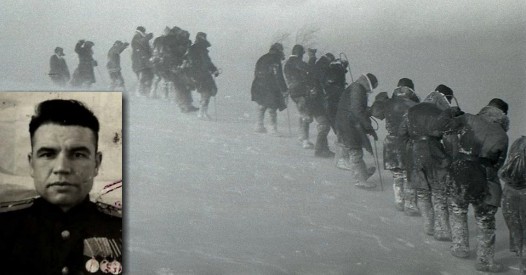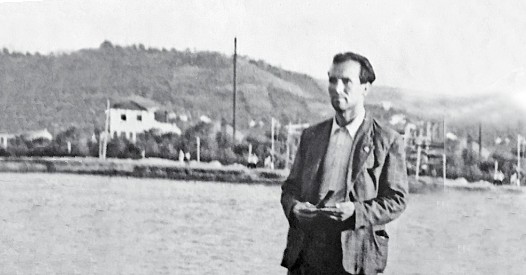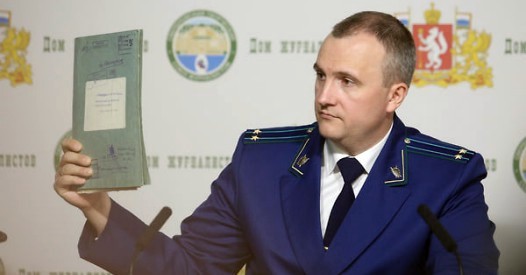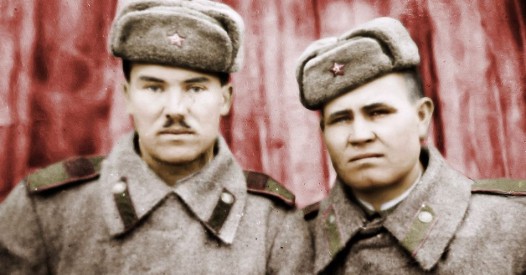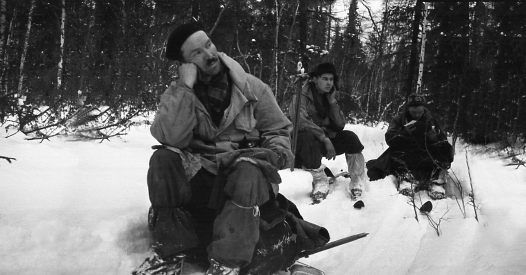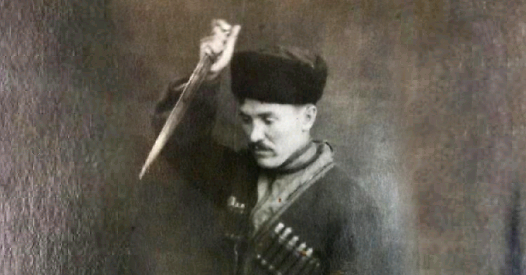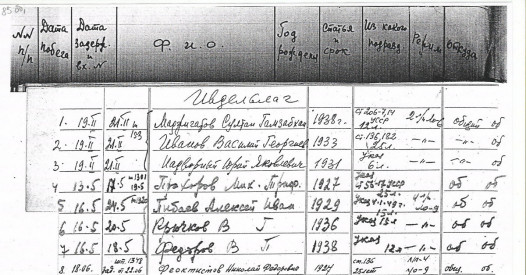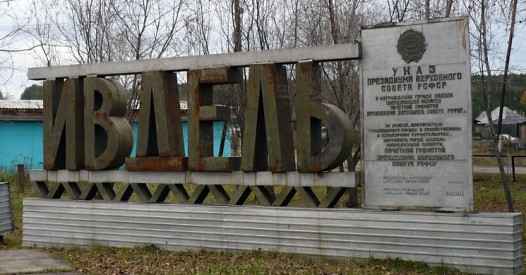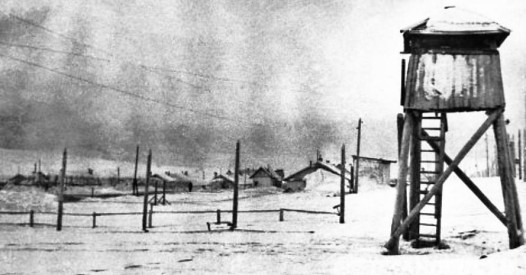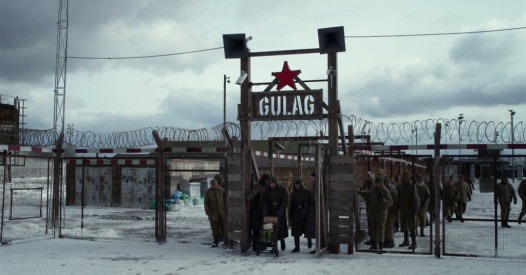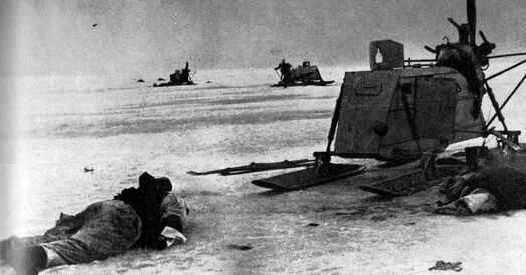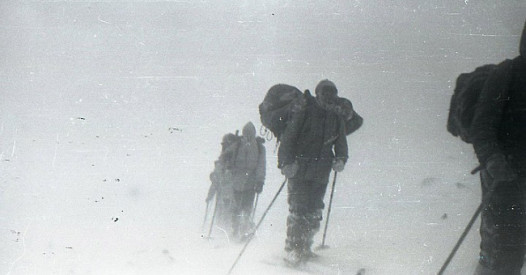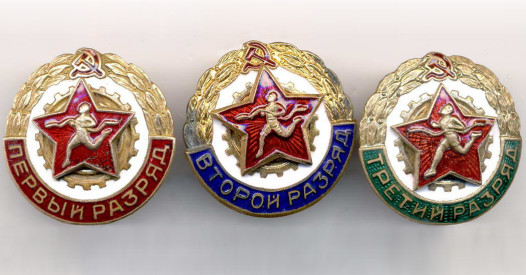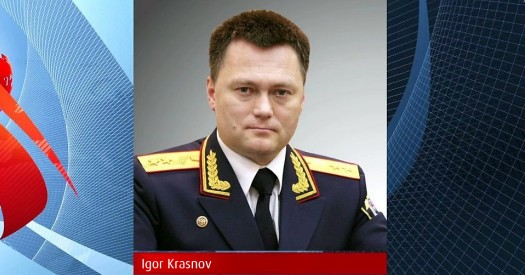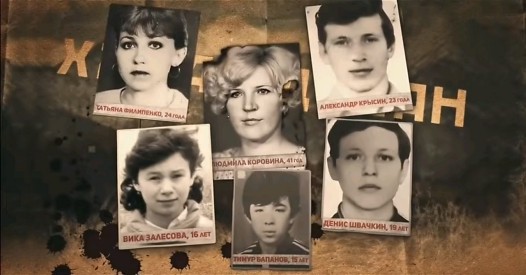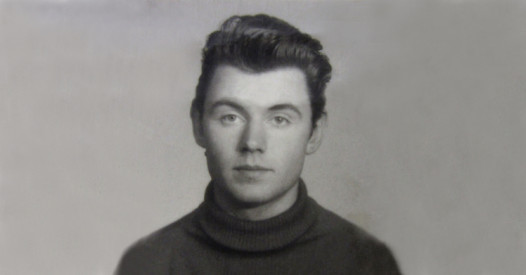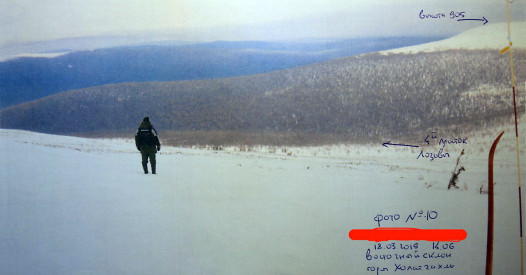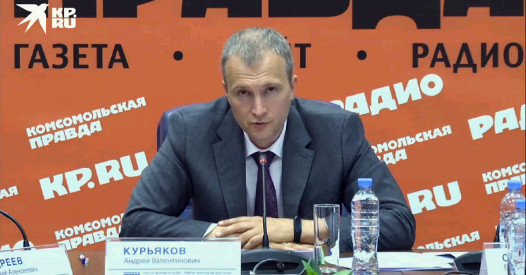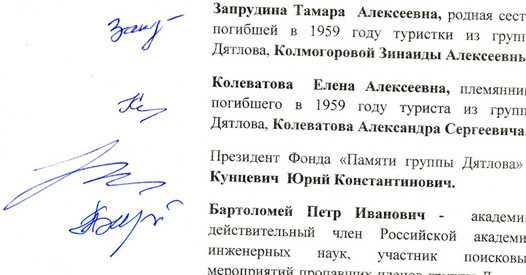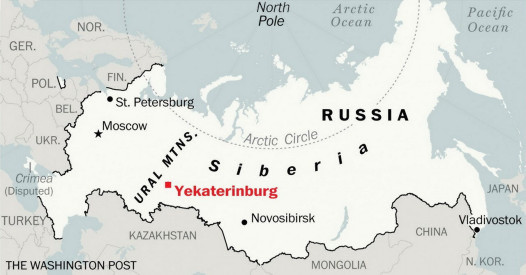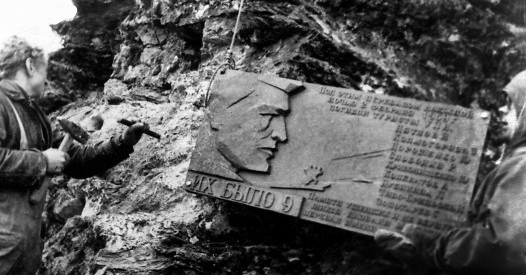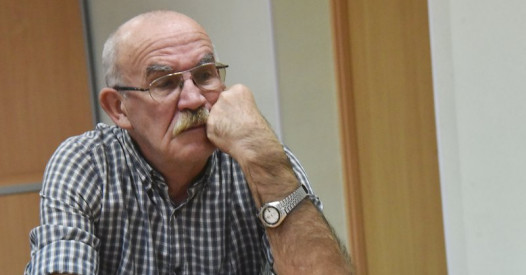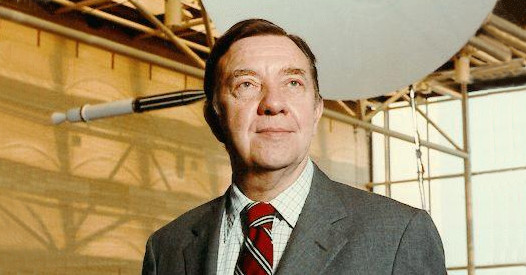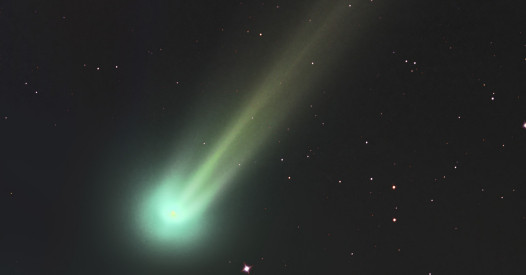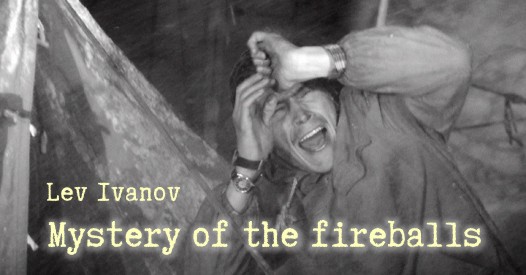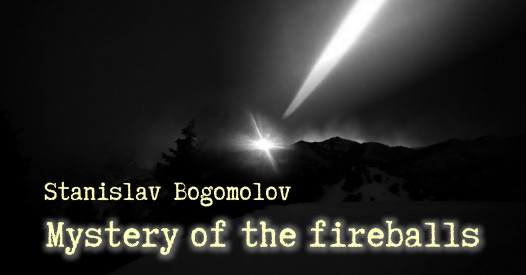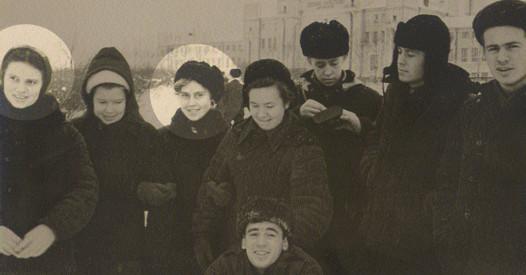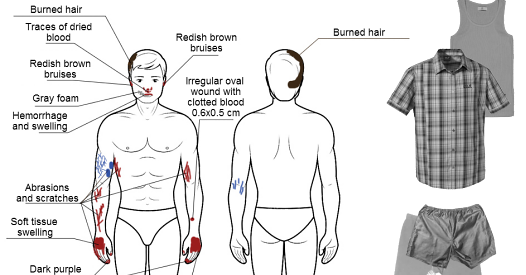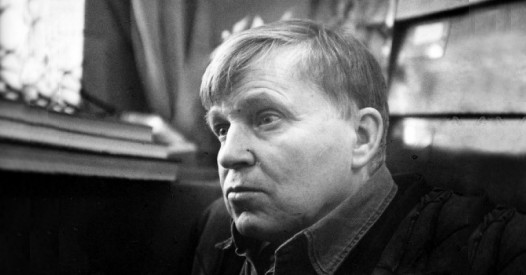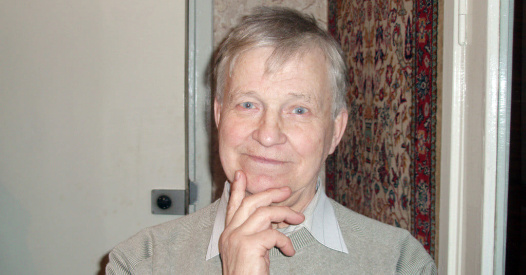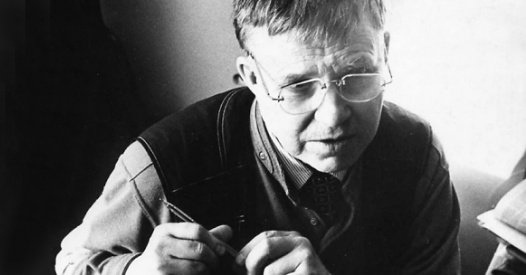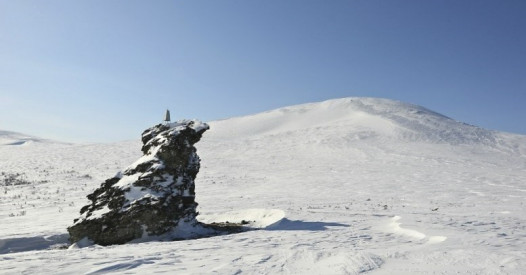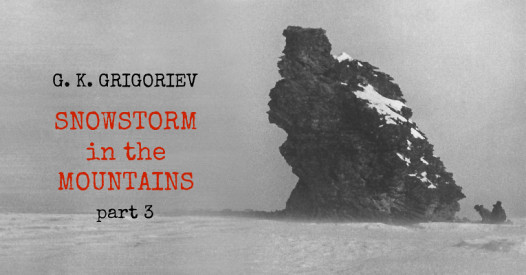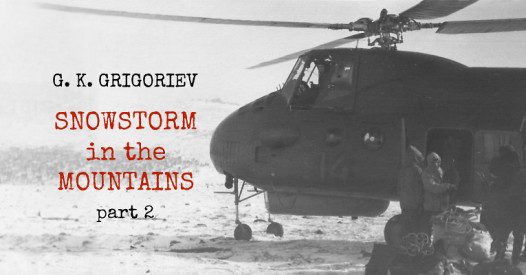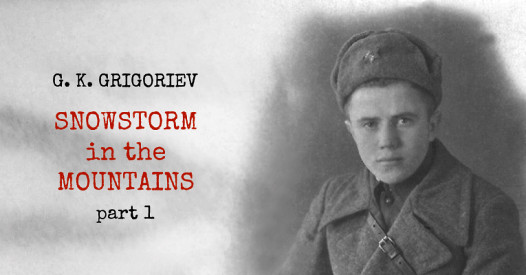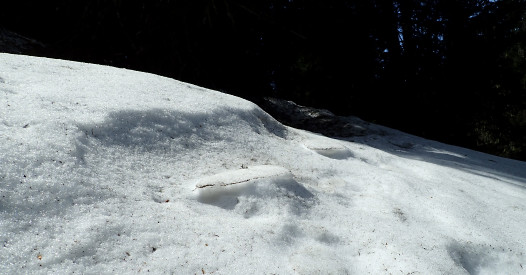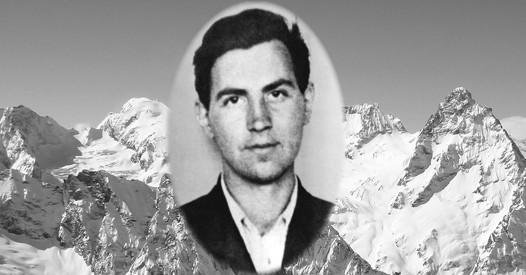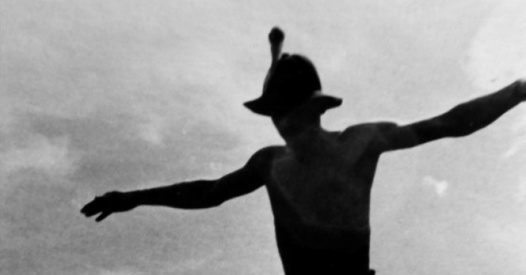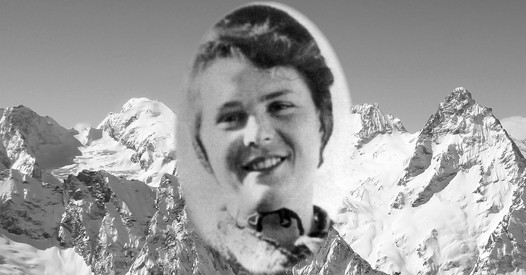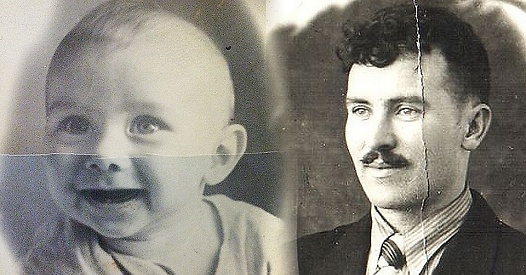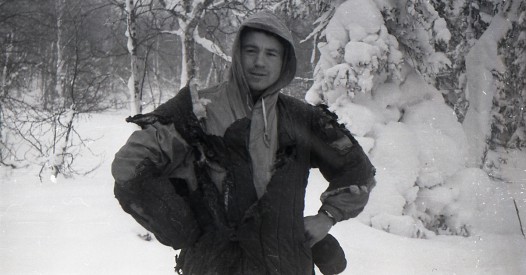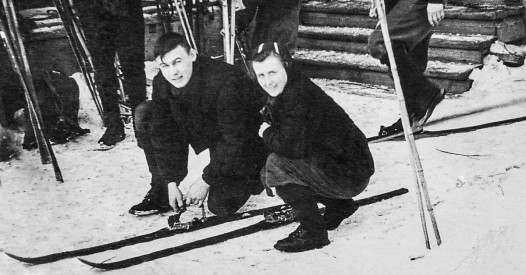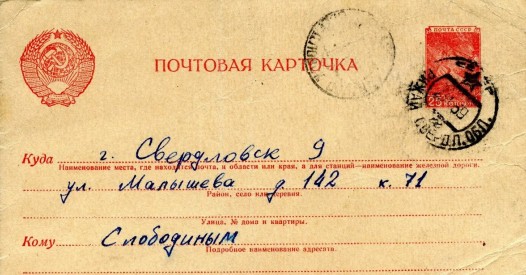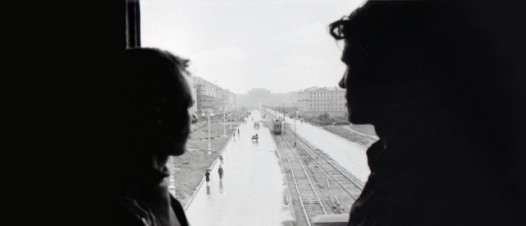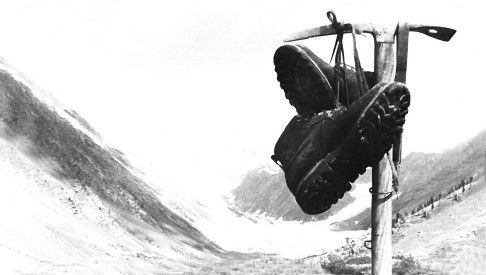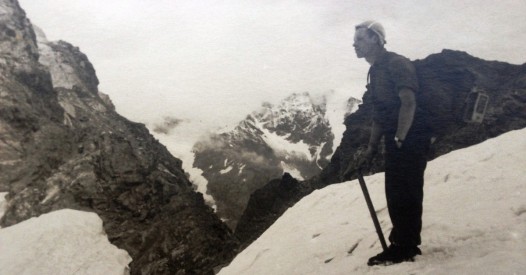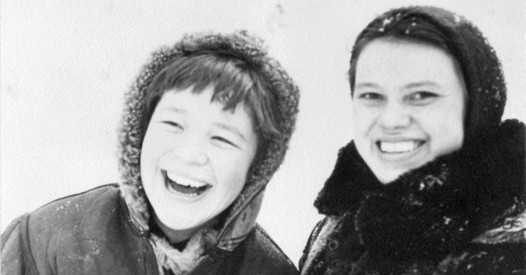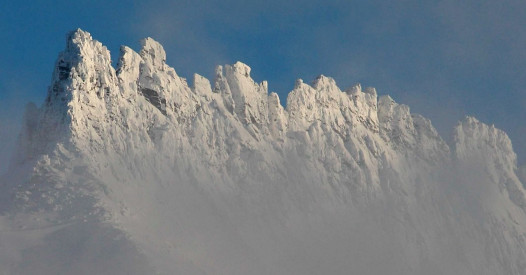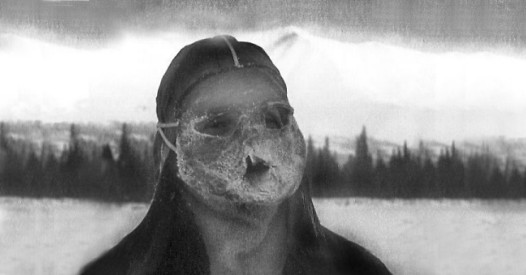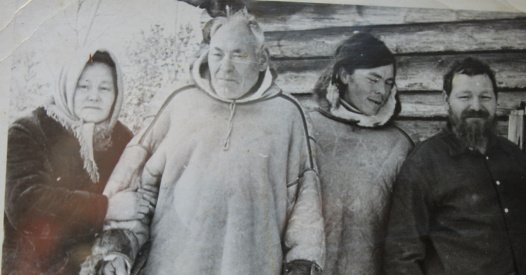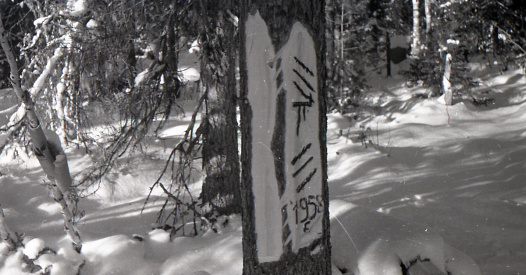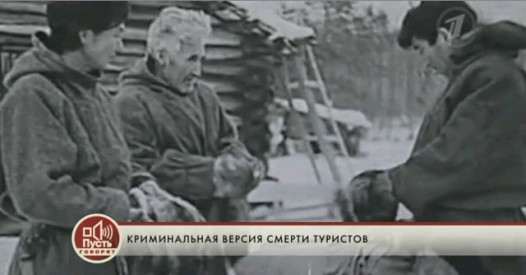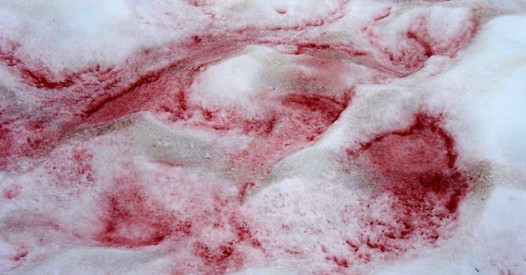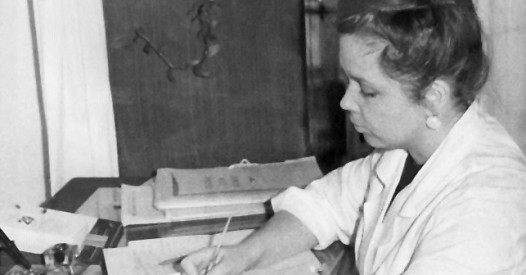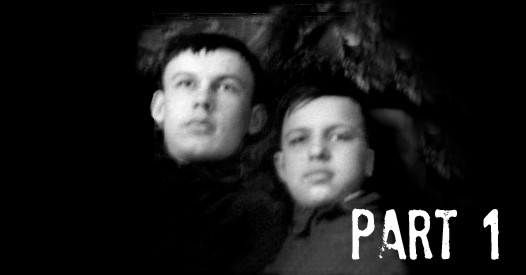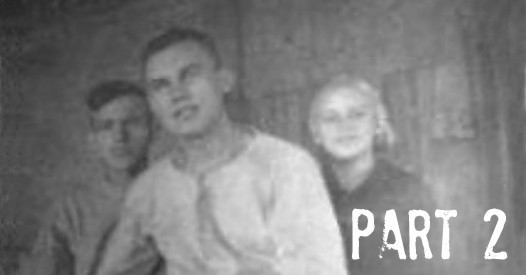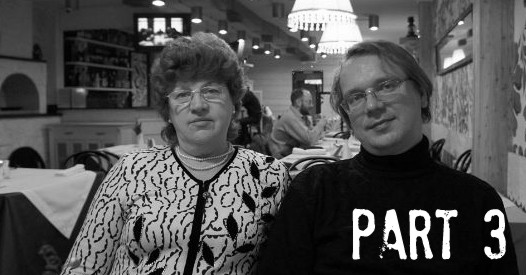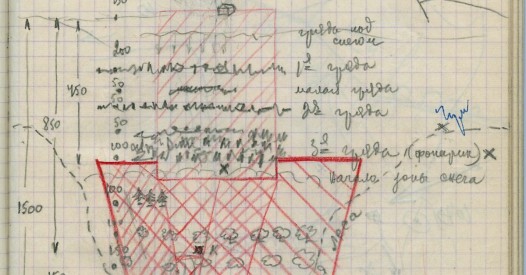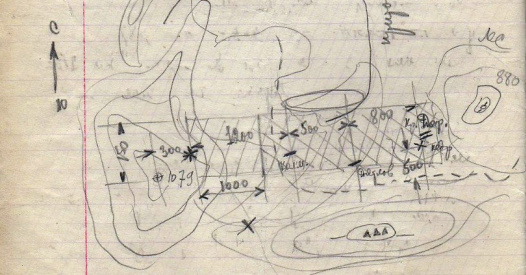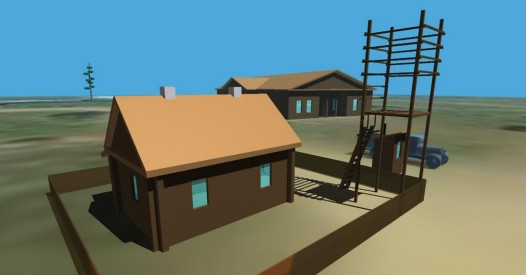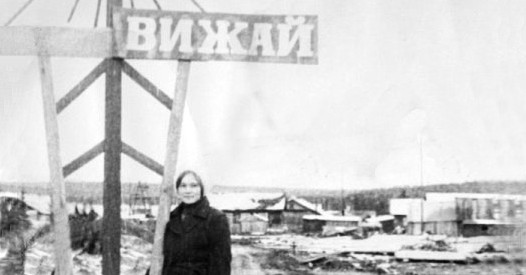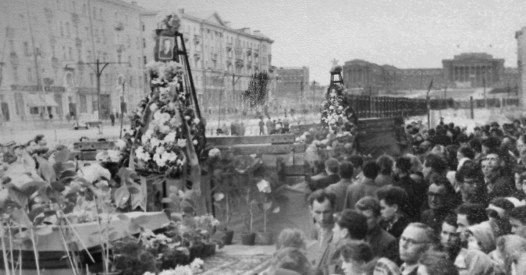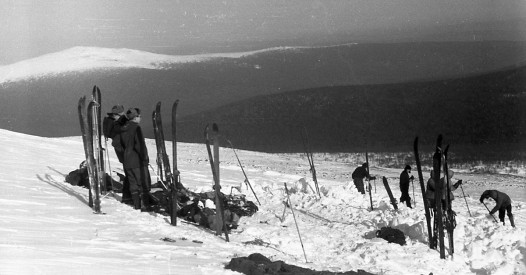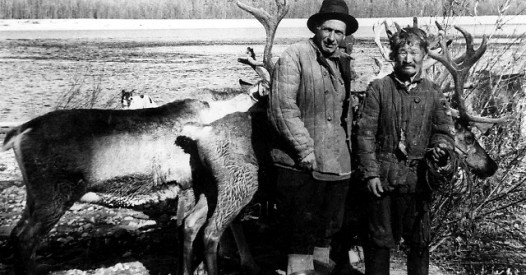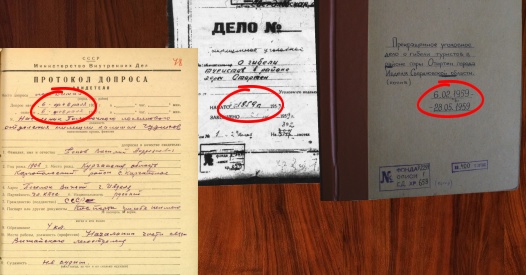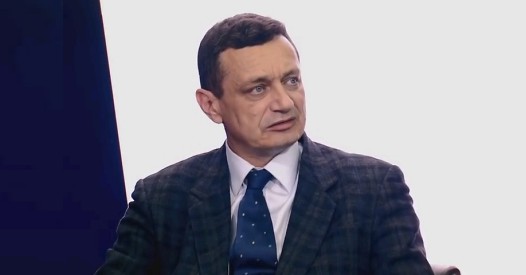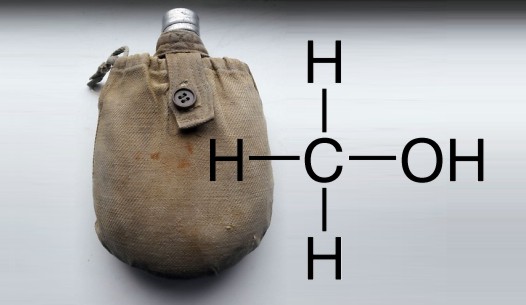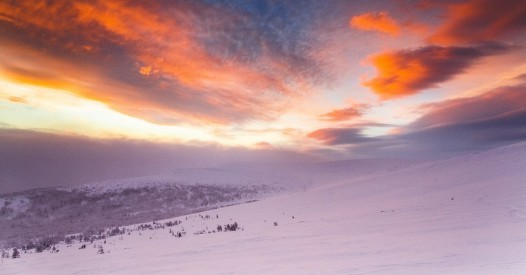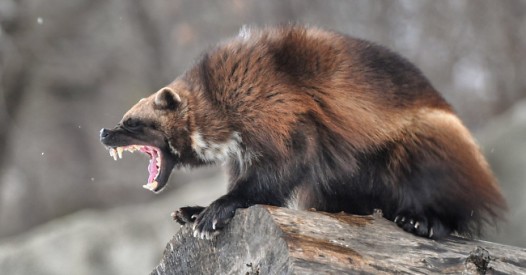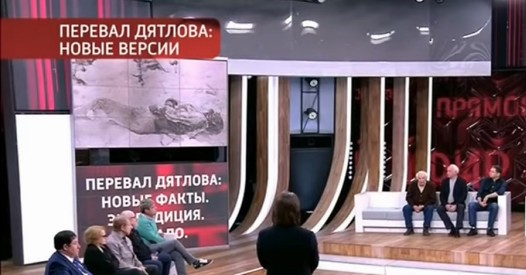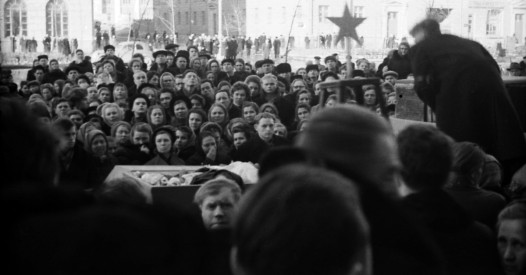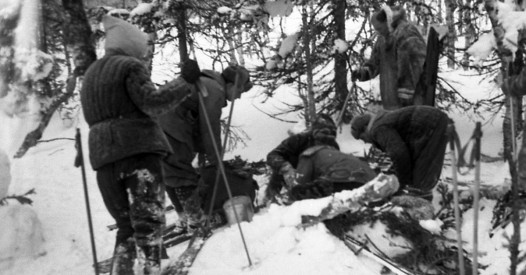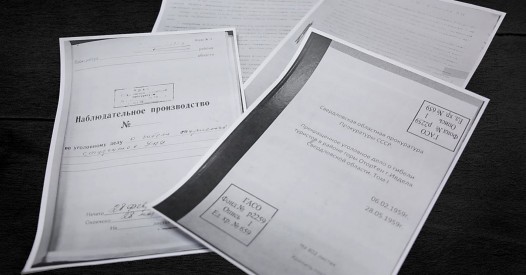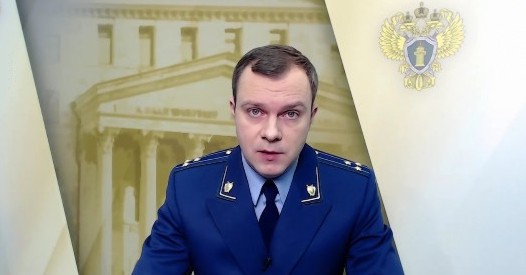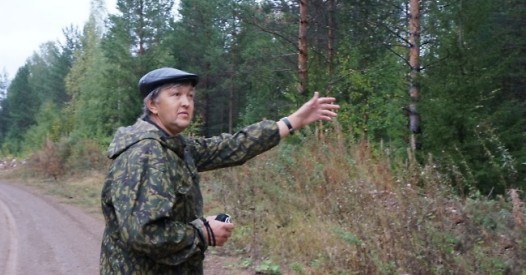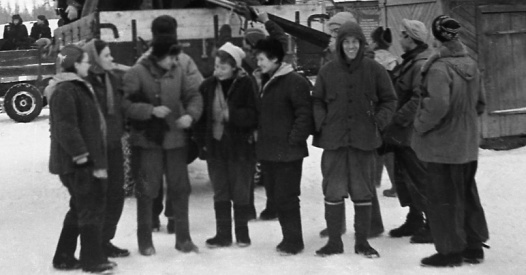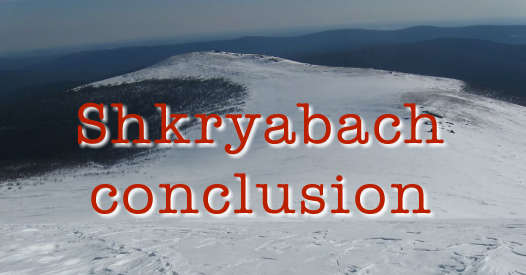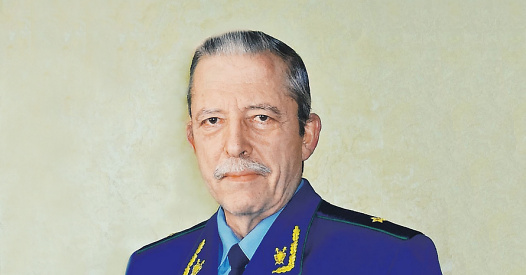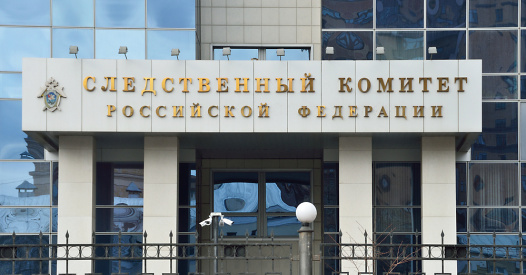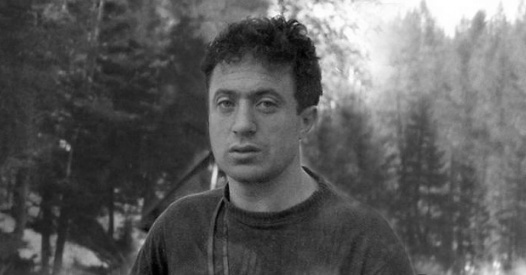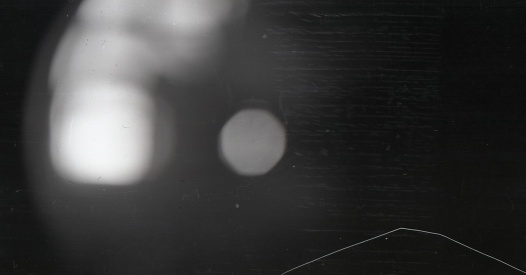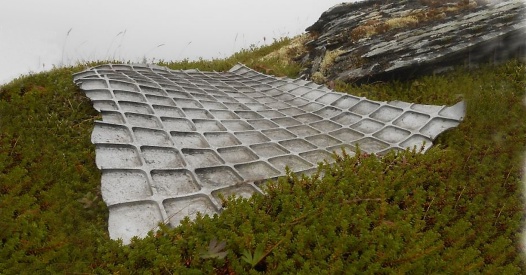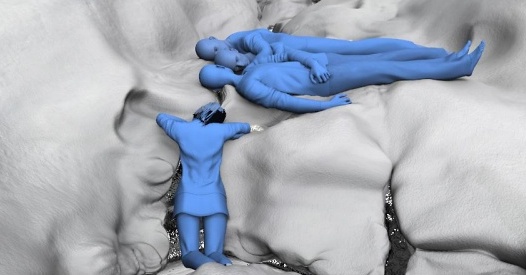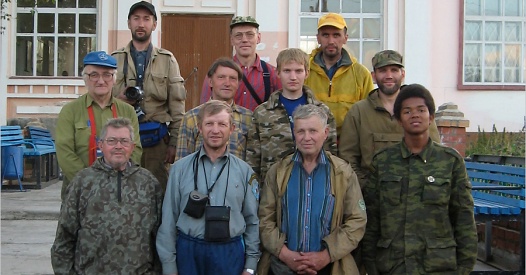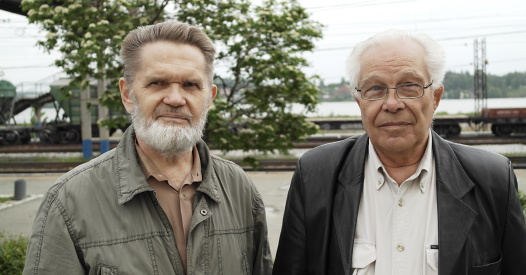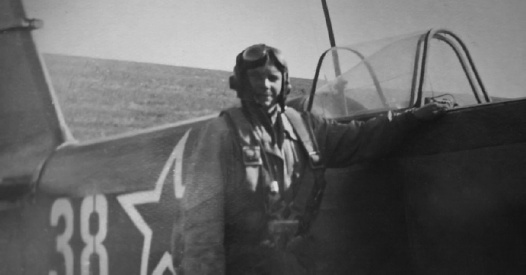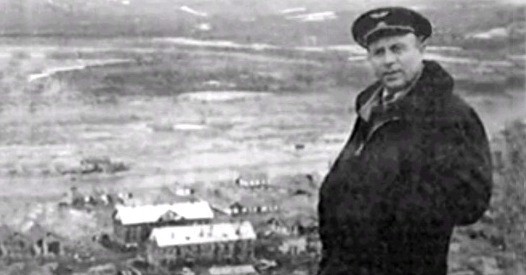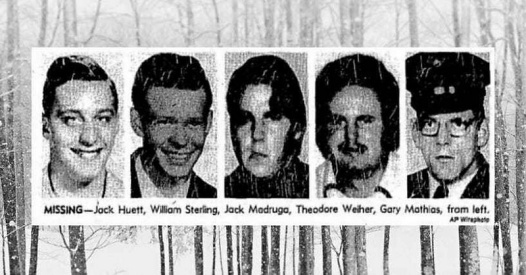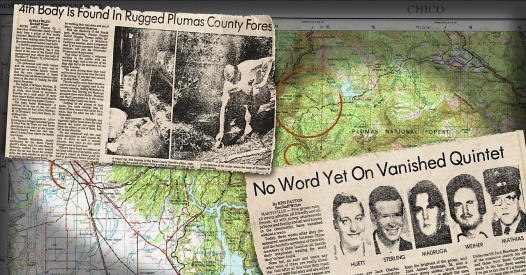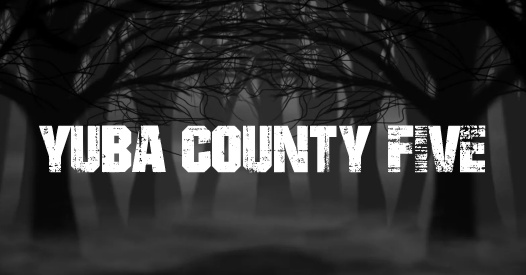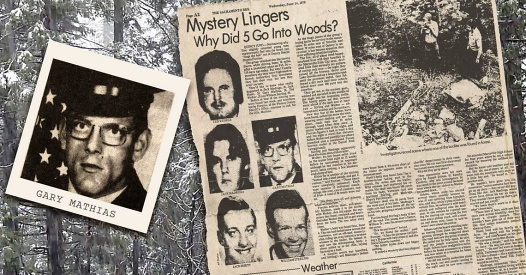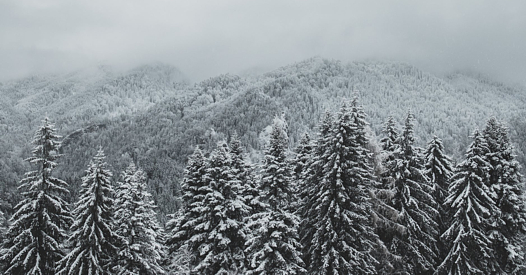
67 years ago
Excerpts © "1079 The overwhelming force of Dyatlov Pass". On the homepage are showing only little known bits of information. The diary entries and photos made by the Dyatlov group members on that day can be seen if you click on the calendar date.
On this date
The Dyatlov group consisting of 10 hikers left Sverdlovsk on by train №45 (№43 in the diary) at 9:05 pm local time. They arrived at Serov station at 6:38 am. The journey took 10h 34m. Distance between Sverdlovsk and Serov is 388 km (241 mi). Until mid-1939, Serov’s name was Nadezhdinsk, but the name of the city's railway station had not yet been changed. The station would be renamed from "Nadezhdinsk" to "Serov" only in 1964.
Read all diary entries for January 23, 1959 →
The Dyatlov group had only 9 tickets for the first leg of the journey, and Lyuda had to hide under the seats when the conductor came to check the tickets. I guess this is because it was her responsibility as treasurer to buy the tickets. Why did she buy only 9 tickets, was it to save money or maybe she didn't expect Zolotaryov to show up?
On January 22, as part of the first shift of the UPI group of virgin land developers, Bienko left for the Un station 180 km (112 miles) from Sverdlovsk, where the UPI student timber industry enterprise would start work. Now they were TEN.
On January 22 Zina Kolmogorova arrived from Kamensk-Uralskiy after she was granted a leave of absence from her pre-graduation practical training at the Radio factory, PO Box 33. Zina wrote a letter to Lidiya Grigoryeva that day from Svredlovsk. In this heart to heart letter she confesses that she is still in love with Doroshenko.
On January 20, Dyatlov received three copies of the route book from Valerian Ufimtsev, the instructor of the city committee for physical culture and sports. Two copies of the protocol of the route commission from January 8 were left in the files of the route commission and the city committee. Dyatlov was supposed to deliver the third copy to the UPI sports club on receipt of the equipment, but he had apparently forgotten to do so. There is a conjecture that this was not accidental, as the revised return dates affected the beginning of the term. On the suggestion of Maslennikov, the initial target dates of January 26 - February 9, 1959, were changed to January 28 - February 12, 1959. This resulted in two simultaneous violations of the process of issuing the equipment: one by Dyatlov as the group’s leader, and another by Blinov, who as manager of the bureau of the UPI hiking club was responsible for issuing the inventory at the UPI Sports Club.
Dyatlov made one more blunder. The leader of the group should have kept only one copy of the route book out of three. Although the copies of the route books were to serve for reporting purposes and not for monitoring the group’s movement, which was done on the basis of the protocol of the Routing Commission, the second copy was to be retained in the files of the Routing Commission, along with a copy of the protocol, while the third copy was to be held by the controlling organization, in this case, the UPI Sports Club. Dyatlov, however, kept all the three copies of the route book. (see 14. on sheet 6 in case file 3-6)
Meanwhile, the members of the group were banding together in Sverdlovsk. But there were also unforeseen circumstances. Popov was not released from work. Vishnevskiy failed one of the exams in the winter session and was denied leave by the dean's office. As it later emerged, Verhoturov, who worked as an engineer at the Lysva turbine generator plant, had no idea that his name was on the group’s preliminary list and only learned about this in 2000. Most likely Dyatlov included him to simplify the trek application procedure since Verhoturov was the most experienced among the listed hikers.
Slobodin was released from work for the duration of the trek only on short notice thanks to the letters from the UPI sports club and the city committee for physical culture and sports.
Bienko had not received a leave of absence from the UPI Dean’s office. He was instead replaced by S.A. Zolotaryov, an instructor at the Kourovskaya tour base, who had earlier been approved as a member of the Sogrin group by the city routing commission.
A man who had faced numerous hardships and challenges in his life, Zolotaryov was at that time interested in participating in a ski trek of the highest degree of difficulty, to fulfill the standard for obtaining the title of the Master of Sports in Tourism, which could improve his career prospects. As a pragmatic individual, instead of going to the Subpolar Urals, he preferred a shorter and easier route with the Dyatlov group, none of whose members knew him. As Dubinina wrote, “At first, nobody wanted to take on this Zolotaryov, because he was a stranger, but later we thought, what the hell – and took him along, for how could we refuse him?” (Dubinina diary)
Before joining Dyatlov group Zolotaryov enlisted in Sogrin's group for a trek to Subpolar Urals that would have lasted 25 days. Zolotaryov needed the title Master of Sports which would have reflected his pay and this trek could have given him the qualification. Sogrin describes him as a very open, outgoing, polite, with good communication skills which is expected for a guide. Semyon explained to Sogrin that he found a shorter trek (15 days) and that Igor Dyatlov accepted him n the group. Semyon apologized for the situation and explained that he has family reason - he wanted to take his mom to Caucasus before the begging of the hiking season when he will be busy.
As of January 20, the group list still comprised ELEVEN: Dyatlov, Dubinina, Kolmogorova, Kolevatov, Slobodin, Bienko, Krivonischenko, Thibeaux-Brignolle, Doroshenko, Yudin, and Zolotaryov. But the matter of Bienko would soon be settled.
On January 16 Zina Kolmogorova wrote Dyatlov to wish him belated happy birthday and inquire about the trek. Zina Kolmogorova had gone to six expeditions. Four were of the 2nd degree of difficulty – an intermediate level – and she was a always going to the treks leaded by Igor Dyatlov. Like Igor himself, Zina was interested in radio and studied Radio Engineering at the UPI. The two were always seen together. A photo of her was found later in his notebook. If she had any romantic feelings towards Igor, however, there’s not the slightest clue in her personal letter to him (dated 16 January 1959) from Kamensk where, she worked at a radio plant. In her letter, she only asks Igor to update her on how things were going with regard to the preparations for the expedition.
Hi, Igor! Belated happy birthday, wish you all the best, great and challenging treks, and very successful defense of your dissertation. I am in Kamensk, I’m sitting at the factory now, today is the second day, I’m in the North-Kazakhstan region, I read the frequency response and blueprints, they will give me something to draw soon.
Igor, you know what. Write as soon as possible when we leave. I can come on the 22nd in the morning, but I would very much like to stay here longer, because my family will arrive only on the 21st. And I would like to get a diploma topic. And without them they won’t give me anything. I want to practice here until the 20th, i.e. in SKO, and where I will go after that I don't know yet. Today or tomorrow I’m going to look for Valya Baldova. I think I'll find her. In fact, it’s boring here somehow right after the institute, there isn’t the usual noisy crowd of hikers here, at least I don’t know them yet, if any; Say hello to all of our "Khibiny". How is the preparation going?
How can I help here? What's new at the institute? How does the 4th course from our group pass? Has Nikola Popov arrived or not? Is Verkhoturov coming with us? (it doesn't matter that the last name was correctly written). In general, Igor, write immediately so that I know when to leave. After all, today is already the 16th. That is all for now bye.
Many, many greetings to all our hikers, I’m bored here without you. Looking forward to your prompt response Zina
Yes, my address: city Kamensk-Uralskiy, St Zhdanova 9, house 23 room 7, Z.A Kolmogorova
By January 15, Georgiy Krivonischenko had gone on leave lasting until February 20. Aleksander Kolevatov had managed to discuss the forthcoming trek with Ignatiy Fokich Ryagin, a family friend and deputy head of the Uralgipromed Trust, who was familiar with the area and supplied Kolevatov with a map of the region. (see Rimma Kolevatova testimony case file 270-272)
On January 8, 1959, the route commission of the Sverdlovsk city committee for physical culture and sports, chaired by Vasiliy Korolyov, an engineer of the UPI Department of Physics and Technology, approved the project of a trek for a group of hikers led by Igor Dyatlov along the route of the 3rd category of difficulty: Vizhay village, Sverdlovsk Region – 2nd Northern settlement – Otorten – Oyko Chakur - Toshemka river - Vizhay village (see case file 202 below). Members of the Commission were experienced mountaineers Evgeniy Maslennikov and Victor Bogomolov. They had no doubts about the qualifications of the Dyatlov group. As of the date of approval of the expedition project, the team included fifth year students Igor Dyatlov and Zinaida Kolmogorova; fourth year students Lyudmila Dubinina, Aleksander Kolevatov, Yuri Doroshenko, Yuri Yudin, Vladislav Bienko and Yuri Vishnevskiy; and UPI graduates Rustem Slobodin, Georgiy Krivonischenko, Nikolay Thibeaux-Brignolle, Nikolay Popov and Yuri Verhoturov. Thirteen people in all (see case file 201 below).
Igor was involved in hiking thanks to his elder brother Mstislav, who in 1954 graduated from the UPI radio engineering department and was at the time working as an engineer-in-chief at the Pervouralsk New Pipe Works. Igor went on his first hike as early as 1951, together with his brother as part of a UPI hike group. Since then he went through ten hikes, including as part of a combined team of the city of Sverdlovsk. On six occasions Dyatlov was the group leader. His authority among the UPI hikers was very high. Igor Dyatlov was repeatedly elected a member of the bureau of the UPI hiking club, as chairman of the UPI qualification board and hiking club. Read more →
Igor had come up with the idea of a winter hike to the Subpolar Urals in the fall of 1958. At that same time, a few other hikers were getting ready for hikes of their own to various areas of the Ural Ridge. Sergey Sogrin, a fourth year student of the UPI Metallurgical Department and one of the Institute's most experienced hikers, was also preparing for a hike in the Subpolar Urals. By 1959, Sergey had fulfilled the standards of Master of Sports in hiking, achieved 2nd grade in mountaineering with the rank of instructor, and was now chairman of the mountaineering section of the Sverdlovsk regional council of the “Burevestnik” (Petrel) sports association. On consulting with Sogrin, Igor Dyatlov realized that a hike through that area would take a really long time, so he then changed his route for the Northern Urals, where two other experienced UPI hikers, Yuri Blinov and Zinaida Kolmogorova, were also planning a hike.
Yuri Blinov was a 4th year student of the UPI School of Physics and Engineering, and administrative manager of the bureau of the hiking club. A year earlier he had served as head of the UPI hiking club.
During the organizational stage, Blinov and Kolmogorova invited Georgiy Krivonischenko, Aleksander Kolevatov, and Yuri Yudin to join their group, and they all confirmed their participation. All the more or less experienced hikers, such as Krivonischenko, for instance, had already graduated from the UPI, but had not broken their ties with the Institute's hiking club.
Yuri Yudin was a 4th year student at the UPI Engineering-Economical Department. Since his second year at the Institute, he had been a member of the UPI hiking club, with six hikes behind him. For a few years, he also frequented the UPI figure skating club.
Everything was going according to plan until, in December, Blinov was invited to head a simultaneous hike in the Northern Urals. The change in Dyatlov’s plans came in handy: he was offered to take charge of the group instead of Blinov. In late December 1958, Dyatlov submitted his first report to the UPI hiking club, stating that his preparations for a trek to the North Urals were underway.
The organization of the group did not proceed as smoothly as Igor would have liked it to. Evgeniy Chubarev refused to take part in the hike; like Blinov, he went as a group leader on another route. For Pyotr Bartolomey, Nikolay Tregubov, Vladimir Shunin, Nataliya Sharnina, and Maria Pliusnina the timing of the trek coincided either with the deadlines for their diploma project development or with practical training in various cities. For various reasons, Vyacheslav Halizov, Pavel Tarzin, Vladimir Pudov, Valentina Baldova, and Tamara Vedyakina could not go, either. For some time Zinaida Kolmogorova contemplated going on a trek to the Subpolar Urals together with Sogrin, but eventually decided to stay on with Dyatlov. The group was also joined by Vladislav Bienko, Yuri Vishnevskiy, and Lyudmila Dubinina, who had failed in the organization of their own treks to the Subpolar Urals.
Nikolay Popov, a graduate of the UPI who worked in the city of Bugulma as an engineer at the Tataristan Research Institute (TatNII), wanted to go with Dyatlov, but he was not sure if he could get a leave from work. This is the letter he wrote to Igor Dyatlov. Nikolay Thibeaux-Brignolle, Rustem Slobodin, and Yuri Doroshenko had agreed to take part in the hike.
December 1958
"A group of hikers from the Ural Polytechnic Institute saw the New Year in – and, with it, the winter vacation of 1959 - on the bank of the Chusovaya river not far from the "Boitsy" station of the Perm railway. Winter vacations were the time of the long-awaited hikes that would take students away from the city for many days. The hikers, under the supervision of Igor Dyatlov, UPI fifth year student, were now checking through their tent and personal equipment in anticipation of the ski trip in the Northern Ural Mountains."
1079 The overwhelming force of Dyatlov Pass / Chapter 1
Treks in 1957 and 1958, same tent with the chimney of Dyatlov's custom made stove sticking out.
* * *
A letter written by Krivonischenko on December 27, 1958, addressed to Igor Dyatlov discussing the details of the upcoming trip to Northern Ural starting on January 22, 1959. The letter contains a poem which Krivonischenko dedicated to his fellows hikers.
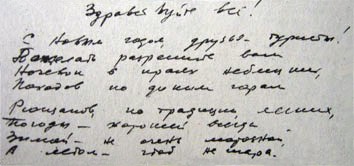
"Hello everyone!"
Happy New Year, hiking friends!
Let me wish you
Camping in faraway mountains
Ascending summits in the wild.
Let your backpacks be light,
weather always fine,
winter not too cold,
and summer to be mild.
The dirt not to bother you,
The sugar not to get wet,
When the river is boiling
And you go overboard.
Pants not to shred into tatters,
So you can patch them and go,
After drying your jacket at night
To have left more than a sleeve.
Your shoes to be good
Not a year, but dozens of years,
Wish your to leave your tracks
all over the map of Russia.
I’m going on the hike from the 22nd if the temperatures below 30 degrees don't last longer than 5-10 days, that is, there will remain about 10 days to finish my work, after which I can go on vacation, but without finishing it the administration won't let me go.
In temperatures below 30 and 24 mph wind, whatever needs to be done outside is canceled, same as at 40 degrees without wind. Kolya Thibault probably knows about this. We haven't worked for two days, how long will this go on depends on the temperatures.
I still have questions about the equipment - what of the public equipment I need to take, and what can I leave. Also interested in the situation in Sverdlovsk with camera films, I do not have a single one.
Kolka Popov wrote about our expedition. He knows. Now I will write again. If he has at least the slightest opportunity - he, of course, will join us. I am in high spirits and good shape, I will be in Sverdlovsk between January 10 and 20. I will keep in touch through UPI sports club. I will go to the institute right after I arrive.
That's all.
I wonder how does the group come along, who stays, who doesn't. I hope I can go with you, and if I don’t (which is not likely) you will get a telegram till the 20th.
Now about the money. When, where, to whom and how much to send?
I’ll bring a bill of health with me. December 29-30 we have a medical board (physical education), and I’ll get it from there.
That, in fact, is all I can say. In all honesty, I missed my camp life very much and I dream of an expedition as a great blessing. I have my own skis.
Greeting to all hikers.
December 27, 1958
P.S. In preparing the trip, do not forget to take into account the mandolin (for the weight), since I already play a little, and probably there will be N. Popov
G. Krivonischenko
Ed. note - Krivonischenko always signed G. for Georgiy. Yuri is a nickname used by his friends.
* * *
Dyatlov gathers a group for the Subpolar Ural from as early as Oct 15, 1958. On Dec 12, 1958 he invites Nikolay Thibeaux-Brignolle, Yuri Doroshenko and Nikolay Popov, if the latter is allowed from his place of work, the Tatarstan Research Institute. Nikolay Popov is always pictured with a mandolin in his hands. Below is a letter where he begs Dyatlov to take him on the trek. The reason why he didn't join the group is unclear.
Hello Igor!
Hello brothers!
No wonder they say: word gets around. Although the TatNII is far from UPI, I overheard that you are going on a hike to the Subpolar Urals. Goska, holy-moly! Take me for God's sake!
Igor! First, please get back to me right away. Secondly, tell me who is coming. Thirdly, how many days is the trip, and how much it will cost me, so I have all the facts to make an informed decision if I can afford to go.
For my part, I want to tell you in advance that I have no skis, no ski boots, and no backpack. But I have everything else. Do you think possible for me to get backpack, boots and skis from the institute? I would be very happy if so. I'll find the rest myself. Igor, be sure to write right away, if the group does not mind me joining, so that I can inform you in time whether I can go or not. In the meantime, I will start getting ready without wasting any time.
Give all the brothers greetings from the Gloomster. Let me know what is like the new (hiking - ed. note) section. And most importantly, unlike all past times, at least write an answer.
My life at the moment is tolerable, but the hiking aspect is very bad: although we are only 5 (in total!) qualified hikers, were trained over the summer, but there is no section. Neither in the TatNII, nor anywhere else in Bugulma. And for the whole of this winter we made only one hike that lasted a day. There is neither equipment in the VSS (Voluntary Sports Society - ed. note), nor enthusiasm among the youth of the city of Bugulma.
Well bye for now! Hiking greetings from the Gloomster (signature)
Dec 12, 1958
* * *
Heartbroken Zina wrote to her friend Lidiya Grigoryeva. The letter was written during the exams "We are taking exams now", that is, in the period December 13-27, 1958. The dates of exams and tests in December 1958 are known from Zina's record book - see below. The photo is from a trek to the Northern Ural in 1957. At the bottom is Nikolay Thibeaux-Brignolle.
Expedition to Dyatlov Pass along the route of the Dyatlov group
January 20 - February 1, 2026
Twelve brave hikers are embarking on a reenactment of the Dyatlov group's route in the Northern Urals, undertaking the journey without motorized vehicles or supply drop-offs. They are prepared for the expected severe weather and hope to have the opportunity to conduct the experiments they have in mind. Wish them luck on this page →
* * *
This episode of Malahov was aired on January 19, 2026. Alexey Koskin and Oleg Taymen (aka Nikulin) are guests and they talk about the expedition. YouTube generated subtitles, you can translate them from the settings (cogwheel icon) into a different language. The speculation that the some of the bodies were taken to the Ivdel morgue, washed, redressed, and then returned to the pass, something we wrote in our book "1079. The Overwhelming Force of Dyatlov Pass", is now a common knowledge. In this episode another discrepancy, one of many, is exploited - how can Zolotaryov have joined the trek if a document is showing that he died in December 1958. The document can be seen on 2:41.
"1079. The Overwhelming Force of Dyatlov Pass"
Sixty-seven years will pass on February 1, 2026, since nine experienced hikers mysteriously perished in the Northern Ural mountains. This is also the one year anniversary of the publication of "1079: The Overwhelming Force of Dyatlov Pass". The volume is a detailed encyclopedia on this coldest case of the 20th Century, and includes a groundbreaking theory, based on well-documented evidence rather than wild speculations, that finally ties together all known facts about the Dyatlov mystery into a credible sequence of causes and effects.
"1079. Стихийная сила Перевала Дятлова"
Можете купить русское издание в следующих книжных магазинах:
Alib.ru
Amazon USA
Avito
Book24
Буквоед
Дом Книги (Екатеринбург)
Дом Книги (Санкт-Петербург)
DomKnigi Europe
Ebay USA Signed!
Esterum Worldwide Worldwide
Exlibrus Worldwide
FindBook
GELIKON Europe
Игра Слов
Кабинетный ученый
KNIGAMIR Worldwide
КНИГИ УРАЛА
Лабиринт
Libex.ru
MyBooks
Natasha Kozmenko Booksellers Europe
Ofeni.ru
Ozon
Пиотровский
СОКРАТ
Тайна.ли
Читай Город
Читай Город-2
Читай Город-3
Wildberries
Яндекс Маркет
Russian Detective award
"1079" won the "Russian Detective 2024" award for "Documentary Detective"
June 8, 2024
"1079. Стихийная сила Перевала Дятлова" стал лауреатом премии "Русский детектив 2024" в категории "Документальный детектив". «Победу в этом конкурсе, полученную премию я посвящаю своему соавтору Игорю Павлову, - сказала Теодора Хаджийска со сцены. – Без него этот проект не состоялся бы.»
"1079. The Overwhelming Force of Dyatlov Pass" became a laureate of the "Russian Detective 2024" award in the "Documentary Detective" category. “I dedicate the victory in this competition and the award received to my co-author Igor Pavlov,” Teodora Hadjiyska said from the stage. "Without him, this project would not have happened."
Usually this bit should be archived to Current Events. But due to out pour of questions I was invited on a follow up on February 2nd. The date is not by chance. So I am going to leave it here as a reminder. A private message in the Dyatlov Pass Forum captures teh gist of our conversation and what to look forward to.
Spaced Out Radio with Teodora Hadjiyska
"I think two categories of people will participate, just like in the forum. There are those who know nothing and want to learn. There are who know everything and want to teach! You are aware each kind and have suffered the attentions of a few know it all types. For those who know nothing, understanding the "how" of an event does not answer the "why" of the event. (How the tent was knifed does not explain why.) Most important Dyatlov Pass incident facts, though easily stated, have more than a single explanation. Its the "yes, but" or "no, but" answer pattern. You answer expertly and do not come across as being the blind leading the blind. You have authority. For those who know everything, the numerous alternative explanations are the best evidence that everything about the case is not known. People with firm opinions of the Dyatlov Pass incident are likely to exclude facts that do not agree with their point of view. This is quite common. For conspiracy theorists, research confirms their preexisting belief is that the world is a fundamentally bad place and that everything must be black or white. The white hats do not always prevail! This mechanical view of things leaves no room for chance events and the unfeeling forces of Nature. Your podcast audience should be reminded that you are no armchair theorist, you are an investigator going where the evidence leads. Many forum members, myself included, keep re-hashing the known story in the hope that something new emerges. Then, there are people who just want a simple answer and be done with it. The Dyatlov Pass Incident was a real occurrence affecting real people in a real world. I thought you did a good job of making that clear on your podcast, while giving a playful nod to the Yeti. People are going to wonder and perhaps ask, "What's in it for you, Teddy?" I trust you will have an answer to share." Glenn Mitchell (aka GlennM) Listen now Part 1→
Articles
How Did the C.I.A. Lose a Nuclear Device?
In 1965, during a secret expedition to Nanda Devi, an atomic device got lost and continues to be missing and potentially hazardous to the people of India if it contaminates the Ganga. This is a chilling story of international espionage, involving China, the CIA and the Indian government. Capt Manmohan Singh Kohli, the leader of the expedition, speaks about the three-year-long project that remains one of India’s lurking unsolved mysteries. I still can't wrap my mind around it. If the CIA managed to lose a nuclear device on Nanda Devi and cover it for so many years then anything is possible. Read the article →
Elena Koskina's notes from 1988-1989 part 2
Elena Koskina chronicled her investigation into the Dyatlov group hikers' deaths. From 1989 to 1999, Elena communicated with searchers and recorded their recollections of the tragic events of the winter of 1959: Boris Slotsov, Boris Suvorov, Pyotr Bartolomey, Vadim Brusnitsyn, Vladimir Lebedev, and radio operator Egor Nevolin. Elena traveled to Kustanay and met with Lev Ivanov's widow Leontina Grigoryevna, daughters Tatyana and Aleksandra, and colleague Zinaida Kivokurtseva. Note how afraid is not to be found guildy of something. Notice how Vozrozhdenniy is afraid of being accused of something. Read the article →
The original title of this article is "A forensic expert on the Dyatlov Pass mystery: "If they weren't Phystech students, they'd still be alive." I didn't understand it so I turned to Vladimir Askinadzi, who was Phystech student himself. Here is what he explained to me in a private correspondence: "Lev Ivanov believed the fireball theory until the end of his days. This was passed on to Vozrozhdenniy. The actual atomic bomb explosions and their consequences were hammered into the minds of the Phystech students in their curricula. The explosions over Hiroshima and Nagasaki in 1945 were the most common examples. According to Ivanov, the Dyatlov group (the two who were outside the tent) mistook the fireballs for an atomic explosion and caused a panic. The Phystech students knew the consequences of these explosions better than anyone else, and by the time they emerged from the tent, the fireballs had already flown over the horizon. But the aftereffects of the panicked screams continued to trigger panic, and the group rushed down the slope, away from what they thought was the radiation."
Elena Koskina's notes from 1989 part 1
Alexey and Elena Koskin were the first-generation sleuths who went to the archive and copied as many of the case files as they could. Then, suddenly, on December 27, 2012, he announced that he would no longer be involved. Many explained this with their divorce. Alexey Koskin was friends with Yuri Kuntsevich. Kuntsevich headed the Memory fund, and after his death, Alexey Koskin was compelled to step back into action. He is now the head of the memory fund left as a legacy by Yuri Kuntsevich. The notes are published for the first time, having been taken directly by Elena Koskina, who spoke with searchers, Slobodin's mother, and sister. Read the article →
The weather did not kill the Dyatlov group. Whatever transpired was a combination of random events, with the wrath of nature potentially a contributing factor. Any problem, like injury, getting lost, or another otherwise survivable disaster could become fatal when combined with severe weather. In any case, weather is a common denominator for all the theories. Clarifying what exactly were the meteorological conditions at the time of the incident is paramount in our opinion. We will continue researching the role of the weather in deadly mass casualty winter mountaineering disasters.
Polar Vortex Collapse, happens now and in January 1959
In lamer terms this article says that the cold air is contained by the polar jet stream above the arctic pole and when a Stratospheric Warming event (warm air moving North) causes a disruption the cold air leaks and spills over the continents. This had happened rarely and the first recorded anomaly was in January 1959. This means strong winds and a drop in temperature similar to what we are observing now. And it's all happening because the Polar Vortex is disrupted. Scientific prove that weather was not all normal as the prosecutors say. The weather is a contributing factor but to understand what really happened we can't ignore it. Read the article →
The Cairngorm Plateau Disaster, 1971
The 1971 Cairngorm Plateau disaster, Britain's worst mountaineering tragedy, occurred on the high, exposed plateau area of the Cairngorms, near Ben Macdui, at altitudes around 900 m (3,000 feet), with the group caught in a blizzard while trying to navigate the vast, featureless expanse known for its harsh, inhospitable conditions. The young hikers died from hypothermia and exposure, and were found buried in 1.2m of snow. Parallel to the Dyatlov group are the similar altitude and terrain. What drew my attention was that the dead were buried in snow. They were suffocating. This proves that if the hikers of the Dyatlov group were buried in the snow in the ravine they would have died first of either asphyxiation or hypothermia before the snow supposedly crushed their ribs and skulls. The lethal injuries were per-mortem. They were not caused by the weight of the snow. Read more →
A doctor's first-hand account of the deadly Patagonia storm. In November, a blizzard with hurricane-force winds struck a popular hiking route in one of Chile’s most visited tourist destinations. Five people died. David Zonshayn, an emergency physician from New York, was on the trail when it happened. I want to drive your attention to what he was mostly scared of. Here is his story. Read the interview →
Five hikers died after being caught in a violent snowstorm in Torres del Paine National Park, located in Chile’s Magallanes region of Patagonia, on November 17, 2025. Many tourists were hiking along the park’s O-circuit route when weather conditions deteriorated rapidly. At the time of the accident, they were traversing the John Garner Pass. Amidst the controversy surrounding the efficiency of the rescue operation and the lack of an immediate response due to compulsory voting for Chile's presidential elections, the sadness remains that the odds were stacked against these people, full of love for the mountain. Mother Nature always has the final word, but there is a lot that can be done to prevent this from happening again.
Read the article →
New weather data from 7 meteo stations for Jan 30 - Feb2, 1959
We are making public the weather data from seven nearest to the Dyatlov Pass meteo stations for the dates of January 30 - February 2, 1959. We do not have an analysis from an expert on what this data confirms. This is the next step of our sleuthing. The authors of this project give thanks to the people that donated for the information. Keep reading →
The Haute Route became a death trap on April 29, 2018, leaving many questions unanswered. Seven people froze to death from exhaustion in the snow and ice. The parallels with the Dyatlov Pass incident is the death by extreme hypothermia and exhaustion due to hurricane-strength winds, which are very common at the Dyatlov Pass too. There was a cascade of mishaps that led to the tragedy. What's piqued our interest in this particular incident is that there were two more groups that survived. One of the groups didn't even know someone was struggling in the storm 550m away from the shelter. Were they that different to start with?
Read the article →
Statistics and weather data, or what was unknown in 1959
A "bora"-type phenomenon could have been observed in the area of the main ridge on the eastern side—a downward drop of heavy cold air as it crossed the ridge, with winds increasing to hurricane force at 20-30 m/s below the ridge. This was the weather in the accident zone, according to Moshiashvili's analysis. Strong winds could have caused increased blowing of fresh snow from the mountains, heavy drifting snow, and a "ground blizzard" of previously fallen snow. This could have been the reason for the Dyatlov group to halt on the slope of Mount Kholat Syakhl when the temperature began to drop and the wind began to pick up at the end of the daylight. Keep reading →
The dendrochronology report is ready. The conclusion is that the tree samples collected during the last expeditions in July and August, 2025, are not helpful to narrow down where to work with the metal detector. The tree cores are not proof but pointers where to dig for the truth. The results on the samples brought in 2022 and 2023 are still our best bet. Keep reading →
Firewood in Dyatlov group tent
If you ask if there was firewood in the Dyatlov group's tent you will get many different answers. This publication is about something that stands between the stove and the tent, it is also made of wood, but it is not firewood. Small detail, but it makes the whole scenario of carrying wood implausible. It is only one of the many aspects of the tent being on this place pointing into the direction of staging. Why would Dyatlov carry one log and then pitch the tent in a way that the stove can not be used? Was this firewood or something else that the conspirators considered part of the stovepipe?
Interview with Pyotr Bartolomey 2019
In this interview Pyotr Bartolomey talks about the last hike he shared with Igor Dyatlov which was in many aspects very similar to the fateful trek a year later. The tent was the same, the stove was of a similar design, they pitched the tent in a treeless zone and had to use the stove because the leader, Moisey Akselrod got sick after a fall through a gully into a stream. They had quite an adventure, Igor Dyatlov was flown over the route and he guided the group from memory. The trek was in the Subpolar Urals, 3rd category, and all the practices that Igor Dyatlov will later use in 1959 were witnessed and shared by Bartolomey, who was invited to the 1959 trek to Otorten, but couldn't make it due to his studies schedule.
In the Footsteps of the Lost Expedition
This is the first article that the duo of journalist Natalya and Nikolay Varsegov did on the subject of the Dyatlov Pass incident. This is their first peak into the rabbit hole. The original assignment to Natalya Ko was to investigate the unexplained disappearance of an An-2 aircraft with a pilot and 12 passengers on board in the Northern Urals in June of this year has once again brought to mind the equally mysterious story of the Dyatlov Pass, where 9 students and graduates of the Ural Polytechnic Institute died in the winter of 1959. Komsomolskaya Pravda special correspondents followed the route of the ski tourists who died in the Northern Urals half a century ago under very mysterious circumstances.
"Dyatlov Pass" by Anna Matveeva
The recent TV series, "Dyatlov Pass" (english title "Dead Mountain") was based on Anna Matveeva's detective novel. The book has no direct relation to real history, except for its use as a backdrop for a fictional plot. Reviews of the novel are mixed: some criticize it for its fiction and inaccuracies in relation to real events, while others note it as a fascinating detective story with an interesting intrigue. What is of value for the sleuths is that the author studied the information pertinent to the case that was available at the time, and this book is considered one of the first sources to cite the case files.
Roman (aka Hunter) is doing some deep diving into the bottomless subject of the knives that the Dyatlov group brought or didn't bring with them. In the center of the problem is always the fact that on the trek photos we see knives that then are not mentioned in the case files. The author calls his article "debunking of myths surrounding the Dyatlov group knives". The conclusions are addressing years of rumors, some having started before the case files were even available. Now that we have more information, is the picture becoming any clearer?
Vladimir Askinadzi interview 2025
Vladimir Mihaylovich Askinadzi, a resident of Sevastopol, is 88 years old. He is the only surviving direct participant in the May search for the Dyatlov group (the search for the missing hikers continued several months, starting in February 1959). It was Askinadzi who found the body of Lyudmila Dubinina, next to which there were three more corpses. We met with Vladimir Mihaylovich to learn first-hand the details of the discovery of the last four and to discuss previously unknown photographs of the den and the excavation site of the corpses recently found in a private archive.
Yuri Yudin passed away on 27 April 2013 at the age of 75 from rheumatic heart disease. Till the very end, researchers obsessed with the case were trying to come up with the right questions to ask. They gathered 100 questions. What would you want to ask the only "survivor" from the Dyatlov Pass incident? He didn't actually survive the incident; he turned back from the trek due to a chronic disease that flared up. He was one of the last to learn his friends had died since he went to his village, Emelyashevka, to spend the remaining of the break from classes, and the investigation found him there and flew him straight to Ivdel to identify the bodies.
2013 interview with members of the 1959 search
This brief interview sparked a long-standing controversy about the stove and whether firewood had been discovered in the tent. I will follow up with an overview of the sources, who said what, and a startling conclusion. To me, these "unsensational" interviews contain the details that can break the case. There are so many missing pieces. Where did they all go?
Searchers: There were 3 flasks found in the tent including the one with alchohol that Slobtsov group drank.
Question: But the materials of the Criminal Case do not describe any hot water bottles?
Askinadzi: The materials of the Criminal Case do not describe a lot of things!
How often do we get new information on a 66 years cold case? They made me revise the order of the search photos and also seek answers to questions I didn't know I had. My own take is that putting the pieces of the puzzle in their correct place not only helps paint the big picture but also saves us from drawing ridiculous conclusions.
Please check the new revised order of the search photos.
Maya Piskareva, 4 March 2015
Maya Piskareva's specialty is to find and talk to people who have connections to the Dyatlov Pass. In a series of interviews, she gathers valuable information about the Mansi. This knowledge is important because the events took place in their habitat, and knowing more about their customs, belongings, livelihood, and folklore can help spot their presence in the taiga and role in the tragedy. Maya Piskareva concludes that the Mansi people are capable of killing.
Maya Piskareva, 25 May 2012
This is a very interesting interview, a must read. Everything about the Mansi and their ways. Vladimir Androsov is a very well liked and respected born, raised and lived in Vizhay his whole life. He knew the Mansi that took part in the search in 1959 and grew up with their kids. Knew the taiga, and the mountain, and the Mansi traditions. I am still trying to wrap my mind around a few moments from this interview because they are going against everything we know.
Elena Zagorskaya (Moscow, 6 May 2015)
In his last interview Slobtsov says that they talked over the radio in a prearranged time. In the case files we can only read radiograms. A radiogram is a formal written message transmitted by radio. Also known as a radio telegram or radio telegraphic message. So we are missing all the exchanges that did not leave a paper trail. Slobtsov remembers footprints coming from someplace else and merging with the footprints coming from the tent. He also remembers the footprints being 2-3 days old. If left by the hikers they should have been 24 days old. See for yourself, I have highlighted the places that I find interesting.
Maksim Chervyakov and Galina Sazonova (Moscow, 17 August 2014)
Here is a sensible interview, with many questions that bother the sleuths trying to solve the case. What is evident is that different participants in the events remember different things. Which is normal. But also things that were once spoken about stop being part of later recollections. Important details. Or maybe they are not important, but that's the thing, we do not know the importance of these details. To us in modern times it is a challenge to even figure out what was there. The binoculars, why can't Sharavin remember them, the cut-into-pieces ski pole inside the tent only Sharavin has seen, the notepad that Ortyukov took from Zolotaryov's hand that only Askinadzi remembers, and it goes on. Sometimes it almost feels like they are talking about different cases.
Excerpts from an interview on Channel 1
Information about the first days of the search for the Dyatlov group straight from the horse's mouth. Boris Slobtsov was the leader of the first shift that found the tent, and the first bodies. Recollections about the tent, footprints, clothes, wounds, poses, color of the skin, Boris Slobtsov even knew some of the dead. The account of the chilling days when the first bodies were found and all hope was lost.
Search and rescue in the Northern Urals February 1959, Dyatlov Pass
Magazine "EX" №46 (January-February 2007)
Small details nagging at us throughout the years. The earlier recollections should have more weight, and researchers could also track the sources. Many "memories" of the events are based on hearsay. Slobtsov is the first to say that forester and guide Ivan Pashin didn't feel like going further towards the tent. Was it before or after they noticed something dark in the snow? No one remembers binoculars, only Slobtsov. It is also admirable that Slobtsov is not easily influenced by a theory. It is important to see the boundary between facts and speculations at all times.
The search for the Dyatlov group
Vladimir Borzenkov and Evegeniy Buyanov, September 22, 2006
The mood, the atmosphere, the despair, the hopelessness of the whole situation. How can someone die in such a gruesome manner without leaving any clue as to what happened to them? The case will haunt the young students who were not trained to recover bodies, let alone when the dead are so close to home. The searchers were returning from similar hikes, what went wrong, how can they prevent it from happening again if they don't know what it is that snuffed the life from their friends.
Vladimir Borzenkov and Evegeniy Buyanov, June 1, 2006
The recollections of the searchers who were first on the scene are very important. Slobtsov was the leader of the first group that found the tent. Note that nobody describes the cause of death, because it was not obvious, nothing that they could even speculate about. The theories came later. In this interview, all the scenarios are suggested by Vladimir Borzenkov who at the time of this conversation was in his "infrasound" phase. Read what Boris Slobtsov remembers, it has no attachment to any theory.
Rimma Pechurkina, March 1999
Slobtsov: "One day, when we were dragging corpses to the pass where a helicopter could land (which is now called the Dyatlov Pass), the wind was so strong that no one would believe it: you take a ski pole by the lanyard, and it hangs almost horizontally. There were many of us, we were dragging on skis, adapted, with ropes - we kept falling, grabbing onto whatever we could find. I fell once and grabbed onto someone's leg, grabbed onto one of the dead."
Lev Ivanov letter to a TV program dealing with UFOs
Lev Ivanov, March 8, 1991
"Dr. Vozrozhdenniy helped me understand the mechanism of the origin of the injuries, and taking into account the case materials and my specialty, he helped to establish exactly in what order did they die and the cause of death... I checked samples from the area for radiation and they did not show radioactivity, but the internal organs, cavity studies gave a significant background, which indicated a directed radiation targeting. The impression is that "they were wiped with a fairly wide beam" causing the internal bodily injuries."
"I heard about it, but I didn't see it."
Maya Piskareva, September 2012
Sogrin is not open to discuss anything other than man made disaster that the Dyatlov group made a photo of, and then died or were killed for becoming unwilling witnesses of a secret. It is not clear which of the two. But if you pass through this hurdle there are interesting bits of information e.g. on Ivanov's request Sogrin printed photos from the investigation before even Ivanov knew what was on the film (speaking of broken chain of custody of evidence); he calls the bodies yellow, not orange; Vozrozhdenniy openly discussed the first four autopsies in Ivdel and didn't notice anything suspicious; if there were any traces of an avalanche, the easiest way to close the case was with an avalanche and not "overwhelming force".
"Once again, about how it all went down"
Ural Stalker, December 2010
In this article published in Ural Stalker December 2010 issue Sergey Sogrin is telling his reconstructions of events which he says they did together with the head of the search in 1959 Evgeniy Maslennikov. Even if the group dynamics during the crisis is hard to speculate on, we hear first hand what the tent, terrain, footprints and cedar surroundings looked like. These are recollections that are very valuable coming from a witness.
"Is the Dyatlov's accident a mystery after all?"
Ural Stalker 11.2010
Sergey Nikolaevich Sogrin is born in Shanghai in 1937. In 1959 he was a 4th year student of the metallurgical faculty at UPI; lived in Sverdlovsk at 18 Kirov St. He took part in the search and rescue works as a member of the Akselrod party in the period Feb 26-28 in the area of Otorten. On March 1-9 he participated in the search in the area of height 1079. He led the UPI search party from Mar 25 to Apr 6. In this article he explains the origin of the theories. This is part 1 of 3 of his recollections. The other two parts I will publish in the following days.
Yuri Doroshenko's yearly years
Olga Litvinova, April 8, 2014
Olga Litvinova collected data about Yuri Doroshenko, his life and studies before entering UPI. There is interesting information about his teachers and his family before entering the institute. Also now the name, patronymic and surname of this girl standing at Yuri's funeral next to his mother and aunt has become known. She is his geography teacher from the school where he studied in 1954, also the head of the hiking club in school №44. She came to Yuri's funeral. She looks so young that till now it was considered possible that she might be his new girlfriend, the one Zina wrote about witnessing them holding hands in a letter to Valentina Tokareva (Baldova) on January 24, 1959.
Discrepancies in Tipikin's recollections
Maya Piskareva, December 2014
Tipikin was on Otorten searching for a note left by the Dyatlov group. On March 1, 1959, his search group was transferred to height 1079. We know by that time the tent and the first 4 bodies were found. Tipikin personally found the body of Slobodin and he says he was so stirred up that he doesn't remember anything else from that day. The problem is that Tipikin was not questioned in 1959. He started talking about the case in 2014, 55 years after the events. The discrepancies in his recollections may seem innocent, but in the light of the conspiracy theories they can be huge. Judge for yourself. He remembers that the day he arrived on the pass there were two bodies dragged up the slope from the ravine. He presumed they were Doroshenko and Krivonischneko, but they were frozen and couldn't tell who they were. He helped with one of the bodies but he is adamant that there was a group carrying up a second body. That's the problem - there was only one body left in the ravine when he arrived. Is there a body we do not know about? The obvious answer is hell no, but then there is a photo in Ivanov's archives without any attached note to it that looks very much like a frozen body, with not enough clothes on. The second inconsistency is that Tipikin remembers poking his head inside the Dyatlov tent and seeing the edges of the loin that were described by other searchers, too. The problem with this recollection is that the tent was already dismantled, sprawled, the items of the dead hikers wrapped in it, and dragged to the helipad for transportation to Ivdel. So Tipikin couldn't have seen the inside of the tent while it was pitched. This is a phenomenon called false memory. How do we draw the line between a false and a true memory?
Stanislav Aleksandrovich Tipikin
Valeriy Kudryavtsev, October 8, 2014
Tipikin was a climber from UPI and knew Igor Dyatlov in person because of an argument at the sports club about equipment. Tipikin participated at the beginning of the search and has seen firsthand how they found the note on Otorten, the bodies under the cedar, dragged the bodies to the outlier for airlifting, finding the labaz and the body of Slobodin. His story varies on some facts from the official one.
The mysterious "Ilich's Base", or where radio operator Nevolin came from
Aleksander Kas, August 2, 2019
It turns out that radio operator Nevolin was at the Pass before everyone else! With a radio! Does that happen in real life? It happens if Nevolin was part of a group that knew beforehand about the tent location and this group was stationed there in advance.
Aleksandr Vinogradov about Nikolay Ognev and much more
Maya Piskareva, October 1, 2013
Vinogradov is a mining engineer who worked with Nikolay Ognev aka "The Beard" from 1962 to 1966. They even spend a month just the two of them in the middle of the taiga - plenty of time to talk and share. Vinogradov didn't know that Ognev met with the Dyatlov group. Ognev, although talkative on many topics, never mentioned the Dyatlov group. Ognev made an impression with his demeanor and appearance. Zina Kolmogorova even took down his address in her diary on January 27, 1959. It's not clear what for. Vinogradov testifies to the character of Ognev, and that he can't see the lumberjack workers going after the group of hikers for any reason. The recollections of Vinogradov are valuable for describing the prospecting geological activity in the area.
Aleksander Vinogradov, 2000
Aleksander Vinogradov, a mining engineer and geological prospector, who worked in various capacities in expeditions in the North of the Krasnoyarsk region, the Nether-Polar, and Northern Ural explained: "One of the goals of the aeromagnetic survey is the search for the deposits of raw materials. It results in a map of the terrain with indications of the geomagnetic and gamma anomalies. Afterward, ground groups of geophysicists with portable equipment are delivered to those places. They make more accurate measurements of the anomalies and detail their geographical bearings. In case of serious anomalies, mining exploration and drilling works are planned and conducted in such locations."
Radio operator Vladimir Lyubimov
Denis Milkov, 2013
In 1959 Vladimir Alekseevich was a radio operator of a geological party in the area of Mount Yaruta. In 1947 he graduated from the Naval Special Forces Communications School, receiving the specialty of a radio technician and international radio operator. When serving in the Navy he had top secret clearance. When the party went out to work in the field, he usually was instructed by the chief of communications of the expedition to trace the broadcast. In February 1959 he listened to search parties' conversations over the radio. In April 1959, the head of the geological party instructed him to examine the slopes of Mt Yaruta for traces of the missing hikers or escaped prisoners. He knew Nevolin and Temnikov from the Dyatlov case.
The secret of the mountain pass (part 1)
Regional newspaper, Yekaterinburg, April 27, 1999
In 2024 one of the journalists from the first generation Dyatlov case researchers passed away. Her ideas were the building blocks for further sleuthing of the greatest mystery of the 20th century. Nowadays we think that we have revelations and suggest this and that but to faster advance into uncharted territories it is wise to fist revisit the pioneers work. They had the advantage to talk directly to the contemporaries of the events in 1959.
The secret of the mountain pass (part 2)
Regional newspaper, Yekaterinburg, May 28, 1999
In 1999 Rimma Pechurkina wrote: "Of course, there is a desire to pave the way through the point of the tragedy of 1959. But the distance and lack of roads can interfere, and Dyatlov Pass, leaning against the Dead Man's Mountain, will remain Terra Incognita for a long time."
Today there are many roads, monuments, even a landing site bringing hikers to the Dyatlov Pass. And yet, we are nowhere closer to solving the mystery.
Evgeniy Zinovyev, 1999
Nevolin unwittingly offers a completely different explanation for the broken branches of the cedar. Although he is not saying they were crushing branches, he is mentioning that the signal on the north side of the Dyatlov Pass was weak, and they had to bring the antenna up between two big cedars. These cedars can be seen standing tall to this day. But the branches were broken when the bodies were found. My theory is that they could have been broken by the first party that found the bodies in February for that same purpose, to mount an antenna to report to the Northern Geological Expedition.
"Ural Stalkers Flight from the Mountain of the Dead" by Chernobrov
Vadim Chernobrov, 1999
Vadim Chernobrov is called the chief ufologist of Russia. He died at the age of 52 from cancer. He was chasing UFO's all his adult life. Did radiation from the sightings caught up with him at the end? On the 40th anniversary of Dyatlov Pass tragedy he went on an expedition to the Mountain of the Dead, as he calls it, and published in his book shortly after. He left a very interesting legacy to the Dyatlov group case, one that we built on to this day.
Expert glaciologist Popovnin (part of the 2019 Prosecutors' investigation)
Courtesy of KOMSOMOLSKAYA PRAVDA
In 2019 the Prosecutor’s Office of the Sverdlovsk Region revisited the Dyatlov case, undertaking an expedition to the Dyatlov Pass and enlisting experts giving them specific assignments. It was kind of a spoiler alert that he would be looking only into 3 natural disasters: avalanche, snow slab and hurricane. The cornerstones of Kuryakov's conclusion are the findings of Doctor of Geographical Sciences Pigoltsina and glaciologist Popovnin. Kuryakov blames two weird snow slabs. The first one scared the hikers out, they lost the tent from site, went down, dug up a den and there they were hit by a second avalanche. Note that the traumas on Dubinina, Thibeaux-Brignolle and Zolotaryov were caused by the avalanche in the ravine. This is different from Buyanov's, aka Swiss avalanche scenario.
Microclimatic analysis of Kholat Syakhl for January-February 1959
The author of this scientific paper is Doctor of Geographical Sciences, leading researcher of the Federal State Budgetary Institution GGO Pigoltsina / Photo: UNDP Kyrgyzstan. This research was assigned by former prosecutor Andrey Kuryakov for his review of the investigation about the deaths of the hikers from the Dyatlov group. Keep in mind that this is a scientific analysis of weather conditions we know little or nothing about. I draw a parallel with how much I learned about trees from an expert. Do not jump to conclusions right away, and read what could be learned from the data that is gathered for the region for decades. Kuryakov and the experts he worked with had access to data we wish we could get our hands on. Even if you do not agree with Kuryakov's conclusions Pigoltsina's paper is very valuable for the investigation.
In memory of Igor Olegovich Makushkin
Today is one year anniversary from the passing of Igor Olegovich Makushkin. He is the son of the forensic expert Genrietta Churkina who performed the analysis on the Dyatlov group tent. Makushkin, senior lecturer of the forensic science department of the Ural State Law University, worked in the same laboratory as his mother from 1981 to 1993. He saw first hand the handling of the tent throughout the years till the day it was thrown in the garbage after more than 25 years crumpled in the corner of a basement. It wasn't even considered an evidence anymore. The staff was sitting on it during outdoor meetings. This interview is published for the first time today.
Dyatlov Pass. Was there an avalanche?
An article from Feb 22, 2025 by Luohi, Dmitrievskaya, Litvinova, and former forensic expert Ankudinov. On the photo you can see Kurikov where the tent was found. According to Askinadzi the photo was taken before the last four bodies were found. In all likelihood, there was no avalanche on the slope of Kholat Syakhl on the night of February 1-2, 1959. The endless discussion of this theory in the media only strengthens the suspicion that they want to hide from us the most inconvenient reason for the death of the guys. As the famous researcher of the tragedy, writer Oleg Arkhipov said in one of his recent interviews "Until the state reveals the necessary details, they will always talk about an avalanche."
Only an official investigation can solve the case
No one will ever solve the mystery of the death of Igor Dyatlov's group with a confident end to this problem, despite the confident statements of dozens of authors of versions. And then only echoes of the "game" of the so-called "Dyatlov scholars" under the conditional title "The Mystery of the Dyatlov Pass". Unfortunately, many want it to continue forever. Only official structures can solve the mystery in the course of a real, unbiased investigative proceedings. And historical and archival examinations must be fully involved in this.Simply put, the archives that tenaciously guard secret documents must be opened. But for this, the highest circles must come to an understanding of the timeliness of this step. The question is in political will and expediency.
Questions about the autopsy reports
Dmitrievskaya, Litvinova, and former forensic expert Ankudinov claim that the autopsy reports in the case files from May 9, 1959, are not the ones written by Vozrozhdenniy. Failure to comply with the legal standards for forensic medical examination in place at the time. Comparison analysis proves the autopsy reports from the case files are typed on the same typewriter as the copy of the resolution to close the case typed by Lev Ivanov from the supervisory proceedings. This typewriter is located at the Sverdlovsk Regional Prosecutor's Office and not the Sverdlovsk Regional Bureau of Forensic Examination, which essentially, according to Ankudinov, strips the documents of its legal force. Numerous incorrect verbiage and typos make it hard to believe that a person with a medical background, let alone an expert, has authored the documents. Are these findings sufficient grounds for reopening the case?
In the Dyatlov case, we have penknives (folding pocket knives with small blades) and Finnish-type knives. To this day to carry a knife with a blade longer than 10 cm you need a permit. The first place they will confiscate your knife would be at the luggage and body scanners in the train stations and subway. On a trek everybody needs a knife of some sort, to cook you need a knife. In this case, knives are missing, not just because they should have been, but because we see them in the photos and they are missing later on. This is either tampering with evidence or indication of a presence of a third party.
These are the recollections of Elena Kolevatova, Aleksander Kolevatov's niece. She was not born when the tragedy happened. Elena Kolevatova saw some sensational shows on TV about the Dyatlov group incident e.g. "Battle of Psychics" or the Malakhov show. At the time, she was very sick and didn't want some strangers to get their hands on Kolevatov's personal effects, so she burned his diaries, notebooks, maps, etc. But, the relatives were never given a diary that belonged to Kolevatov from that fateful trek. She gave some photos to Kuntsevich. She kept the knife, which used to be in a leather sheath. According to Elena, Lev Ivanov didn't want to return either the knife and the sheath to her mother, Rimma Kolavatova, who identified the body of her brother. Then, he had a change of heart and offered her the option to choose between the knife or the sheath. Her mother chose the knife, and Elena Kolevatova still has it. I have a bizarre thought as to why Lev Ivanov didn't want to return both the knife and the sheath. Because they did not fit. The finding and reporting of the knives in the Dyatlov pass incident is riddled with discrepancies.
Maya Piskareva, October 17, 2013
Valentina Pavlovna considers Sasha Kolevatov to be a true altruist and a caring comrade, a person who does not light up the team and does not often joke, but is always engaged in a generally useful routine, a kind of gray horse, on whose unnoticed labors and merits the success of the event rests. It was like he specifically recruited a group of rookies for the opportunity to teach them something. This means that highly complex hikes were lower in his priorities than the desire for live communication and sharing his experience.
Determining where the Dyatlov tent was found in 1959
This is a chronological account of the efforts of Russian researchers to find the exact location of the Dyatlov group's tent on the slope of 1079. Today we have the testimonies of the searchers who found it in February 1959 and photographs. The tent's location is at the heart of many debates, especially the avalanche. Russians have put a lot of effort into engaging strategies, science, and field research. They have even named the stones on the slope and know every curve of the ridge. Cairns and poles with signs have populated the area of 10 m2 where the terrain is disturbed by ATVs, and throughout the years the passion with which the pretenders defend their claims are not dying down.
New attempt to pinpoint the exact location of the Dyatlov tent
Oleg Taymen: "I have determined the exact location of the Dyatlov group tent. This place differs from Buyanov's (and the Swiss researchers) place by 200 meters. This is the most gentle slope of the Kholat Syakhl spur. There can be no avalanche in this place. Buyanov chose a place for his version that does not correspond to reality. His place is actually avalanche-prone. But this place was chosen specifically for the avalanche theory."
Oleg Taymen is using the method of superimposing a photo from 1959 and one of the hundreds photos he personally took on his expedition in 2024 to the Dyatlov Pass, which matched best the reference points he chose (the crater and T1, T2, T3, and T4). You can discuss his conclusion on the Dyatlov Pass Forum. Oleg Taymen is going again on a Winter Expedition 2025.
Counting the money found on the Dyatlov group. It was obviously not a robbery, but why was some money missing and the big money left behind? Could an impulsive purchase of 5m of a fancy fabric with the funds for the expedition be the reason why Lyuda was sulking? Did she tell Dyatlov? That has hardly caused friction in the group, let alone their demise. But something else was and I will point to yet another thing that does not add up in this complicated case.
Money is left at the scene i.e. robbery is not the motive. But how come Krivonischenko, Kolevatov and Zolotaryov have no money on them, none whatsoever? Unless they were misplaced prior to the official discovery of the tent and bodies. For example when they were brought to the Ivdel morgue, undressed, examined, and then returned back to be officially found again.
Why is the date February 6 on the cover of a criminal case?
When the tent of the Dyatlov group was discovered there was a planned aerial survey photography from aircrafts flying at an altitude so they could see and take pictures of the terrain. If such an aircraft flew over the dead bodies and sent the information to their superiors then the tent could have been discovered as soon as February 4-5 and a criminal case would have been opened on February 6. What happened then we don't know, but one document in particular made its way into the new criminal case opened on February 26. This document, the testimony of Vasiliy Popov, is dated February 6 hence the date on the cover of the case files.
A lakeside murder, in which three teenagers on a camping holiday were bludgeoned with rocks and stabbed in their tent, has haunted tranquil Finland for 45 years, spawning books, conspiracy theories and even the name of a rock band. The similarities with the Dyatlov Pass incident are torn tent, the year is 1960, KGB agent, military involvement, a survivor, two dead girls, authorities were careless with their treatment of the murder site, but most of all the trail goes cold as ice. Shall we call it the Finland's Dyatlov Pass?
"Footprints in the snow" by Evgeniy Zinovyev
Evgeniy Zinovyov was with Sergey Sogrin on a simultaneous trek to the Subpolar Urals at the time of the tragedy with the Dyatlov group in the Northern Urals. Zolotaryov was enlisted in this trek, Zina was invited on this trek, but both decided to go with Igor Dyatlov. They were so close to missing this dire fate. The expedition had so many misfortunes, including burning down their only tent on the first days of the trek hence they spent the remaining 13 nights in snow bivouacs, many days blizzard, one of the hikers fell sick, couldn't walk, another burned his boots and had to traverse in valenki, same thing Thibeaux-Brignolle was wearing when he was found dead. Nevertheless, Sogrin's group was the world's first winter ascent on Sablya and Neroyka. Judging by what the hikers were capable to overcome, what could go wrong with the Dyatlov group?
Fact is that on the hikers only two passports were found, Dyatlov's in his field bag that remained in the tent and Slobodin's in his breast shirt pocket. Kolmogorova had an dormitory pass with a photo among the belongings that were fetched from the tent.
Did the hikers need to bring their passports on the trek?
Controversial, but it seems like they carried their passports, especially when going through sensitive areas e.g. close to the border or forced labor camp zones. The big deal is that if they needed their passports and they brought their passports, then where are they?
At the beginning of the search for the Dyatlov group, it had to be established if they reached Otorten. The ascent of a peak back then was proved by leaving a note at the top, taking the one left from the group before them back, and mailing it to the appropriate city hiking club. Akselrod's group found a note left by Gudkov's group dated July 26, 1956, from the Faculty of Chemistry of Moscow State University. In 2013, Maya Piskareva took an interview from Boris Gudkov, including the diary of their hike, which included Otorten, but it was not their main goal. Otorten is not interesting in the summer, the Dyatlov group wanted to be the first to climb it in winter when the weather is brutal. The interview offers insights into hiking practices and group dynamics in the 60s. It is an invaluable read since I am going on Gudkov's steps in 3 weeks.
An anomaly is recorded on Kholat Syakhl, near the location of the tent found in 1959. The anomaly is called the "Appendix" zone. It is said by a professional geologist to be typical for the Ural fold system. Asked if there could be gas deposits that might have exploded, the expert answered that it is not likely but "who knows". I do not know how much truth there is in the statement that magnetic anomalies can interfere with people's behavior, I have read that people have felt strangely on the pass, but no one has ever done something so outrageous as to explain the tragedy in 1959.
Researchers confirm magnetic anomaly on Dyatlov pass
Aleksander Alekseenkov, a Dyatlov case researcher from Moscow, told about this during the annual Dyatlov group conference in Yekaterinburg, February 2, 2021. For many years in a row, twice a year (in summer and winter), he traveled to the Dyatlov Pass to conduct various experiments. "My expectations were justified: a magnetic anomaly was discovered a few hundred meters from the tent site, - said Aleksander Alekseenkov. - The gradient (spread) of the measurement was from several units to several tens of units, and in that place - right up to 1700 units, that is, the difference is several orders of magnitude."
While the articles refer to death by magnetic anomaly the authors of "1079" are putting this finding in a much more plausible context.
"The threat came from the air"
Conclusion from Natalya and Nikolay Varsegov: "It turns out the launches were not from Kazakhstan, but from a much closer distance. But from where? And the missiles were not ballistic, but what kind? Similar to the current winged ones? Therefore, the theory of the fireballs, previously explained to us by the launch of ballistic missiles, is now somehow becoming doubtful. And requires further study."
Vladimir Askinadzi (87) responded to the article with a heartfelt appeal: "Where did the fireballs came is only half the problem! How did the hikers get such injuries? I would like to get a response from those who personally observed the fireballs. Guys, there are very few of us, participants in the search, left. Let's help to the best of our knowledge, including professional knowledge, and not further confuse this hopelessly complicated matter."
Who is buried in the Zolotaryov's grave?
12 April 2018 Komsomolskaya Pravda (aka KP, huge Russian periodical following and as we can see, reviving the case) exhumed the body of Semyon Zolotaryov at Ivanovskoe Cemetery in Yekaterinburg. In the following days KP will conduct an examination of the DNA of the person buried under Zolotaryov's obelisk to establish his kinship with the alleged nephews. And also KP will study together with experts fractures of the ribs of Semyon. It turned out that the autopsy reports don't quite match the injuries they found during the excavation. In 1959, going on that fateful journey through the Northern Ural, Semyon Zolotaryov announced enigmatically to his students "this whole world will start talking about this trek."
First results of the exhumation of the body of Semyon Zolotaryov
First results of exhumation of the body of Semyon Zolotaryov conducted on 12 April 2018 shows that this is indeed him. The skull superimposition performed by expert Sergey Nikitin matched 13 points of max 24 only 12 are needed to declare perfect fit. The speculations are now that a large mass of snow had collapsed on top of the hikers while they were hiding in the den. It couldn't have happened in the tent because while Zolotaryov could have mustered the strength (being a war veteran and sports coach in excellent physical shape) Dubinina's and Brignolle's injuries would have prevented them to move or be moved in any manner.
Galina Sazonova participant in Zolotaryov's exhumation
Exhumation gave answers for some questions. We saw the ribs and understood how each rib was fractured. We established 3 fractures of the R scapula (Vozrozhdenniy didn't describe this injuries in 1959). Sergey Nikitin's conclusion is "it was one single impact, Zolotaryov was laying on the back at that moment (scapula fractures)" I don't agree. I suppose its could be two successive blows. Chest injury has to be seen as a complex, we are looking for a forensic expert specialized in this type of trauma assessment for second opinion.
DNA results show this is not Zolotaryov
The first DNA test results came out and they exclude kinship of the person laying in Zolotaryov’s grave with Zolotaryov’s niece. This is huge implication on Dyatlov case. If Semyon Zolotaryov is not buried at the Ivanovskoe Cemetery in Yekaterinburg, then who? And where did Zolotaryov go from the scene of the tragedy? Or where did the body of Semyon Zolotaryov go?
Let Them Talk, Dmitriy Borisov 02/11/2019
“I know the secret of the Dyatlov pass.”
This episode includes what role might Zolotaryov play in Dyatlov Pass incident, Mansi participation in the case and the avalanche prosecutors went to investigate on the pass. There is a twist of psychic insight at the end. In the studio is a man who is claiming that for many years he kept the secret of the Mansi shamans. What role could Semyon Zolotaryov play in the deaths of the Dyatlov group. He was much older than the rest of the hikers. During his exhumation in the grave was found a person who is not Semyon Zolotaryov. How can modern technology help solve the mystery of Dyatlov Pass incident.
Semyon Zolotaryov second DNA results show a match, but can not exclude his brother Nikolay
Second examination, this time conducted by such an authoritative scholar as Pavel Ivanov, showed that the DNA of the person buried under the sign "Semyon Zolotaryov" matches the DNA of his niece. But this fact does not exclude the version of other researchers suspected that under the name of Semyon his brother Nikolay could be buried, who, according to archival documents, worked with the Germans and disappeared without a trace during the war. Therefore, we can not yet put a end on this investigation.
Los Alamos report on the Kyshtym disaster
The triumph of Christopher Nolan’s blockbuster biopic "Oppenheimer" at the Oscars reminds me of the connection with the Dyatlov Pass incident. The only source of information about what happened on September 29, 1957, in Kyshtym, where Juri Krivonichenko worked, is the Los Alamos report brought to us by Galina Sazonova. The disaster that was responsible for the radioactive contamination of the clothes in the Dyatlov group was a direct result of the "lack of sharing" with the Russians policy which is portrayed well in the movie.
"Bomb huggers" by Galina Sazonova
This overview of by Galina Sazonova of the cold war and arm race times in which the Kyshtym disaster happened explains in objective and informative way what led to the accident. Sure negligence, shortsightedness and lack of respect for human life were main causes, but how did the events unfold. This we only know from the Los Alamos report to the CIA. Russian Federation is still secretive about the specifics of the catastrophe. Still, there were more than one player on the playground. And the toys were human life and the environment.
The day Russia nuked itself: The Kyshtym disaster
The Kyshtym disaster was a radioactive contamination accident that occurred on 29 September 1957 at Mayak, a plutonium production site for nuclear weapons and nuclear fuel reprocessing plant in the Soviet Union. It measured as a Level 6 disaster on the International Nuclear Event Scale (INES), making it the third most serious nuclear accident ever recorded, behind the Fukushima Daiichi nuclear disaster and the Chernobyl disaster (both Level 7 on the INES).
The radioactive trace on the Dyatlov Pass - two conflicting opinions
The radioactive contamination in the Dyatlov case is one of the most complicated, controversial and unclear subjects we could come across. On top of the mind boggling fact why did the lead investigator order a radioactive test only on the last four bodies found in May and not on the first found in February-March, why order the tests on first place and then not taking in consideration the outcome at all, we can not agree on what the results tell us. I have discussed the subject with seasoned Russian nuclear physicist Igor Pavlov, and nuclear power researcher graduate from Arizona State University Brian Pierce. From what I can understand their opinions on the Radiological Analysis Report do not overlap.
Interview with Yuri's elder brother - Konstantin Krivonischenko
To many researchers of this tragedy, Yuri Krivonischenko seems to be a rather mysterious person. It is known that he worked at the Mayak secret nuclear enterprise. It is believed that he was a KGB recruit. Yuri’s clothes turned out to be radioactive. For some reason, Yuri Krivonischenko, as well as another victim - Semyon Zolotaryov, was buried separately from other hikers in a prestigious and already closed city cemetery.
A 10m tall cedar lying on the ground 5m away from where the bodies of Doroshenko and Krivonischneko were found was analyzed by an expert dendrologist Assoc. Prof. PhD Momchil Panayotov and the last ring is from 1958. In the photos from February 1959, this tree is already on the ground, covered with snow, so much that it can not be seen. The dating shows the tree fell after the end of 1958 and before the first bodies of the Dyatlov group were found.
In the book "1079" the authors predicted what was later corroborated, five meters from the bodies of Doroshenko and Krivonischenko there is a tree that has fallen in the first month of 1959.
The geologists involvement in the Dyatlov pass incident
Komsomolskaya Pravda published an article today about our book "1079. The Overwhelming Force of Dyatlov Pass".
It is a recognition of the hard work the authors Igor Pavlov and Teodora Hadjiyska have done researching the case for more than a decade. The article says it as it was, a tragic fate, an accident, and fear to get involved and take the blame. No one has blamed a tree to have caused the tragic deaths of the Dyatlov group in 1959. Now this theory has found its place on the dusty shelf of this 65-year-old unsolved case.
Dynasty of the Padlovskiy - Yaroslaviy - Vozrozhdeniy - Kuznetsov
In 2023, a unique five-volume publication was presented in Yekaterinburg "Medical dynasties of the Middle Urals". Each volume consists of a collection of biographical essays about the families of Ural doctors of various specialties. And the very first volume of the "Dynasties" was published back in 2018, in which an essay was published about the medical dynasty of the Padlovskiy - Yaroslaviy - Vozrozhdeniy - Kuznetsov. If you expect to find out details about Boris Alekseevich’s criminal record, then you are definitely going to dissapointed, because there is not a word about this in journalist Liya Ginzel’s essay "Warm Home". However, this publication is interesting in that it contains many clarifications and details about the family of Boris Alekseevich in his second marriage, with Rosa Vyacheslavovna Padlovskaya, who came from a family of hereditary doctors.
Teterkin group attempting Otorten in March 1992
The group of Andrey Teterkin (6 men and 2 women) attempted Mt Otorten in March 1992. We can learn a lot from the circumstances. Their documentation answers a lot of questions about the route, how do you climb Mt Otorten in winter, which way do you take, where do you camp, how do you make the labaz, do all the hikers climb the peak etc. Here is only the part of their travel notes from March 15 to March 18. This is the loop where they fail to climb Mt Otorten, and there are links to the whole map and all the notes and photos.
Vadim Brusnitsyn interview 2007
Vadim Brusnitsyn took the items out of the tent. He was constantly distracted and did not protocol what he was doing. Soon after they began stripping down the tent there was an order to to put everything back inside the tent and bring it to the landing site. Brusnitsyn and Sharavin dragged the tent with its contents for half a mile towards the rock outlier where now hangs the memorial plaque. As he took most of the photographs, he is rarely pictured in any.
Yuri Koptelov excerpts from an interview with Channel 1, 2013
The most recent interview of Yuri Koptelov. Note that he is not budging regarding the position of the bodies throughout the years. Memories fade, or deepen something you remember wrong to start with. Why is he insisting that Slobodin was found while he was on the pass and loaded his body... Koptelov is often cited about the snow cover on the bodies and fire under the cedar. So I thought we might as well have the sources handy.
Yuri Koptelov's recollections 2011
Koptelov is hardly in any photos. You can see him in the base camp photo session with a mug and spoon at the far right. He likes to squat maybe because he is usually the tallest in the group. Yuri Koptelov calls himself "the fifth wheel", he didn't know anyone and no one remembered to warn him what not to do or say, no one remembered to question him since he and Mihail Sharavin found the bodies and Sharavin was hospitalized after a ski accident when the testimonies were taken. It is almost as if Koptelov was never there, and his account of events is almost as if he is talking about a different cedar and the position of the bodies is different, and he says he loaded 5 bodies in the helicopter before the fifth body (Slobodin) was found. What gives?
The story behind this picture is in Koptelov's recollections. The dating of the photo is also now possible because Koptelov was at the tent with Karelin when the latter just arrived on the pass with a helicopter on February 27. Koptelov didn't know Karelin. He only learned after the photo was published in the public domain who he took to the tent right after he found and reported that he and Mihail Sharavin had found the first bodies. Isn't it strange that they asked him to take them to the tent and not the bodies since the tent was visible from the landing site and the bodies were somewhere in the ravine? No one knew about the cedar or where to look. In the following days the mystery will deepen, meaning I will publish more recollections from Koptelov and cross check them with other sources. Can you see the discrepancies?
A group of hikers ascends to Mt Chistop on Feb 5, 1959 and spends the night of Feb 7 at district 41. They were greeted by the workers there with the words "We did expect to see you anymore!". They have never been in district 41 before but the Dyatlov group have spent the night a week earlier. Also why the concern? If the loggers are happy to see them again, why are they saying that they were afraid something had happened to them? To me it sounds like there was a rumor that some hikers are found dead. Remember that back in the days no one was expecting anyone in the taiga, no phones. The hikers show up with their letters from the sports club asking for assistance with accommodation, and that's that. If you look closely at Shumkov's map you will see that they only pass through district 41 on their way back from Mt Chistop.
CPSU special reports confusing Dyatlov's with Shumkov's group
Official reports are confusing Dyatlov with Shumkov's groups. Why is that since from the very beginning of the official search they knew they were searching for the Dyatlov group? Could it be that the bodies of hikers were found before it was clear who they were, and since the Shumkov's group had a member from Polunochnoe, they were the first ones to be presumed to be the bodies found? Remember the first document in the Dyatlov case is dated February 6, and it was an interrogation conducted by the head of the Polunochnoe militia. No one is missing yet... officially. Who called Polunochnoe and why?
"The USSR Ministry of Internal Affairs reports that a group of 9 students from the Ural Polytechnic Institute (Sverdlovsk) went to Ivdel of the Sverdlovsk region during the winter holidays to make a 300-kilometer ski trek along the route north of the city of Ivdel, the area of Mount Otorten. January 28 this year the group, having a supply of food with them until February 14, set out on a hike from the village of Burmantovo, located 70 kilometers north of Ivdel mountains."
Top secret report about fireballs in the sky
A lot of sightings of fireballs in the sky around of the time of the tragedy on the Dyatlov Pass. Is this what gave the idea to lead investigator Lev Ivanov to order radiology tests? Why did he close the case the day after the results came back positive? This top secret report has not been published before.
"At about 17 hours 30 minutes Moscow time on September 9 /local time at 1 hour 30 minutes on September 10/ 1958, individual citizens of the cities of Magadan, Tenkinsky and Susumansky districts of the Magadan region, observed a flight from the southeast to the northwest at a high altitude of a luminous object, which, according to preliminary data, fell far from populated areas approximately 600 km northwest of the city of Magadan. According to information received from local residents, a bright flash was observed during the fall followed by a laud explosion."
Vizhay forester Rempel's granddaughter
Turning the last page of 2023 I remembered Zina Kolmogorova's diary and the name she wrote on the last page - Rempel. Roman Feldberg tracked down his granddaughter, Natalya Rempel, and asked her questions about the events in 1959. Although she was a baby, her mother, Rempel's daughter, is still alive, and in the letters Natalya shared what her mother remembers from that time. Also Natalya's mother was friends with Pashin's daughter.
"When the guys went hiking anyway, in the area where the group was in the mountains, and it was at that time when my mom and dad saw a very bright light of an explosion in the sky. It was unmistakably an explosion, early in the morning and it was still dark, so it was clearly visible from our porch. After that the group did not go to the check point at the appointed time and immediately a group with foresters gathered to search."
Vladimir Askinadzi. Selected passages from 10 years of correspondence with Galina Sazonova
"People stopped believing in the official information, and then they used us as news bearers. Our arrival was eagerly awaited. What new will the next group bring? Therefore, we were always surrounded by a large number of curious people. The people accepted everything that came from us with faith. But they had no idea (and neither did we!) that we were telling what they had skillfully put into our brains. This understanding came much later."
Askinadzi answering questions - part 2
"I read your questions and counter questions involuntarily arise - why did they suddenly interest you? After all, any question should be, at a minimum, the beginning of some "path that leads to the temple", to the solution to the "mystery of the century". As I understand it if someone has their own interpretation of the incident and is missing "a little something" - maybe this "guru" will explain. Then the question make sense and it is clear how to answer it. But no offense! Unfortunately, I sometimes receive completely ridiculous questions. I will answer only in a manner that is clear to me, don’t blame me!"
Vladimir Askinadzi letters - part 1
Maya Piskareva, September 10, 2014
These are a selected letters that Vladimir Askinadzi sent to Maya Piskareva in the span of 5 years. Askinadzi is one of the remaining searchers who is direct, frank and doesn't invent facts or repeat half truths. Vladimir Askinadzi says what he remembers, doesn't repeat facts he only heard about, and as a witness to the events from 1959 he is as good as it's gonna get. This is a unique opportunity to hear from him what happened on the Dyatlov Pass while the bodies were being discovered. Vladimir Askinadzi is grounding all the theories to the facts he witnessed first hand. And he is being honest, to this day he is racking his brain with no explanation to the tragedy.
Maya Piskareva, September 2012
"There were four of them. I’m writing these lines, and I’m back there again, as if these 53 years never happened!! Again everything is clear before my eyes. The emotions of those days are especially clear... It's amazing how you, persistent fellows, have turned us, searchers, into forensics and criminologists. We had a completely different task - to find and hand over the corpses to professionals in their field. Now they want us to plug the holes that Ivanov & Co left in the case."
Vladimir Askinadzi memoirs of the events in 1959
It was convenient for the authorities to let out a rumor about the missile version, because this version justified all the secrecy surrounding this case. It somehow calmed people and even relatives of the deceased. This version was taking the search away from the real truth.
Excerpts from Vladimir Askinadzi's personal archive and memoirs "We are the last of the Mohicans"
Sokhondo Nature Reserve: The Trans-Baikal Dyatlov Pass
October 5, 2023
This terrible story happened on Christmas Eve, 1982. On December 24, four workers of the Sokhondo Nature Reserve died in the remote taiga: junior researcher Mihail Orlov, laboratory assistant Sergey Konkin, forester Igor Baholdin and his common-law wife Tatyana Terehova. The oldest of them, Baholdin, was only 27 years old. No one knows for sure what happened that day. So they dubbed this story the Trans-Baikal Dyatlov Pass, comparing it with the mysterious death of nine hikers in the mountains of the Northern Urals in 1959.
"The footprints were left by shod feet"
August 29, 2022
The last article that Sungorkin published on the Dyatlov Pass case was about "1079" book.
The conclusion of a forensic expert with 27 years of experience in the field of criminal law is that the footprints outside the Dyatlov group tent were left by shod feet walking, not running. Assoc. Prof. Dr. Lyudmil Georgiev, forensic expert, specialist in traceology, was asked to examine these photos from the case files and give his opinion on the following questions: 1. Were these prints left by people who were barefoot or shod? 2. How many people were the footprints left by? 3. In what direction did the people who left the traces move?
They were found under the cedar
Mihail Sharavin, the first to discover both the tent and the dead, claims that the bodies under the cedar were covered with a blanket. There is no record of his testimony in the case files. So where is his testimony? Although the blanket doesn't appear anywhere in the protocols, just because something is improbable, in this particular cold case, it's not a merit to disregard. The cedar is a crucial point in this mystery. Something went very wrong there. Although the tent was found on the slope many believe it was not the Dyatlov group who pitched it there. But no one argues that the hikers were under the cedar. The question still is - what happened there, under this huge tree?
"In 1959 he participated in a geological exploration expedition. In the winter, they "removed markers". I don't know what that means. In mid-January they were sent to the Lozva valley. The base camp was located five kilometers east of the foot of Mt Otorten. More precisely, from the border of the forest. Somewhere on February 4-5, the three of them went to the foot of Mount Kholatchakhl (so he said), mark 1096. Not far from the border of the forest, they saw people lying. They came closer. Five corpses lay side by side (precisely five). Without outerwear."
Andrey Yuryevich Deev, Doctor of Medical Sciences and Candidate of Biological Sciences, a graduate of the Leningrad Medical Academy: "About the "multidirectionality" of the two cases. The fact is that the investigations between the Ministry of Internal Affairs and the State Security Service (KGB) did not intersect. KGB initially investigated a different version. They didn’t even investigate, but proved. And not a version, but a fact. I mentioned that the death of the group became known before the search began. There was an unplanned leak of information... At that point, it was advantageous to attribute the incident to natural causes. And this, I must say, brilliantly succeeded. As you can see, there is a lot of fog, no explanations, and the logic is lost in delirium. Note that I said that 11 corpses are in the case, but I did not say that they were found at the Incident Site. Not at all! And I'll tell you where the leak came from! Pilot. You know him. He was very worried later..."
Lyubinskiy Molochnokonservnyy Kombinat
June 21, 2023
Ever since we dug up the tin can under the cedar on the location where the bodies of Doroshenko and Krivonischenko were found I have been trying to prove beyond a reasonable doubt that this can was manufactured in 1958, and not 1948, 1968 or 1978. After months of efforts I finally got in touch with the Chief Director's assistant Maria Sidorenko. Her idea was to appeal to their veterans. Today I was shown photos of the first old can from condensed milk (сгущенка) especially brought to light for my investigation. What can we learn from it?
According to the theory of Pavlov-Hadjiyska a fallen cedar 20 ft from the first two bodies is a subject of interest for the Dyatlov Pass incident. Prof. Momchil Panayotov, member of the Dendrology department of University of Forestry, Sofia, Bulgaria, analyzed the cores brought from the location.
Another interesting artifact at the same location is a tin can from a condensed milk possibly dating 1958 found with a metal detector (Garrett Ace 400i) 1 foot under the ground and thick mesh of tree roots. This will mean the Dyatlov group camped near the cedar.
Investigator Okishev: The deaths of the Dyatlov group were full of secrets.
July 1, 2023
Draw your own conclusions from everything said by Evgeniy Okishev. He clearly knew what exactly happened there, but until the end of his life he remained faithful to the secrecy of the investigation and a non-disclosure agreement. However, due to the deep sense of shame that has not left him since the termination of the criminal case, he gave us direct hints about the cause of the death of nine hikers. Pointed out in which direction to pursue the search for the truth.
Investigator Lev Ivanov's unknown letters
May 20, 2023
It sounds like there are three Dyarlov group cases, MVD, KGB and a third one in Lev Ivanov's head. I would not like to suspect the respected forensic prosecutor and experienced investigator Lev Ivanov of official forgery. But his statement alone about the exact time of setting up the tent already raises doubts. It is known that the direct boss of Lev Ivanov, Evgeniy Okishev, was a supporter of the rocket version, as the cause of the tragedy. When the hype about UFOs began in the media in the 1990s, Lev Ivanov, who apparently was haunted the cold case, suddenly "reshaped" the rocket into a UFO. This is a very convenient version, which is unrealistic, to say the least.
What is wrong with the Case - IV conference
May 29, 2023
Journalist Natalya Varsegova is summarizing what was revealed at the conference that took place in May 2023 in Yekaterinburg. Koskins Aleksey and Elena who were one of the first people that gained access to the case files in 1989 tell how it all started. The case files were handled, photographed, copied, Vladislav Karelin had them in his home overnight even in 1984. Anyone who had access to the files could pinch a photograph or a page for keepsake, and in USSR at any time access is given if you know the right people. Not even on a high level, just someone who can take the case out of the archive. Film №6 from Krivonischenko's camera went missing even from the "foundation" at Kuntsevich's residence. The Dyatlov case files are melting down faster than the North pole.
Who and why hushed up the Case - Vladimir Korotaev
June 14, 2016
Vladimir Korotaev was the investigator of the Dyatlov group case for the first 20 days. There was doubt about his involvement since his signature and name do not appear anywhere in the case files. His superior, Okishev, confirmed that Korotaev was on the job. Korotaev friends and colleagues also confirm that he was a good investigator. Korotaev says that when the bodies were found and he reported to his bosses about the autopsy findings they were drinking at Lozva and didn't bother to give a second look at the case. They said that the hikers died from hypothermia and there is not anything more to it. Korotaev was replaced with Lev Ivanov. He ended up blaming it on aliens, but officially said nothing since he cared about his job.
The investigation is unreliable - Natalya Saharova
January 22, 2014
Seasoned forensic expert Natalya Saharova reported the Dyatlov group case file was conducted sloppily, with omissions that couldn't be excused. The worst is the lack of photos, unless they were taken from the case files, then there are the traces of rebinding in the process of which pages could have been taken away. Even for the procedures in place in the USSR for the time this high profile case is conducted in a way that no court should admit it. But the case didn't make it to court. It was closed and locked.
Discrepancies in the Resolution to close the case
Dyatlov case researcher Galina Sazonova is proving that everything in this case has to be taken with a grain of salt. Nothing can be trusted. It is a whole different question what was wrong with Lev Ivanov, the lead investigator. Was he unfit, sloppy, or under duress. Or was it just the Soviet Union way of investigating cases.
Latest development on the attempts to reopen Dyatlov Pass case. Who are Leonid Proshkin, Vladislav Tuykov, Kretov, Vladimir Solovyov, Evgeniy Okishev and Sergey Shkryabach?
The sources for this article are Galina Sazonova and Komsomolskaya Pravda documentary "Dyatlov Pass. End of Story?"
The criminal case was cut short
Discussion of the results of the documentary audit. The prosecutors compared the materials of the Dyatlov group criminal case against other case files of that period for the presence or absence of similar violations.
«We were told to say that they were killed in an accident»
August 15, 2013
Evgeniy Fyodorovich Okishev remembers those events very well, because in his prosecutor’s practice the case of the death of Dyatlov group became the most mysterious. In 1959, Evgeniy Okishev was the Deputy Chief of the Investigation Department of the Prosecutor’s Office of the Sverdlovsk Region. This is what he remembers.
January 2, 2014
Evgeniy Okishev is 94 years at the time this interview was taken. Despite his advanced age, he perfectly remembers the vents in 1959, when he was Deputy Head of the Investigation Department of the Prosecutor’s Office of the Sverdlovsk Region. Leonid Proshkin, prominent lawyer and former criminal investigation prosecutor is asking the questions.
Four Funerals and a Birthday in May 1959
On May 11 Lyudmila Dubinina and Aleksander Kolevatov were buried in Mihaylovskoe cemetery, in a plot designated to UPI. Lyuda Dubinina was buried a day shy of her 21st birthday, May 12, 1959. Semyon Zolotaryov, since he was not a UPI contingent, was buried in Ivanovskoe cemetery where Yuri Krivonischenko was laid to rest on March 9. Nikolay Thibeaux Brignolle was buried on May 12 at the Sverdlovsk Mihaylovskoe cemetery, next to Dubinina and Kolevatov.
What was tormenting Lyuda's mind in the days before the tragedy, was she feeling the impending doom or was she just a troubled soul? The entries in her diaries raise many questions, and the coincidences make the hairs on the back of your neck stand up.
We also have the opinion on the subject from Sabine Lechtenfeld, forensic psychologist from Hannover, Germany
August 7, 2008
Conversation between "Center of civil investigation of the tragedy of Dyatlov group" and Igor Aleksandrovich Dubinin, younger brother of Lyudmila Dubinina, in Berezovskiy, Sverdlovsk region
"Who made the den is not clear. Because the picture shows that the trunks were of such diameter, cut down obliquely. The knife they had couldn't have done that. That is, either it was made earlier, this den, by Mansi for example, or someone was hiding there before them, and they just used it. But for some reason they were not in the den, but 5 meters away from it? Also not clear. No one can tie together all the circumstances."
Is this what the Dyatlov group saw when they came out of the tent?
Brusnitsyn's theory is that the Dyatlov group took psycho-stimulants which will explain why they cut the tent and went barefoot and barely clad into the cold. But they cut something else too, which Brusnitsyn describes in detail, the birch or bamboo ski pole that was supporting the north skate of the tent. Brusnitsyn's argument is that no one in their right mind would "cut the branch they are sitting on".
Soviet investigators determined that six victims died from hypothermia but others showed signs of physical trauma. The member of the group were sane enough to do anything in their power to survive. It is still unclear on why their attempts didn't work.
May 5, 1959
On May 5, 1959, Askinadzi saw the Kurikovs discussing small thawed-out twigs, and then going to Ortyukov. Mohov later recalled that, on their return from the slope to the camp along the ski track laid along the right bank of the fourth tributary, the students ran into Nevolin, who told them that, 150 meters to the right of the ski track, there were thawed-out stubs of small chopped silver firs, as well as a pine needles trace of up to five meters long going down the snow above the stream. An instruction had been issued to start digging after dinner in the area of that trace, about 200 meters away from the search camp. The snow was wet and dense, but digging was easy....
Oleg Arkhipov - modern researcher on the topic of the Dyatlov Pass
February 2023
"I approach this case as a historical phenomenon. In order to correctly understand the essence of what happened in the Northern Urals in 1959, it is necessary to study not only the materials of the investigation, but also to know the realities of that era."
Have Swiss researchers solved the mystery of the tragedy on "Death Mountain"?
April 15, 2023
The article was originally published in 2022 and updated in 2023 with the new photos that Dmitriy Borisov from Ural Expeditions & Tours took on January 7, 2023. Slab avalanches have been documented in each of the last three winters - "and they are getting closer and closer to the location of the tent", says Alexander Puzrin. This time the documented slab avalanche is only 700m from where the Dyatlov tent was found.
Mansi trail in the Dyatlov Pass case
April 1, 2023
Mansi are cruel for scolding a child to wash her hands after picking on her feet at the table. Korotaev and his story about Anyamov killing his wife. Apparently only he knows about this, and it is not the first time he is embellishing or entirely making something up. Businessman paying for а signs (Vizhay) and а tombstone (Zolotaryov) and now coming with its own contribution into the suspicion of the very people he lives with, the Mansi, since Kireev is based in Ivdel. The only viable information in this article is the fact that Mansi were not paid the 500 rubles a day they were promised to help with the search in 1959 and that on June 18, 1959 they had to beg for 35 rubles a day. There is no document that they were paid even this. If I were a businessman I would see that the Mansi got at least one book published in their own language.
"During the interrogations, they denied everything." Unknown trail in the case of the Dyatlov group
January 15, 2023
Today, some experts tend to believe that the shamanic version is somewhat consistent with the official one. There was a Mansi trail in the story with the Dyatlov group, but it was not the natives who killed the hikers, but the "spirits of the forest". So the northern people call the mighty forces of nature.
Korotaev's recollections are all over the place but same as Lev Ivanov he didn't suggest investigating on the basis of his memories. They meant well, wanting to bring attention back to the case to be reinvestigated. In all the recollections of contemporaries you will notice certain bits that are repeated with the same words throughout all the interviews, and some interpretations, usually a hearsay that change. But the big picture is that something is not right with the case. This is the common denominator. With Korotaev I am not sure what his favorite theory is, only know that it is not murder and not avalanche. It is not necessary for one to commit to a theory, it is even better to be free from a bias when sifting through the information. BTW this is allegedly Korotaev on the photo in the Ivdel Morgue, March 4, 1959.
Officially published by Dyatlov foundation in the form of a book in 2013. Dyatlov foundation received in 2012 an official copy of the case from the State Archive of the Sverdlovsk Region (ГАСО). Before that in the 90s several books came out with quotations from the case files (Matveeva, Buyanov, Rakitin) Prior to that, in 1974, the case was transferred to the State Archive of the Sverdlovsk Region from the archive of the prosecutor's office. In the 80s, some people got an unofficial admission to the case. In 1989, the first unofficial copies were made.
Ivdel paid Zolotaryov's mother 1,000 rubles 2 months before her son was found dead
March 25, 2023
Resolution of the executive committee of the Ivdel city council for a monetary compensation to be given to the mother of Semyon Zolotaryov dated March 7, 1959. Vera Ivanovna Zolotaryova was also flown with a helicopter over the place where her son died, photo was taken, then flown back home. Why such an attention to the mother of only one of the dead hikers? How are Ivdel authorities responsible for the tragedy? But most importantly why is the ruling for monetary compensation dated two months before the body of her son is discovered?
It is hard to understand who was in charge really. Who made the decisions, who signed the papers, and there is also an overseeing body. All criminal cases are overseen by a highest authority, and the 2nd volume of the case files is the result of this supervision. In Russian is called "наблюдательное дело". Ivanov can not run and control the same case at the same time. And situation again looks like the Tempalov still have the position of lead investigator and Ivanov is overseeing it.
Vladimir Korotaev on how the investigation began
Vladimir Korotaev was working the Dyatlov group case in the capacity of an investigator in the Ivdel prosecutor's office before Lev Ivanov was sent over from Sverdlovsk. He was interrogating the Mansi and following up on hurricane theories. Thirty-seven years after the incident he remembers details of his investigation. Watch a rare interview in which Korotaev recollects seeing the Evening Otorten in the torn tent. There are only two people that claim to have seen the last document written by the Dyatlov group, investigator Vladimir Korotaev and commander Victor Potyazhenko.
Korotaev, the first investigator of the Dyatlov group case in 1959, before Lev Ivanov, remembering the seamstress that first noticed the tent was cut from the inside, Mansi drawing rockets, KGB guarding the morgue, coroners dipping in barrels of alcohol, documents disappearing from the case files and more horrors surrounding this tragedy.
October 28, 2015
"There were a lot of people at the ceremony. I remember that Rustik's mother without raising her voice was muttering his name over and over again. His name was misspelled, the plaque having Ruslan, while his name is Rustem. I drew attention to this and asked to correct it. In general, all this made a very strong impression on me – I was absent for a week after... I didn't go to the second funerals, the first ones were enough for me."
Air dropped instructions by Maslennikov
February 26, 1959
Slobtsov and Sharavin having discovered the tent return to the base camp where they met the Mansi group with the radio operator and received a drop message with new the instructions sent by the search headquarters.
Air dropped instructions by Ortyukov
February 25, 1959
This piece of paper was rolled inside a canister and dropped from the air on February 25, 1959, containing instructions for the Slobtsov's group on how to proceed with the search of the Dyatlov group. To this moment the operation is still believed to be a rescue mission. There is a very strange line in the text, something no one should have known yet.
February 3, 2023
A very controversial article about the labaz as we know it. I completely agree with all the discrepancies, I don't believe the Dyatlov group were "idiots" to make their labaz in the snow, and how did it survive undisturbed by animals for a month?
The labaz found by Aleksander Konstantinov
January 25, 2023
With a great probability the last unknown landmark location in the Dyatlov Pass incident - the labaz, is found. The cache site was made their last day alive, to unburden the ascent to Otorten. Until recently it was believed that this penultimate campsite of the hikers would never be found.
Mysterious flash - article by Komsomolskaya Pravda
February 1, 2023
Publishing for the first time diaries of friends of the dead hikers from the Dyatlov group. A flash in the sky keeps appearing in witness recollection. Also that the tent found from the air - all this gives new food for thought. What is the value of such records? Because they are documentations. Contemporaries of the events are old, and often they are confused in their memories. But the paper keeps everything - how they learned about the tragedy, how they searched, how various versions were discussed at the time. There are interesting details that can bring us closer to solving the mystery.
"PASS without DYATLOV" by Aleksandr Bobrikov
I received this book as a Christmas present from Vladimir Askinadzi. I was touched by his warm and considered words. It turned out after consulting on the book with the author Aleksandr Bobrikov for quite some time, the latter went incommunicado, presumed dead. Vladimir Askinadzi quoted Pushkin ("Boris Godunov") when he gave me the book to publish on the site: "The duty laid on me, a sinful man, by God, is done. Not vainly did the Lord for many years set me as witness, and give me understanding of the bookish art." Needless to say that to me the best present was getting to know Askinadzi. Read more →
| "PASS without DYATLOV" by Aleksandr Bobrikov |
Interview with Victor Potyazhenko
May 28, 2014 (interview by Olga)
Potyazhenko's landing site was near the outlier rock on the saddle between Auspiya and Lozva. He transported the bodies in March and May to the Ivdel airfield. Potyazhenko is the only one we know by name that claims to have seen the last document written by the Dyatlov group while still in the tent. Combat leaflet "Evening Otorten" is dated February 1st, 1959. In the case files there is only a typed copy of the document.
Interview with Victor Potyazhenko
April 2, 2014 (interview by Helga)
"I helped load them and broke someone's heel. I had a heel in my hands! It hanged inside the sock and I could not stick it back. After that I stopped helping. I was afraid I might break someone's arm off. It's all important for the autopsy."
Questions to Victor Vasilyevich Potyazhenko
March 20, 2014 (interview by Irina)
One of them said: "They found the students in the water, the corpses lay in the stream." But they were drinking water from the stream. I asked - which stream? And they said to me - not here, there is another group. I was surprised then, I knew that there was only one group. And there was still another group - looking for something. They were just there at the source of Lozva, and they found these corpses, two or three, in the stream that flows into Lozva, at the beginning of the source. One was there, maybe still in the water. The rest were already on the ridge.
Interview with helicopter pilot Victor Potyazhenko
March 15, 2014 (interview by Navig)
NAVIG: You say Otorten everywhere, but this rock was on the nameless mountain, 1079.
VP: I was told to fly to the Otorten area, 12 km away.
NAVIG: In fact, it was not on Otorten itself.
VP: No, in the Otorten area.
NAVIG: Why did you estimate the steepness of the slope at 40-50 degrees?
VP: Because it was very difficult to land, when the second helicopter arrived, it hovered for a while, I told him to fly away from there.
Interview with Commander Potyazhenko
March 5, 2014 (interview by Maria Piskareva)
Men in black fur coats, reluctant search dogs, broken off heel from frozen body... If you wonder where did all this come from here is the answer. Victor Potyazhenko claims that it was he who discovered the tent on the slope during flying over the pass with Ortyukov. A group of comrades in black sheepskin coats were on the ground, with a small tent pitched in the forest i.e. there were people present already. It can be assumed that Ortyukov was in the dark about the big game, started by someone... Victor Potyazhenko was then a flight commander. He is also supposed to be the pilot Ortyukov threaten with a gun, but Potyazhenko says that this never happened.
The events Solter describes took place in early February 1959
Nurse Pelageya Ivanovna Solter, to whom Vadim Chernobrov reached in his research, opened a whole new area for speculations. Testifying to the arrival of corpses in the morgue at the medical facility where she worked, she led many researchers to the idea that not one group of hikers, not only the Dyatlov group, but also another group perished in Kholat Syakhl mountain. Unfortunately, Solter's testimony and accompanying evidence didn't bear each other out. The work with the bodies of surgeon Prudkov and nurse Solter is very difficult to clearly put in a timeline - the testimonies are very confusing. During the interview, the well spoken Victor Solter, sincerely wishing to bring clarity, only confused his wife and led the conversation astray. Pelageya Solter is now a widow, and due to her very advanced age she is not to be bothered with questions.
Another trek to Otorten cancelled end of January 1959
Lyudmila Vsevolоzhskaya was waiting in city of Serov for her group top arrive from Perm to head on a trek to Otorten. At the same time Dyatlov group spent Jan 24 1959 in Serov. Two days after they took the train to Ivdel Lyudmila Borisovna got a telegram that their trek has been rerouted to Isherim.
January 2013
Researcher Aleksander Konstantinov published this theory in Ural Stalker in January 2013. He is pointing out the behavior of the reindeer which when fleeing form a danger prefer to follow a trail and that the Dyatlov group may have pitched their tent on one. According to Konstantinov all the injuries could be explained with a reindeer tripping over the tent. The weight of an adult deer is 100–200 kg.
August 11, 2022
The findings of the 2022 expedition to the Dyatlov Pass may reveal a new version of the death of the hikers in 1959. Leader of the expedition Aleksey Korolyov says: "We found a rusted tin can, presumably from condensed milk, 28 cm deep underground. Huge amount of thick roots on top suggests it could be from the 50s and over the years it has been covered with vegetation. The question is, who brought this can? Perhaps the Dyatlov group themselves. But then this overwrites all previous versions, because none of them says that the hikers ate something near the cedar."
30 July-11 August 2022
This rare once in a lifetime expedition is something that I think exists outside of the events of the day and will hopefully advance the knowledge of this fascinating incident for people the world over. It is a milestone in our efforts to uncover all existing details and mysteries about the Dyatlov case.
Opinion of an experienced mountaineer. A man-legend, one of the luminaries of cross-country skiing in the Sverdlovsk region, master of sports, honored traveler of Russia, Gennadiy Aleksandrovich Ptitsyn. Photos reminiscent of the Dyatlov group fateful last trip, Yuri Yudin takes part in the trek pictured in the photos.
Northern Geological Expedition
Northern Geological Expedition plays a vital role in the Dyatlov Pass incident. The events take place in the area they were prospecting in 1959. How could the tent and bodies not be found for a month?
See the article and 300 photos →
Borzenkov's analysis of Puzrin-Gaume avalanche theory
The authors of the article didn't make a "discovery" by spotting an avalanche on this particular spot. There is nothing unique about it. The place was not investigated because it is far from the place of events and has completely different conditions. Although the possibility of avalanches in this particular area was not denied, it has nothing to do with what happened with the Dyatlov group.
The Swiss "avalanche" team Alexander Puzrin and Johan Gaume have a second paper in Nature.com Post-publication careers: follow-up expeditions reveal avalanches at Dyatlov Pass publishing photos of avalanches on the other side of the pass and 3D model with steepness up to 30°. Now we know that an avalanches are possible and NOT to pitch a tent on the slopes of the Dyatlov Pass in winter.
Johan Gaume answered questions →
Dyatlov Pass incident vs. Chivruay tragedy
Why compare incidents that have nothing in common? The Dyatlov Pass incident opens the door for a lot of speculation. If I could discover so much while not believing they are related in any way, then imagine what a blast the media would have. Nor is Chivruay Pass the only one, Hamar-Daban follows on its heels. The renaissance of interest garnered by the Dyatlov Pass incident is now expanding to cover multiple deaths in the mountains under mysterious - or not so mysterious - circumstances. The mystery for many begins by wondering why would anyone venture there in first place. Personally, I enjoyed this research immensely. The Chivruay Pass incident is interesting on its own, and doesn't need the overshadowing mystery of the Dyatlov case.
Chivruay 1973. How it really happened.
These are the recollections of Dr. Vladimir Borzenkov, a member of the search party in 1973. He is also an avid Dyatlov group case researcher, so his insight about the similarities between the two incidents is indispensable.
Similarities with Chivruay tragedy 1973
Dyatlov Pass search and rescue operation was unprecedented and was surpassed only 14 years later by the Chivruay tragedy on January 26, 1973. There quite a few similarities that are pointed out between the two tragic events.
The times on the watches found on the bodies are so close that researchers started experimenting with manual wind watches put in similar conditions and they found a correlation between the time a person freezes to death and when the watch on their wrist stops working. We are talking to Dr. Vladimir Borzenkov.
"Helicopters and hunters were also used, and Mansi, skiers were equipped. The search was serious. The Ivdellag management took part. The military was also involved. Found them from a helicopter. Pieces of the tent dangle in the wind. Vladimir Ivanovich Korotaev told me about all this... "There are craters there, I'm an gunner, I can tell when I see one!" said Vasiliy Ivanovich Tempalov, the prosecutor. This also led to a certain look at this event. It is clear that there is an explosion of a rocket, large or small, directed, whether it reached its target or not we can't say, of course, a test, not enemies..."
"If an avalanche had occurred, then the tent could have been moved, but in fact the tent remained in its original place, as evidenced by the ski poles preserved in their places, to which the stretchers were tied. ... Medical researchers argue that when people are in a tent during an avalanche it is impossible to get injuries that are actually found on some corpses. These facts clearly indicate the absence of an avalanche."
Read the article →
Vladislav Karelin interview 2021
October 31, 2021
It is unlikely that the "Dyatlov" case would have become public knowledge, if 25 years later, in 1984, the secrecy label had not been removed from it. And then the most curious thing began. The criminal case was secretly removed from the prosecutor's office so that everyone could read it. 62 years after the tragedy, a friend of Igor Dyatlov, a participant in the search for dead hikers Vladislav Karelin, decided to tell us about this. His words.
Read the interview →
"How we didn’t get to the moon"
Sergei Leskov, January 19, 1989: Production of rockets and other hardware has declined in the last few years, and even the hardware in orbit was on its last legs. The Mir space station, too, had grown old and increasingly gave mission controllers nasty surprises. He noted that during the past five years, funding of the space sector had been cut five-to-ten-fold in certain areas. The contract with the United States for construction of the Alpha space station had been the salvation of the Russian space sector, but only a small range of enterprises were involved in it, and the project did not promote development of new technologies. Without an infusion of more money, the Russian space sector could find itself as much a part of history as the Pyramid of Cheops. (BBC Summary of World Broadcasts, Jan 23/95).
Read the article →
Vladislav Karelin recollections
"We loved Sergei Korolev "trinity". But in 1959 there was a big time gap in the series. Why? I think this is not an accident. It can be assumed that in the interval between January and September 1959, more space rockets were launched, but of a slightly different design. Someone really wanted to launch them as soon as possible."
Read the memoirs →
"We quickly realized that people had already walked along the same squares before us. Moreover, we came across traces of boots there. We didn't know where did they come from. They [the hikers] were all in felt boots. Therefore, the guys and I concluded that someone in boots walked here before us and they were not just anyone. They could even be the KGB. But that was just our speculation. It was necessary to somehow explain the presence of these footprints."
Read the interview →
"There was a fireball and there was silence, and then when it went up and reached the summit sparks went off and there was a roar. Not a cannonade, but a rumble like explosion..."
Read the interview →
"I heard explosions, pops. I said: look, explosions, they are shooting at us again. What do you think was in our heads? I immediately went up to the radio operator and said: look, tell them that we, the search group, won't proceed with the search because we are afraid for our lives."
Read the interview →
"Moscow should be informed to stop the bombarding. After that, there were explosions for maybe a day, and after that everything quieted down. The radio operator contacted, transferred the whole matter..."
Read the interview →
"After 48 years it is still in my ears, I can hear the cannonade of explosions, the fall of rockets. This lasted two or three days. It was studying, and this was an interest of mine. These were fired from the ocean submarines, from the islands in the ocean. We complained to the commander that we would not leave the tents until they stopped firing. So he ordered the radio operator, he was ours, to call the right place to finish the shooting practice in the area. After that the cannonade stopped."
Read the letter →
Interview with Mihail Sharavin 2013
"Why didn't we enter the tent through the entrance? Imagine a pole standing up, and immediately after the ridge part descending almost vertically down. Only the front pole stood vertically. The entire length of the tent was covered with
Read the article →
Interview with Mihail Sharavin 2012
2012 interview of Mihail Sharavin by Maya Piskareva. He is 77, his answers short, his memory fading. What this interview shows though is a scheme that he drew for author Anna Matveeva in 1998 when he was 63, that shows the discovery of the tent and the layout of the items inside and around the tent, including the footprints. This is a very important drawing for the case since Sharavin was one of the people who found the tent. He was never questioned because at the time of the interrogation he was lying in a hospital with concussion following an incident he had on the pass in April 1959.
Read the article →
Interview with Mihail Sharavin 2007-2008
Mihail Sharavin was in Slobtsov group, one of the first to land near Otorten. He and Slobtsov found Dyatlov group tent on 26th of Feb 1959, he and Koptelov found the first two frozen bodies under the cedar tree on the 27th. Sharavin then had a ski accident right there on the pass, and was taken to Ivdel hospital where he remained for 21 days. He was not questioned by the authorities. Neither was Koptelov. Sharavin's recollections are important for establishing the facts so poorly documented by the official investigation.
When was the tent found and why was it kept a secret for two days
There is another big mystery in the Dyatlov case to which many researchers for some reason did not pay attention, and this is the behavior of two searchers: local forester Pashin and his friend Cheglakov, that conducted themselves strange at the least.
The day Russia nuked itself: The Kyshtym disaster
The Kyshtym disaster was a radioactive contamination accident that occurred on 29 September 1957 at Mayak, a plutonium production site for nuclear weapons and nuclear fuel reprocessing plant in the Soviet Union. It measured as a Level 6 disaster on the International Nuclear Event Scale (INES), making it the third most serious nuclear accident ever recorded, behind the Fukushima Daiichi nuclear disaster and the Chernobyl disaster (both Level 7 on the INES).
"Bomb huggers" by Galina Sazonova
This overview of by Galina Sazonova of the cold war and arm race times in which the Kyshtym disaster happened explains in objective and informative way what led to the accident. Sure negligence, shortsightedness and lack of respect for human life were main causes, but how did the events unfold. This we only know from the Los Alamos report to the CIA. Russian Federation is still secretive about the specifics of the catastrophe. Still, there were more than one player on the playground. And the toys were human life and the environment.
Krivonischenko letter to Dyatlov
A letter written by Krivonischenko on December 27, 1958, addressed to Igor Dyatlov discussing the details of the upcoming trip to Northern Ural starting on January 22, 1959. The letter contains a poem which Krivonischenko dedicated to his fellows hikers.
Interview with Yuri's elder brother - Konstantin Krivonischenko
To many researchers of this tragedy, Yuri Krivonischenko seems to be a rather mysterious person. It is known that he worked at the Mayak secret nuclear enterprise. It is believed that he was a KGB recruit. Yuri’s clothes turned out to be radioactive. For some reason, Yuri Krivonischenko, as well as another victim - Semyon Zolotaryov, was buried separately from other hikers in a prestigious and already closed city cemetery.
Boris Bychkov - Recollections. Theory.
"We had to print as many photographs from the films of the members of the deceased group as possible in order to distribute the pictures to the families of the deceased, as well as to our friends and members of the UPI hiking club. To our question: why?, Lev Ivanov gave a strange, as it seemed to us, explanation: In case someone wants to imply that what happened is the result of improper leadership and confrontation inside the group.. On some films, hiking photographs were followed by photos of corpses taken by those who found the dead."
Read the article →
Now available the WHOIS database in both English and Russian, as well as a database with Russian Abbreviations I had to hunt down while translating anything from Russian e.g. case files, news articles and Igor Pavlov's manuscript. I am sure these will come handy while navigating through Russian literature in general. The gallery PEOPLE contains both past and modern times individuals, you can tell by the photos, all names can be looked up in the WHOIS database.
On January 28-29, 10 corpses were found in the area of the Pavlovsky tract. This is how the indictment begins in the case of the death of a group of Komsomol skiers in the vicinity of Barnaul in 1946. Another tragedy with many parallels with the Dyatlov group incident, although the situations seem to be different. The similarities are: proximity of elections resulting in unwillingness to publicize the tragedy; complete indifference about the preparing of the trek; slow to start the search; no one takes the responsibility and there is no adequate investigation. More than 10 years later, by 1959, the attitude of those in charge had practically not changed.
On May 5, 1959, the last four bodies were found in the ravine of the 4th tributary of Lozva. Photos were made but we only have reference distance from the cedar tree, and that is not a science. We don't even know in which direction. For decades Dyatlov case researchers are trying to pinpoint the places of the den and bodies. This is the data from Shura Alekseenkov March 2019 expedition.
What was a Human Intelligence Collector doing on the pass?
Lieutenant Colonel Shestopalov led the sappers in 1959. Why was he running around the pass with probes himself? He had a high rank, we found out that Shestopalov was a Human Intelligence Collector. Is this another smoking gun? Firstly, the very fact that Shestopalov is investigating something at the pass, and secondly... The order to send him to the pass was issued on the basis of a telephone message dated February 14, 1959. February again. Most likely, this is another mistake. But if you remember Tempalov's strange note dated February 16, the date on the cover of the criminal case - February 6, then aren't there too many misprints in this tragedy?
This document shows Zolotaryov, no longer as a reckless adventurer, but as a calculating, intelligent careerist. He was a pragmatic person who wouldn’t take the stupid risk that the tragedy at the pass has been associated.
Kuryakov was fired from the prosecutor's office
The main reason for the dismissal of Andrey Kuryakov was the use of official powers and his intention to promote his wife, who was a deputy prosecutor, to the post of prosecutor of Yekaterinburg. She is now also fired. It is believed that it was thanks to him that the Prosecutor General's Office initiated the check into Dyatlov's death. As it turned out later, he did not make statements on behalf of the Prosecutor General's Office, but to prepare a dissertation for the degree of candidate of legal sciences. Source Kommersant Nov 2, 2020.
Could Zolotaryov be a saboteur?
Semyon Zolotaryov was a versatile senior sergeant with some holes and discrepancies in his military dossier. If this could be attributed to wartime staff shortcomings, then it is hard to explain why he lied about the number of his siblings in official documents. He also claimed orders he didn't receive. There are some alphabetical lists where his name appears added at the document's bottom at a subsequent time as if someone was inserting him into events he didn't belong to. Was this the contrived life of a saboteur?
Tried for bribery and traitor brother
The role of the combatant Semyon Alekseevich in the fateful expedition could have become fatal. His character was a difficult one, hot-tempered and unruly. We do not exclude that a confrontation between the leader of the trek and its most senior participant could have led to the tragic events.
Aleksandr Surkov's scenario explores the idea of two opposites clashing, Igor and Semyon. Semyon does not suspect that Igor leads the toughest and most strenuous hikes in the UPI tour section. Semyon's age and physical fitness are not able to withstand the demands of Igor, as he hikes not to get sports awards, but to test himself under the most difficult conditions. If we take into account Igor's authoritarianism and Semyon's unruly nature, the conflict would only be a matter of time.
On April 15 Yuri Yudin denied knowing about any changes in the return date of the trek. Who else could have Dyatlov discussed this with? The head of the logging camp department Hakimov is one of the last people to see Dyatlov alive. Immediately after Yuri Yudin's testimony Tempalov flies out to question Hakimov on the same issue. What was Hakimov doing at the time when he had to start looking for the Dyatlov group? How come the interrogation protocol is not in the case files?
On Jan 25, 9195, the Dyatlov group arrived in Ivdel on train №81, stamped their route book, and took a bus GAZ-51 to Vizhay. They didn't mention or see the Ivdellag. There is another world they were living in. The main industry of the region was mining, logging, and building the railway. In February 1959, life was in full swing in Ivdel for the winter holidays. Here is a collection depicting Ivdel and its people.
Victims of the red revolution: The haunting faces of prisoners worked to death in Stalin's slave camps. The four camps where the bulk of the labor army in the Urals was located are Ivdel, N. Tagil, Krasnoturyinsk and Chelyabinsk.
The Ivdellag (Ivdel Gulag) is often referenced in the context of the Dyatlov Pass incident. As with the Mansi, this is a multifaceted subject that could be relevant or not, but is part of the picture nevertheless. Learning more about it will help us understand the surroundings of the events. There should be no stone left unturned. This is the first of a series of publications that will end with a direct link from a document related to the case to the Ivdellag.
Igor Povetkin: Death by snowmobile
It is not very often I come across a novel way to kill the Dyatlov group. Usually the theories give reason for the group to leave the tent, but then they kind of let nature take its course. Igor Povetkin ventures to point out what could inflict the hardest to explain and quickest to die from injuries. In this version Dubinina and Zolotaryov are run over by a snowmobile. Thibeaux-Brignolle head injury, the wound on Kolevatov's head, and the abrasion on Kolmogorova's side and lower back could also have been caused by a snowmobile. The author assures us that on February 1, 1959, nothing fell from the sky to height 1079, no flying saucers, no rocket engines, no comets with meteors. All the evil was done here below, on earth.
The first question that comes to mind when you look at the photos and read the diaries is if it was the weather that killed the Dyatlov group. After all, this is the most common reason for incidents in the mountain, especially multiple deaths with no survivors. In this part of the Urals there are no direct weather measurements, the nearest meteorological station Burmantovo being 47 miles away. What can modern methods do about the precise temperature, wind speed, wind chill index and snow cover present on that dreadful night 61 years ago? The Prosecutor's office investigation in 2019 made it its goal to find out as much as possible. Independent experts and participants in the search operation in 1959 disagree with their conclusions.
Trek categories and sports ranks
Vladimir Borzenkov presented us with an exclusive overview of the "Trek categories and sports ranks", complimentary to the "Hiking experience of Dyatlov group" article. We all know that the fateful expedition of Dyatlov group was of the highest category of difficulty. What does it mean? Were the hikers qualified and experienced for this trek? Have you noticed the badges on Krivonischenko's photo?
A decree of the Prosecutor's Office of the Russian Federation dated August 10, 2020, and signed by Igor Krasnov, says that on July 11 this year, Mr. Kuryakov, acting for personal purposes, took part in a press conference announcing the completion of the investigation into the death of Igor Dyatlov's group in 1959. He used official resources for an investigation made part of his PhD paper. The management has also complaints against Andrey Kuryakov, that using his official position, he tried to influence the replacement of the prosecutor of Yekaterinburg. Since 2015, the city department has been headed by Svetlana Kuznetsova. The position of her deputy is occupied by Venera Kuryakova, who is the wife of Andrey Kuryakov.
Today, August 5, 2020, is an anniversary of another mysterious incident in the mountains with multiple deaths and strange behavior. This one even has a real survivor who went through the whole ordeal.
There were seven of them: three girls, three young men from the Petropavlovsk Azimut tourclub, and their 41-year-old group leader Lyudmila Korovina, Master of sports in hiking. The group set off on a designated route of category IV difficulty to Hamar-Daban. Only one of them returned. Many find some parallels between Dyatlov Pass incident and Hamar-Daban tragedy.
Bienko - the 11th member of the Dyatlov group
Bienko's name keeps popping up in documents and diaries. He is a person of interest to the case on three points:
- Zolotaryov took his place on the fateful trek.
- Bienko developed Krivonischenko's film in his own bathroom.
- Bienko was Lev Ivanov's confidant, and recollects investigator's dramatic change after his visit to the pass in May.
Materials from the Investigation
We can review some of the results from the Prosecutor's preliminary investigation. The documents were immediately bombarded with criticism by the case researchers and experts on the Dyatlov Pass incident. We start with the location of the tent, with which Kuryakov spoke very proudly at the press conference held in the Komsomolskaya Pravda editorial on July 11, 2020.
The long awaited results of the investigation that began in 2018 were announced today, July 11, 2020, by Andrey Valentinovich Kuryakov - Head of the Prosecutor’s Office of the Sverdlovsk Region. Expert opinions, test results, 3D model of the pass, in-depth study of terrain, weather, behavior, risks, military archives, books on avalanches, etc., and yet there is still the sense that something is missing, perhaps the entire big picture.
New petition to The Prosecutor General Dyatlov case to be taken to Moscow
June 29, 2020: Relatives and activists of the Dyatlov group's memory fund continue to insist that the group was victimized by a man-made disaster during tests of military weapons (missiles). Three most likely versions are called: negligence on behalf of the rocket engineers who made a mistake in the design of the hull or engine of the aircraft, unsuccessful launch and sabotage. Since Sverdlovsk Prosecutors are not considering following up on these leads they petition the case to be moved to Moscow.
The answer is harder than you think.
The Washington Post's Moscow bureau chief, David Filipov, goes looking for Siberia.
Read the article →
In August 1963, on that pass on Kholat Syakhl mountain, a group led by Valentin Yakimienko set a memorial plaque saying: "In memory of those who left and did not return, we name this pass after the Dyatlov group"
The Pass has been called Dyatlov Pass ever since.
"Ural Stalkers Flight from the Mountain of the Dead" by Chernobrov
Vadim Chernobrov is called the chief ufologist of Russia. He died at the age of 52 from cancer. He was chasing UFO's all his adult life. Did radiation from the sightings caught up with him at the end? On the 40th anniversary of Dyatlov Pass tragedy he went on an expedition to the Mountain of the Dead, as he calls it, and published in his book shortly after. He left a very interesting legacy to the Dyatlov group case, one that we built on to this day.
Interview with Stanislav Bogomolov
Stanislav Bogomolov met with Lev Ivanov in 1990 and published the first "Mystery of fireballs" article. This interview was taken in 2019. Bogomolov remains supporter of Lev Ivanov's fireballs theory:
"I have read many publications on the subject. There are always more questions than answers. In fact the questions that matter are only two: what caused the horrendous injuries and where did the radiation come from. I doubt that the prosecutors will be able to answer them, but I am looking forward to their findings."
In the race into space, the Russians can claim bigger satellites and more powerful rockets. If the U.S. can retort that it has a big lead in scientific achievement, the man most responsible is James Van Allen, whose instruments, designed and largely constructed in his basement laboratory, brought back from space discoveries the Russians never made... Today he can tip back his head and look at the sky. Beyond its outermost blue are the world-encompassing belts of fierce radiation that bear his name. No human name has ever been given to a more majestic feature of the planet Earth.
The U.S. Southwest, land of rockets, atom bombs and flying saucers, had another sensation last week: green fireballs streaking across the sky, behaving like nothing ever seen by earthlings before. In 13 days, eight brilliant objects dazzled Southwesterners. According to Dr. Lincoln LaPaz, head of the Institute of Meteoritics at the University of New Mexico, a fall of nine bright meteorites in a year over a comparable area would be considered exceptional. "I just don't know what to make of it," said Dr. LaPaz. "I am almost inclined to ask those [atom bomb] fellows out in Nevada what they are doing."
"Mystery of the fireballs" by L. Ivanov
Stanislav Bogomolov meets with Lev Ivanov and publishes his article "Mystery of the fireballs" in July 1990. Lev Ivanov then publishes his own article with the same title 4 months later, in November 1990. You can compare the contents of the articles and decide if anything was left out that prompted Lev Ivanov to do his own publication.
"On the scene of the incident we found that some young trees on the forest tree line have traces of burning, but they are not in concentric shape or any other system. There was no epicenter. This once again confirmed a source of heat ray or completely unknown to us energy acting selectively - the snow was not melted, the trees were not damaged. It seemed like when the hikers walked on their feet more than five hundred meters down from the mountain, someone dealt with some of them as direct targets..."
"Mystery of the fireballs" by S. Bogomolov
"It wasn't in the usual sense an explosion of a shell or a bomb. It was different, as if a balloon had burst. The fact, that at the edge of the forest, where the hikers so hastily ran away from the tent, the tree branches were as if singed. Not burnt, not broken, but singed. I suppose it all happened like this: the guys had dinner and went to bed. One of them came out of natural need (there were traces) and saw something that made everyone leave the tent and run down. I think it was a light ball. It caught up with them, or it happened by chance, at the edge of the forest. Explosion!"
"The group is ok, I don't know how will it be the moment we go. Will we quarrel. After all, Kolevatov is with us. Gosya Dyatlov works in the laboratory, completes the diploma project in practice, not much of a life, not friends with anybody (of the girls of course)..." to Lidiya Grigoryeva
"Live, Valyushka, rejoice in the good. What if there is sadness sometimes? After all, one must live! True? We need to see only the good in life, and then it will be more fun to live. I give you my word that everything will be all right..." to Valentina Tokareva (Baldova)
Injuries, clothing and belongings to Dyatlov group
Thanks to the Russian forums where most of the information about the Dyatlov Pass incident is, albeit scattered on hundreds of sites and thousands of posts, I found a schematics of Dyatlov group injuries, clothing and belongings that seem to portray more coherently the state in which the bodies were found. You know the saying - a picture is worth a thousand words. Here is a living example, sadly applied to the dead.
Yudin's conclusions on clothing
Dyatlov was found in an unbuttoned fur sleeveless vest - outer side blue cotton, inner side dark grey fur. It belonged to Yudin. Case files say he left the vest to Kolevatov, but Yudin himself said in 2008 he gave it to Doroshenko when they parted in 2nd Northern. This letter sheds light on the manner case files were signed and investigation was conducted. Galina Sazonova has also made a point of more discrepancies in the Resolution to close the case. It is not necessarily indicative of a cover up (or is it?), just the way things were back in 1959. You trust the organs to do the right thing. Then changes come and we no longer find it proper, we try to find a motive, looking in all directions.
Yuri Efimovich Yudin, born 19 July 1937, died 27 April 2013 aged 75.
The sole survivor of the Dyatlov Pass incident.
His life was not easy. He left his heart on the pass. Never married, buried himself in work and activities so he doesn't have to stay alone with the ghosts of his friends that remained forever frozen on the ill fated pass. Till the end of his days he didn't forgive himself for not dying with them. Yudin could never give any account of the events in January-February 1959 after he turn back from 2nd Northern settlement to Yekaterinburg due to worsening inflammation of sciatic nerve.
Yuri Yudin was tormented by the mystery
May 4, 2013
If the hikers walked down for a mile form where the tent was found why are their feet unscathed and their socks clean?
"The legs are bare, not damaged, not torn to blood (1.85 km through the snow and stones and the socks are intact!), and then so much work by the fire!" It is obvious that Yuri Yudin wrote these lines about the deceased Doroshenko and Krivonischenko. He couldn't understand how the guys went from the tent to the cedar without shoes, without injuring their feet on sharp stones, without tearing their socks. After all, according to the official investigation, the hikers scrambled in the dark.
There is the famous boot shaped rock close to where the helicopters landed. The bodies and belongings of the group were placed at the leeward side of the rock for transport out. This was also where the provisions for the search team were piled up to be taken down to their camp. The cedar and the search camp are on the opposite sides of the Boot Rock. The memorial plaque is fixed to this rock. In the same manner as the Dyatlov case itself, the monument that memorializes it looks absolutely different from every side you approach it. It is hard to believe that we are talking about the same rock, or case.
G. K. Grigoriev "Snowstorm in the Mountains" - 3
"We silently stood by the large old cedar, where a few days ago were found two corpses. A breeze blew, the cedar mysteriously rustled. I listened to his noise for a long time, as if trying to understand what he was whispering about. Around the cedar, tall crooked birches. Boughs were cut from the cedar. Some are found far away. They were blown away by the wind. Some cuts are made on a birch with a knife, but not all the way through. On the corpses, they told us, were charred white woolen socks. Eye sockets are filled with snow, their heads were over blown with snow. I imagined, listening to the whisper from the cedar, how Krivonischenko and Doroshenko died here."
G. K. Grigoriev "Snowstorm in the Mountains" - 2
"Far in the sky, against the background of bright clouds, one dot appeared, then the second - they were helicopters returning from the pass. Then these wonderful machines frightening, ugly, one after another raising a whole snowstorm around them, sat on the airfield. All the guys admire the work of the pilots. They are heroes."
We are used to look at the case in way that the facts are presented to us after the case has been cold for 60 years. How the events were described after all the gruesome findings. Grigoriev notebooks are describing the process, what did people think when the first four bodies were find, then the fifth, then the last four (part 3). You will read about how did the participants in the search feel and acted. We can follow the mystery in the making, how did the perception of the incident changed and formed. Grigoriev is copying the diaries that are later on entered into the case files and nobody has seen the originals, only the typed transcript.
G. K. Grigoriev "Snowstorm in the Mountains" - 1
"The North Urals is not only rich, beautiful, but also treacherous. In the mountains, especially in winter, there are such storms and snowfalls that the slightest mistake can cost a life. This is what happened in the first days of February 1959 to the Dyatlov group, 9 students of UPI and engineers. It happened between the height 1075 and Otorten. The ultimate goal of their trip was Otorten. The height of this mountain is 1182 meters and it is almost on the 62 parallel, 250 km from Ivdel in the north. I took part in the search of the group. We found only bodies and their belongings."
Grigoriev's notebooks have never been published in English. They were found and deciphered very recently. Grigoriev gives an emotional account of his participation in the search for Dyatlov group in 1959. We can read details that are not mentioned in the case files.
These are tracks of skis and snowshoes left by us exactly a month ago when the snow cover was at least 0.5 m thicker. You can see the raised prints. What surprised me is that when the snow melts it doesn't loose the top layer but the relief sinks down. On the last 3 photos you can see 3 occurrences of "snow bloom" which is one of the theories about the orange tinge of the bodies on Dyatlov Pass.
The mystery of Oleg Vavilov's death
A group of nine hikers in the Causasus mountains suffered a deadly incident on February 4, 1946, with Oleg Vavilov the sole casualty. A senior instructor (Schneider) joined the group at the last moment. He was alone with the victim at the time of the incident, where he was supposed to secure him with a rope. There is the mention of a blow with an ice ax in the death certificate. Schneider was allegedly included in the group by NKVD to execute the elder son of a famous Russian scientist, Nikolay Ivanovich Vavilov. Stalin is known to have gone after the children of people he hated. Was the incident in the Caucasus Mountains ordered from above? People are still conflicted over this controversy. The correct order to read the articles is: Dropped on orders from above, then
Russian engineer. Great-grandson of a French architect.
An emotional interview of Maria Piskareva with Anna Ermolaeva - Nikolay Thibeaux-Brignolle second cousin, Marina Evgenyevna Kazantseva, and her brother Sergey Evgenyevich Kazantsev. The history of the Thibeaux family. Memories of Kolya. Questions about the identification of Kolya's belongings. His date of birth.
The famous Russian scientist Nikolay Ivanovich Vavilov had two children from two marriages. The youngest son, Yuri, is still alive and working on the study of archives, collecting bit by bit the life story of his father. But until recently, very little was known about the eldest son Oleg. Almost everything that was known more concerned Nikolay Ivanovich Vavilov himself. Candidate of Historical Sciences Yakov Grigoryevich Rokityansky, biographer of Vavilov, for many years sought evidence of the life of Oleg Vavilov. He got lucky. He met Oleg’s widow, Lidiya Vasilyevna Kurnosova. Based on her stories and documents, which she managed to save, he collected unique information about the life of the eldest son Nikolay Vavilov.
Sasha - the baby that always broke his mother into tears
Baby Sasha was the only surviving child of the group. His whereabouts are unknown. Galina Sazonova, Doctor pediatrician and Dyatlov case researcher, is at the moment the person who knows best Semyon Zolotaryov's background. Sazonova has been researching his life and she is emotionally bound to keep going further.
On this photo Slobodin is posing in a burnt quilted jacket. We know it is not his because Zina writes in her diary: "Burned mittens 2 and Yurkin's quilted jacket." When is writing in her diary Zina is usually referring to Yuri Krivonischenko as Yurka Kri (or Kriv.), and Yurka only is Doroshenko. As everything else in this case this happens to be controversial too.
1957 February category I ski trek in Middle Ural along Chusovaya river from Staroutkinska to Martyanovo village, with ascend to Mt. Starik Kamen. Leading the group is Yuri Doroshenko. Ready to go and ready to live.
Rustem Slobodin last post card
For the first time Lyudmila Morgunova is publishing the post card her brother Rustem Slobodin mailed from Vizhay
26/I-1959 10 am
Hello sedentary citizens of Sverdlovsk!
Yesterday we safely reached the village of Vizhay. Now we are taking a truck to the starting point - 2nd Northern.
The weather is nice, warm (~ 10-15°). Everything is good. I am sorry I didn't say goodbye - got carried away.
All the best.
R Slobodin
Here is a little history of how the group got together, from documents and recollections of their fellow hikers; who went on this trek, who didn’t and why.
Hiking experience of Dyatlov group
The members of Dyatlov group were experienced, seasoned hikers. They knew what they were doing, and although the equipment, maps, skis and provisions for the harsh winter mountains were not up to the modern standards, the group was prepared and doing just fine. Until the moment they were not. All statements testify to the fact that this trek should not be much different from any preceding one, and certainly not so life threatening. Something must have gone terribly wrong.
Aug 24-Sep 16, 1957 traverse in Caucasus Mountains leading the group Igor Dyatlov. Zinaida Kolmogorova is the group. For Igor Dyatlov the Mountains were calling, and he had to go (rephrasing John Muir). Igor Dyatlov was brave, confident, experienced and passionate. I know the kind - they can be wild when alone but they always take care of their fellows. Igor had sense of responsibility. Being a leader is a quality that can not be acquired but comes from the core of your heart. Mountaineering you can learn if you feel the tug. But you can't make people follow you and trust you with their lives. This is a talent that Igor had, he was a leader.
Feb 10-26, 1957 hike in Northern Ural leading the group Igor Dyatlov. In the group are Zinaida Kolmogorova with category III as a nurse and Nikolay Thibeaux-Brignolle with category II. They are so full of life and expectations. This is how we should remember them.
Peak Manaraga 1662 m is a landmark in the Subpolar Ural Mountains. Read more in Ural Stalker ("Уральский Следопыт") about the beautiful nature of the Ural and the trek in which Igor Dyatlov went in 1958, a year to his death.
Part 1 UralStalker 2017 №4 expedition in 1956 led by Korolyov in which no member of Dyatlov group participated
Part 2 UralStalker 2018 №2
Part 3 UralStalker 2018 №3
Part 4 UralStalker 2018 №4
This scary looking photo of Igor Dyatlov in a makeshift mask is taken exactly a year before the tragic incident on Kholat Syakhl. January 1958 six students from Sverdlovsk went to ascend winter Manaraga. They were forced to split up at the very start - at Kozhim station - to fly into the mountains by plane. The second three - Igor Dyatlov, Pyotr Bartholomey and Nikolay Han, had to catch up with the rest. They went to the eastern slope of the Urals, to the Severniy Naroda base, in extreme conditions, without sleeping bags and a stove.
The Mansi are ever present throughout the Dyatlov case. It is their land where the events take place. They help in the search of Dyatlov group although their testimonies seem to hide secrets. It is hard to believe they didn't know more than they said. Even if this the case, their sacred places and believes would not amount onto killing people intentionally. If they were involved in any aspect of the crime, this would be due to different motivation, not religious or drug educed rage. The Mansi are not the only mystery in Dyatlov case. The integrity of the Russians was far from solid as well.
"In a country of mysterious signs"
This is an overview of the testimonies of Mansi. They are contradictory to each other, and don't add up. The impression is that there are big gaps in between, and then something else is said, not bearing out previous testimony. Let's go over the testimonies of Mansi in 1959.
Mansi landmarks added to the Dyatlov Pass Google map
Russian Channel 1, Andrey Malahov 04/16/2013 - Part 1
Russian Channel 1 film crew with host Andrey Malahov together with correspondents from Komsomolskaya Pravda lived for a week on Dyatlov Pass. To this day there are 64 theories of what might have happened in February 1959. This episode features love quarrel, criminal versions of Mansi and escapees from the gulag, UFO and Yeti theories.
In this infamous case there is a persistent talk about brown-red or orange discoloration of the of skin of the victims and their clothes. Lets track this claims to their origin, and see what they amount to.
"Experts can not be blamed for anything!"
Interview by Maya Piskareva with Igor Olegovich Makushkin, the son of the same expert on Dyatlov case - Genrietta Eliseevna Churkina who examined the tent and was present at the autopsies of the last 4 bodies found in May 1959.
Her son became forensic expert in the same Sverdlovsk forensic research laboratory, and he is now a Professor of Forensic Science. His mother was confiding in him as a colleague, but on his opinion there were secrets that she took with her.
Irina Rashevskaya (Doroshenko) letter
"I remember that she was telling and showing a sweatshirt and a sweater, both ruined. Tinted with orange powder. It seems all the dead were orange. My brother Volodya studied in UPI at this time. He met with relatives of the victims and reported all the versions to my mother. Then the relatives were told not to go there anymore. To drop it. No one will tell them anything."
Interview Navig with Irina Rashevskaya (Doroshenko)
"I think that there were tests of new weapons and something went south. They were caught at the wrong place at the wrong time. Namely, it is connected with military equipment. No doubt about it. Nothing else. Avalanche is nonsense... The color of their skin confirms it... I just heard what my mother said - orange."
Interview M.P. with Irina Rashevskaya (Doroshenko)
"Yuri Doroshenko was born on January 29, 1938. He was born, grew up, studied, graduated from high school, entered the Institute of Radio Engineering, became interested in ski hiking, like almost all his fellow students of those years, went on an expedition and died. On that trek, a few days before his death, he turned 21. What do we know about him? Almost nothing."
Maslennikov 2nd notebook afterthoughts
Do you see any traces of cover up or attempts to obstruct the search or hide evidence? Don't just read other people's opinion, make up your own mind. Here are the writings of the man who lead the search. It's a good start. I will give you some pointers that I found interesting while reading.
- What happened to the original Evening Otorten?
- Was Maslennikov the only witness to Dyatlov group diary?
- Why haven't Yuri Krivonischenko's topos never been published?
- How was the time of death established before Evening Otorten was found among the items in the tent?
Maslennikov's notebooks were not part of the criminal case. They have never been looked at during the investigation. This is the first time when they have been published in their entirety with full transcript in both Russian and English. The second notebook raises some controversial questions. It is a very interesting reading about the way search was executed, the moral climate and how time and findings affected the rescue members. Also the reaction of the leaders. Do you see any traces of cover up or attempts to obstruct the search or hide evidence? Don't just read other people's opinion, make up your own mind. Here are the writings of the man who led the search.
Maslennikov Evgeniy Polikarpovich, (1924-1978) Master of Sports, head of the regional hiking club, leading the search operation in 1959. He was expecting the search to be over in a much shorter period of time, hence the 12 sheet first notebook. The second notebook is four time bigger. The reality got to him. And the searches were still far from over.
Transcript in both Russian and English is published for first time on this site.
Katinas is a member of Russian forum taina.li and he has tried, and succeeded in my opinion, to pin point where does the parting with Blinov group took place in Vizhay. This is most probably where the GAZ-63 that took Dyatlov group to 41st logging settlement also left off at 13:10 on 26 Jan 1959. Katinas used characteristic utility poles, fences and buildings to prove that the location is in front of the Communication center in Vizhay.
Our collection of maps and old photos of Vizhay and its people. Dyatlov group spent the night of 25-26 Jan 1959 in Vizhay. Igor Dyatlov and Zina Kolmogorova sent their last letters from the Post office in Vizhay.
Funerals in May 1959 - 60 years to the day
On May 12 Lyudmila Dubinina, Aleksander Kolevatov and Nikolay Thibeaux-Brignolle were buried in Mihaylovskoe cemetery, in a plot designated to UPI. Semyon Zolotaryov's funeral was a few days after May 12. It was delayed so his mother could attend. She had to travel from Krasnodar to Sverdlovsk. Semyon Zolotaryov, since he was not a UPI contingent, was buried in Ivanovskoe cemetery where Yuri Krivonischenko was rested in peace on March 9.
The discovery of the last 4 bodies
The events from this date on were game changer for Dyatlov group case. Their deaths had to be looked into. They couldn't be so easily brushed as death from exposure to the elements. There are many facts that can't be explained with any theories to this day.
There are different accounts in the case files to how many pair of skis were under the bottom of the tent, and what happened to the spare pair of skis Dyatlov group were bringing to the trek.
Similar cases are described in "On the Road of Trial" by geologist Grigoriy Fedoseev. Conspiralogists find it possible that the cover up is inspired by the events described in this book. Note the year when the book was published - 1958.
The date on the cover of the official Case file is 6 February 1959. How’s this possible if Dyatlov group was not even due back by that time? The conspiracy advocates point this as a clear evidence that the investigation started before the official discovery of the first dead bodies.
Tumanov's theory that there has been altercation on the pass
Well known pathologist involved with Dyatlov case, Eduard Tumanov, is pushing a theory that hikers took part in a fight, either between them or with outsiders. He is not partial to any of the two versions. His observations are purely based on the autopsy reports and mainly what is missing from them. Tumanov's opinion is that all bodies should be exhumed and subjected to a new full autopsy for missed or omitted on purpose details. He is pointing at the discrepancies and violations when the bodies were first protocoled.
Fans of this theory point out the following aspects of hikers behavior that might be explained with methanol poisoning:
- cutting up the tent form inside - decreased level of consciousness, poor coordination
- going down the slope abreast, instead behind each other i.e. holding hands - blindness
- cutting up branches to make fire while there is dry wood laying around the cedar tree - blindness
- high amount of urine in Dyatlov's bladder about 1000 cm3 - kidney failure
Gorgeous photos from Dyatlov Pass
The prosecutors have amounted a list of 75 theories about the Dyatlov Pass incident and this is one of them. It was featured on Russian Channel 1 "Live" in the show about the new expedition to the Dyatlov Pass with prosecutors, Komsomolskaya Pravda and TV filming crew. This theory says that a wolverine could have stunk up the tent and the hikers walked down to wait till the tent airs out.
On 15 of March 2019 Russian Channel 1 aired a show about the expedition to the Dyatlov Pass with the participation of journalists from Komsomolskaya Pravda, television, representatives of the prosecutor's office and experts. The sensation was when on 47:00 a photo from Lev Ivanov's archive was shown for first time of a frozen body that is not any known member of Dyatlov group. Or is it?
Yuri Doroshenko, Zina Kolmogorova, Igor Dyatlov and Rustem Slobodin found their last peace in Mihaylovskoe cemetery, and Yuri (Georgiy) Krivonischenko was buried in Ivanovskoe cemetery.
March 2nd - The cache site (labaz)
To this day we don’t know where exactly the labaz is located. All we know is 400 m from the rescue camp and many testimonies from search party members where that camp was, but there is no indication in which direction from the rescue camp was the labaz found. The exact location is important since this is the starting point of Dyatlov group in their last day alive.
At last all Case files vol.1 translated by human. As if the case was not so convoluted on its own, Google translator adds an Alice in Wonderland take on it:
| Дятлов (Dyatlov) - woodpeker Куриков (Kurikov) - smoker Королев (Korolyov) - queen |
Блинов (Blinov) - pancakes Возрожденный (Vozrozhdenniy) - revived or reborn раскрытие (autopsy) - finding |
One can read things like «The Reborn found Woodpeckers Smoking Pancakes with the Queen».
The Attorney General authorized new investigation
The Prosecutor General’s Office of the Russian Federation has authorized a new investigation of the death of Dyatlov group.
Yury Yakimov was a shift foreman from Severouralsk (a city in the Northern Ural, 178 km (110 miles) from the Dyatlov Pass). His theory attempts to explain the nature of the injuries, the strange behavior and many other inconsistencies in the story of the Dyatlov group and is based on the author’s personal encounter with an unexplained phenomenon, which took place during a night shift in an open-pit mine in 2002. The following is a translated and condensed account in his own words →
Rakitin's version on Kolevatov
Aleksey Rakitin: We cannot with absolute certainty assert that Aleksander Kolevatov was firmly associated with the Committee, however, the high probability of that is evident from the unusual circumstances of his life.
The death of Dyatlov group is caused by avalanche, deterioration of the weather, the insufficient experience and preparation of the hikers for severe winter conditions. All speculations and theories arise from the amateurish investigation and lack of subjective data - this is conclusion of the veteran investigator. The death of Dyatlov group is caused by avalanche, deterioration of the weather, the insufficient experience and preparation of the hikers for severe winter conditions. All speculations and theories arise from the amateurish investigation and lack of subjective data - this is conclusion of the veteran investigator. All court refusals to reopen the case are based on this document.
«My opinion is that there are no mysteries in the case of the death of Dyatlov group»
February 1, 2017
Sergey Shkryabach, a veteran of the investigating authorities and a mountaineer, commented on the air of Radio Komsomolskaya Pravda his opinion on the results of the inspection of the Russian IC of the case of the tragic death of a group of hikers led by Igor Dyatlov in the Urals in 1959
The court refused to reopen the case
Investigation Committee of the Russian Federation
Court’s decision from 8/31/2018 to refuse the application to have the case reopened. An appeal has been filed.
Do you know what shocked me most in this story? - asked Moisey Abramovich. - The first question of Krivonischenko's mother: "Tell me, did Yura die as a man?" They died with dignity
Vladimir Borzenkov analysis of Krivonischenko frame 34
The notorious frame 34 has been a favorite subject of wild conspiracy theory ambassadors but never backed up with real photography facts. Vladimir Borzenkov believes that there is nothing mysterious in this frame and here his take on the specifics of the photo. He himself is a Dyaltov Pass tragedy researcher and an avid photographer which makes it a very good start for the discussion.
Metal fragment with «waffle» design supports the rocket launch theory
Aluminum construction more than one square meter was found four years ago. As experts explained, a similar "waffle" design is used on the rocket tanks for durability. Head of the Dyatlov Foundation is one of the adamant defenders of the rocket version of the tragedy on Dyatlov Pass.
Unsuccessful military trials could have caused the death of Dyatlov group in 1959.
Komsomolskaya pravda and Channel 1 are investigating.
3D model of the ravine by Vasilii Zyadik
Vasilii Zyadik is 3D designer from Nizhnevartovsk, city in Khanty-Mansi Autonomous Okrug, Russia.
I was looking for tank models for another project when I noticed where he lives. Very exited, at the edge of my chair I asked him if he has heard of Dyatlov Pass. This is his response. He said that he wanted to get to work as texture, and this his his first model where he uses snow. I wish him a very good life and career as a 3D designer. As well as many awards for his beloved dog Вайт (White). This 3D model is specially created for dyatlovpass.com.
Researchers of Dyatlov Pass trying to locate the ravine
The documents in the case file are pointing to different dates for when bodies of Dubinina, Zolotaryov, Kolevatov and Thibeaux-Brignolle are found. The place seem to be well photographed, but you will be surprised how many discussions currently exist on the fact where exactly is this location. Expeditions go, measure and build theories and models. Here are some of them.
Kizilov Gennadiy - the search operation was a farce, the crime scene was staged
Kizilov Gennadiy Ivanovich, a journalist from Yekaterinburg, is the first one and most avid advocates of the staged crime scene theory. He points out some major inconsistencies and conflicting testimony of witnesses and rescue team and says that this speaks of something much more sinister that sloppy investigation and that Dyatlov group have witnessed some secret trials or experiments that no one was supposed to see, and were deliberately liquidated by military forces.
In search of the missing Yak - interview with widow of YaK-12 pilot Gennadiy Patrushev
In the aftermath of the terrible tragedy and the mystery surrounding it, 26-year-old Sverdlovsk pilot Gennadiy Patrushev made an independent investigation into the causes of the death of the Dyatlov group. He knew personally the students, met them in Ivdel, he warned them about the danger of the route to Otorten and he also first discovered their bodies on the mountainside. According to his widow Valeriya Nikolaevna her husband's YaK was sabotaged burri what he had found about the deaths of Dyatlov group.
Peak 1079 - interview with Yak-12 pilot and An-2 senior navigator Georgiy Karpushin
In 1959 Georgiy Karpushin was the senior navigator of the 123rd flight detachment of the Ural Civil Aviation Administration. According to him, he was the first to spot the tent of dead hikers. "February 25, the weather was just wonderful... Straight by the tent, a corpse of a woman lay judging by her long hair. A little further away lay another body." The story of G. Karpushin fills an unknown page of an old tragic history, although it is in many respects at odds with the well-known versions.
This is a story about a group of five young men who vanished in the wilderness of Northern California on February 24, 1978. The whereabouts of 25-year-old Gary Mathias have never been determined. 45 years after the disappearance of the Yuba County Five, he is still missing. Because of the many hard to explain (or believe) facts the incident is dubbed "the American Dyatlov Pass".
Американский «перевал Дятлова»
Пятеро молодых мужчин, возвращавшихся с баскетбольного матча в родной город, неожиданно оказываются в абсолютной глуши, после чего бросают автомобиль, идут по горным склонам еще несколько километров, замерзают по дороге, а те, кто все-таки добирается до жилья, еды и тепла, в итоге этим спасением не пользуются. Необъяснимость поведения пятерки не могла не вызвать сравнения с гибелью «группы Дятлова» в Уральских горах двумя десятилетиями ранее.
"What I looked for all the time I was up there were his glasses", says Mathias' step father. "I didn't think the bear would eat that." He is sitting at his dining room table. His voice is gruff. He is tired of reporters and tired of the pain and tired of not understanding what happened to the boy. Mathias' mother, across the table from him, says she had not turned on her television in weeks because she does not want to find out that way. She says she is going back up there on the weekend, back up to see if she can find something the searchers missed. "There's no place to look, Ida", says Klopf. "I'll find someplace", Mrs. Klopf says, turning her face away."
"This case is bizarre as hell." said Jack Beecham, Yuba County Undersheriff. Many questions still remain in Beecham’s mind about what happened the night of Feb 24, 1978, and the weeks that followed. But he’s convinced that whatever took the boys up into the woods, it wasn’t their own doing. "They were either forced or manipulated", Beecham said. "And where does Mathias come into that? Maybe he had nothing to do with it – we’ll never know. But I think he did." Following a 1978 interview with Mathias’ longtime acquaintance Janet Enzerra, Yuba County Sgt. James Black wrote that Mathias had repeatedly told Enzerra of a dream where he and several other people would disappear.
Friends With a Snowy Fate — The Case of the Yuba County Five
Old footprints in the snow and a relentless wind in the air, the Plumas National Forest in Sierra Nevada, California, held bare traces of humanity across the frozen land. Most of the campers who dared navigate the terrain were experienced with the area, especially given the wintry February climate. Yet for a group of friends from Yuba City, it was a confusing final destination that left their parents perplexed and concerned following news of their disappearances. Till this day, many answers remain about why the group went out of their way to an unfamiliar, mountainous path rather than straight home. The case is sometimes referred to as the “American Dyatlov Pass” for its similarities of cold, unforgiving weather, multiple casualties, and genuine mystery.
See all articles »
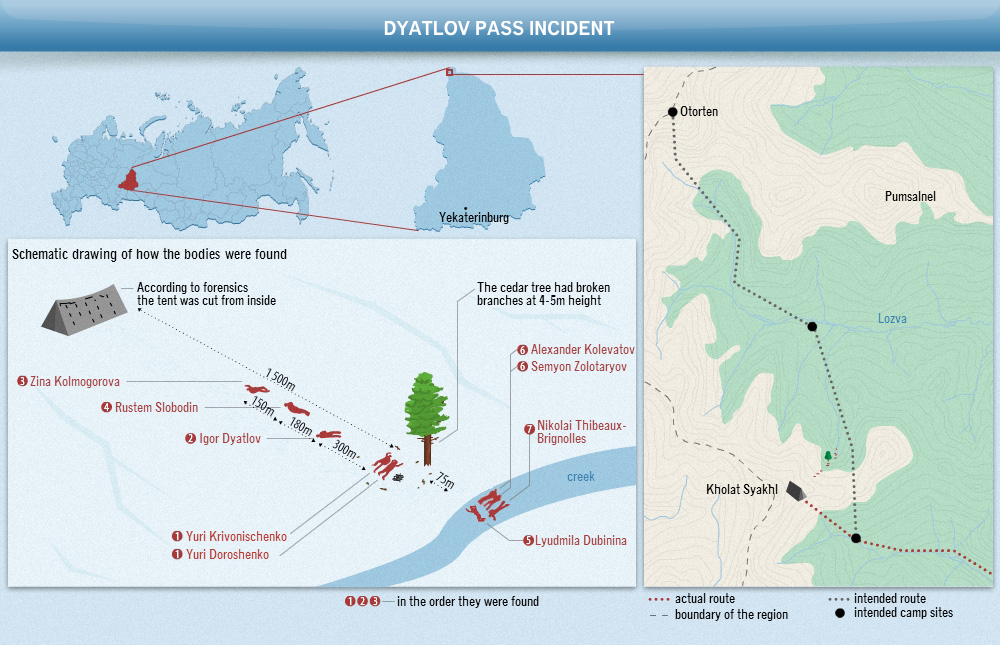
We are currently adding information to the Google map and that's why all layers show. You can uncluttered your view by selecting and deselecting the layers from the icon to the left.
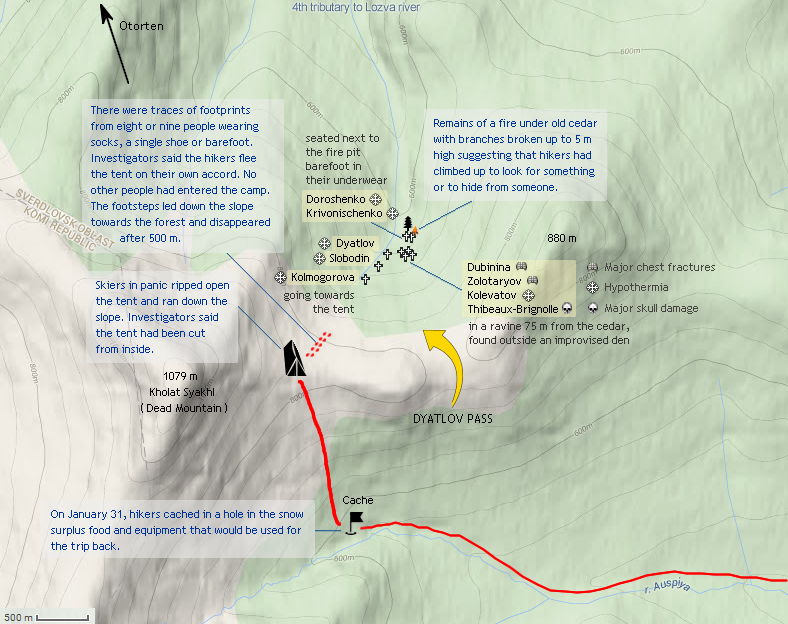
| Name (Age) | Found | Clothing (taken in, taken out) |
Injuries & cause of death |
| Doroshenko (21) | under tree | Underwear, shirt, no shoes; Kolevatov was wearing his overalls; Igor was wearing a fur sleeveless vest which the case files say Yudin left to Kolevatov, but Yudin himself said in 2008 he gave to Doroshenko, read more. |  Hypothermia Hypothermia |
| Krivonischenko (23) | under tree | Underwear, shirt, no shoes; Dubinina had a sweater that tested radioactive which could probably be his, according to Ivanov she tore a flap of his underpants to wrap her foot probably after his death, but this turn out to be her own blouse (read more); Thibeaux was wearing his wrist watch and possibly a sweater taken from him. |  Hypothermia Hypothermia |
| Dyatlov (23) | 300m | Very lightly dressed, no shoes, he was wearing the knitted vest Yudin said in the case files he left to Kolevatov, but later said he gave to Doroshenko, both version exist. | Hypothermia |
| Kolmogorova (22) | 630m | Better dressed than the previously found hikers. No footwear. |  Hypothermia Hypothermia |
| Slobodin (23) | 480m | Better dressed than the previously found hikers, one felt boot (valenka) on his right foot. |  Hypothermia HypothermiaFractured skull, multiple areas of edema and abrasions on his face and his arms |
| Dubinina (20) | ravine (75m) | Her foot was wrapped in a piece of Krivonishenko's underpants according to Ivanov, but it turns out to be a piece from her own blouse (read more); she was wearing a brown sweater that tested radioactive and was most probably Krivonischenko's, but identification of the items on the last 4 bodies found in May was never made; Thibeaux is wearing her hat and coat, pair of gloves crumpled in the right pocket. |
 Major chest fractures; missing tongue, eyes, part of the lips, as well as facial tissue and a fragment of skull bone. Major chest fractures; missing tongue, eyes, part of the lips, as well as facial tissue and a fragment of skull bone. |
| Zolotaryov (38) | ravine (75m) | He was wearing Dubinina's faux fur coat and hat according to Ivanov and this turn out not to be true (read more); Zolotaryov has Doroshenko's hat; camera on his neck, pair of quilted soft wadded boots without soles (burki) on his feet. Zolotaryov and Thibeaux were almost fully clothed and wearing some kind of footwear. | |
| Kolevatov (24) | ravine (75m) | He is wearing Doroshenko's overalls; the waistband of his sweater and lower part of his ski trousers tested radioactive. |
 Hypothermia; exposed skull bones Hypothermia; exposed skull bones |
| Thibeaux-Brignolle (23) | ravine (75m) | Thibeaux like Zolotaryov was better dressed than the rest of the members of the group. On his feet he wore hand-knitted woolen socks and a pair of felt boots (valenki). He has Krivonischenko's wrist watch, possibly one of the sweaters is Krivonischenko's too, Lyuda's hat and coat. In the right pocket are crumpled pair of gloves that must be Lyuda's. |
 Major skull damage - multiple fractures to the side of his skull that would have made him unable to move Major skull damage - multiple fractures to the side of his skull that would have made him unable to move |
 |
Autopsy reports |
| The radiation on two sweaters and pants was substantial |
Timeline
1959
| Jan 23 | The group (10) takes train №45 from Sverdlovsk to the city of Serov. In the diary it says train №43 but there is no such train. |
| Jan 24 | The group (10) arrives at Serov in the morning where Krivonischenko was detained for soliciting and singing out loud, and released, and a drunk accuses them of having stolen his vodka. |
| Jan 25 | The group (10) arrives by train №81 in Ivdel and takes a bus GAZ-51 to Vizhay |
| Jan 26 | A truck GAZ-63 takes the group to a logging community called District 41 (aka 41st district or quarter) |
| Jan 27 | The group hires a sled for 24 km to North-2 mining settlement (abandoned) |
| Jan 28 | Yuri Yudin goes back with the sled due to poor health (sciatica), the group now consist of 9 members they spend the night on the banks of Lozva river |
| Jan 29 | The group on skis makes their way from Lozva to Auspiya river where they spend the night |
| Jan 30 | The group pitches their tent on the banks of Auspiya river |
| Jan 31 | The group tries to ascend the shortest way from Auspiya to Lozva river (now called Dyatlov pass) and goes back to spends the night on the banks of Auspiya river |
| Feb 1 | The group makes the cache (labaz) to lighten their backpacks, they start late, go 500m off their planned route, cover 2 km and pitch their tent on the north slope of Kholat Syakhl |
| Feb 2 | All members of Dyatlov group die in a mysterious way |
| Feb 12 | The group was expected back in Vizhay |
| Feb 21 | Search parties are on their way |
| Feb 26 | Slobtsov and Sharavin find the tent Prosecutor Vasiliy Tempalov opens an official investigation |
| Feb 27 | Bodies of Doroshenko, Krivonischenko (by Sharavin and Koptelov), Dyatlov (mansi Kurikov group) and Kolmogorova (by Moiseev rescue dog) are found |
| Mar 2 | The cache (labaz) is found by Slobtsov and Kurikov |
| Mar 4 | Autopsy of Doroshenko, Krivonischenko, Dyatlov and Kolmogorova |
| Mar 5 | Body of Slobodin is found by Karelin and soldiers from Lt. Potapov group. Akselrod notices the icy bed under the body. |
| Mar 8 | Autopsy of Slobodin |
| Mar 9 | Doroshenko and Kolmogorova are buried in Mihaylovskoe cemetery Krivonischenko is buried in Ivanovskoe Cemetery |
| Mar 10 | Dyatlov and Slobodin are buried in Mihaylovskoe cemetery |
| Mar 17 | Vladimir Korotaev is fired and Lev Ivanov is assigned as a lead investigator |
| April | |
| May 5 | Den and bodies of Dubinina, Kolevatov, Thibeaux-Brignolle and Zolotaryov are found (by Askinadzi) |
| May 9 | Autopsy of Dubinina, Kolevatov and Thibeaux-Brignolle and Zolotaryov |
| May 11 | Dubinina and Kolevatov are laid to rest in Mihaylovskoe cemetery. Zolotaryov is laid to rest in Ivanovskoe cemetery. |
| May 12 | Thibeaux-Brignolle is laid to rest in Mihaylovskoe cemetery. |
| May 27 | Radiation analysis report on clothes and tissues of Dubinina, Kolevatov, Thibeaux-Brignolle and Zolotaryov |
| May 28 | Case closed |
Official statement for closing the case given by Junior Counselor of Justice and Criminal Prosecutor of Sverdlovsk region, Lev Ivanov:
The deaths of the expedition members were due to a series of mistakes by Dyatlov. On 1 February he began the ascent to the summit at 3 PM, even though he knew about the difficulty of the terrain. Furthermore – and this was Dyatlov’s next mistake – he chose a line 500 m to the left of the planned pass that lies between Peak 1079 and Peak 880. So the group found themselves on the eastern slope of Peak 1079. They used what was left of the daylight to ascend to the summit in strong winds (which are typical for this area) and low temperatures of minus 25 degrees centigrade. Dyatlov found himself in bad conditions for the night, so he decided to pitch his tent on the slope of 1079 so as to start in the morning without adding the distance from the forest (~1 km) to the remaining trek of about 10 km to the summit.
Considering the absence of external injuries to the bodies or signs of a fight, the presence of all the valuables of the group, and also taking into account the conclusion of the medical examinations for the causes of the deaths of the hikers, it is concluded that the cause of their demise was overwhelming force, which the hikers were not able to overcome.
2018
| Apr 12 | Exhumation of the body of Semyon Zolotaryov at Ivanovskoe Cemetery in Yekaterinburg |
| May 16 | Russian Channel 1 airs DNA results of the remains of the exhumed body from Zolotaryov's grave not to have kinship with niece Tatyana Skulbeda (daughter of Semyon's sister) |
| Jul 16 | Second DNA testing at the Russian Center of Forensic Expertise of the Ministry of Health of the Russian Federation of the person buried under the sign "Semyon Zolotaryov" matches the DNA of Tatyana Skulbeda (daughter of Semyon's sister) |
| Aug 31 | Court’s decision from 8/31/2018 to refuse the application to reopen the case Court Decision Letter |
| Sep | Prosecutor's office of the Sverdlovsk region initiated a new investigation. |
2019
| Mar 15 | Prosecutor's office undergo expedition to Dyatlov Pass to test 3 theories - avalanche, snow slab and hurricane. |
2020
| Jan 22 | Yury Chaika was fired. New Prosecutor General of Russia is appointed Igor Krasnov. |
| Jul 11 | Andrey Kuryakov announces the conclusion of the new investigation - it was an avalanche. |
| Aug 10 | Krasnov reprimanded Kuryakov. The investigation was warned of incomplete official compliance. This is the maximum possible punishment before dismissal. |
Autopsy reports, proceed with caution - real crime scene photos »
Many theories have arisen about the event »


